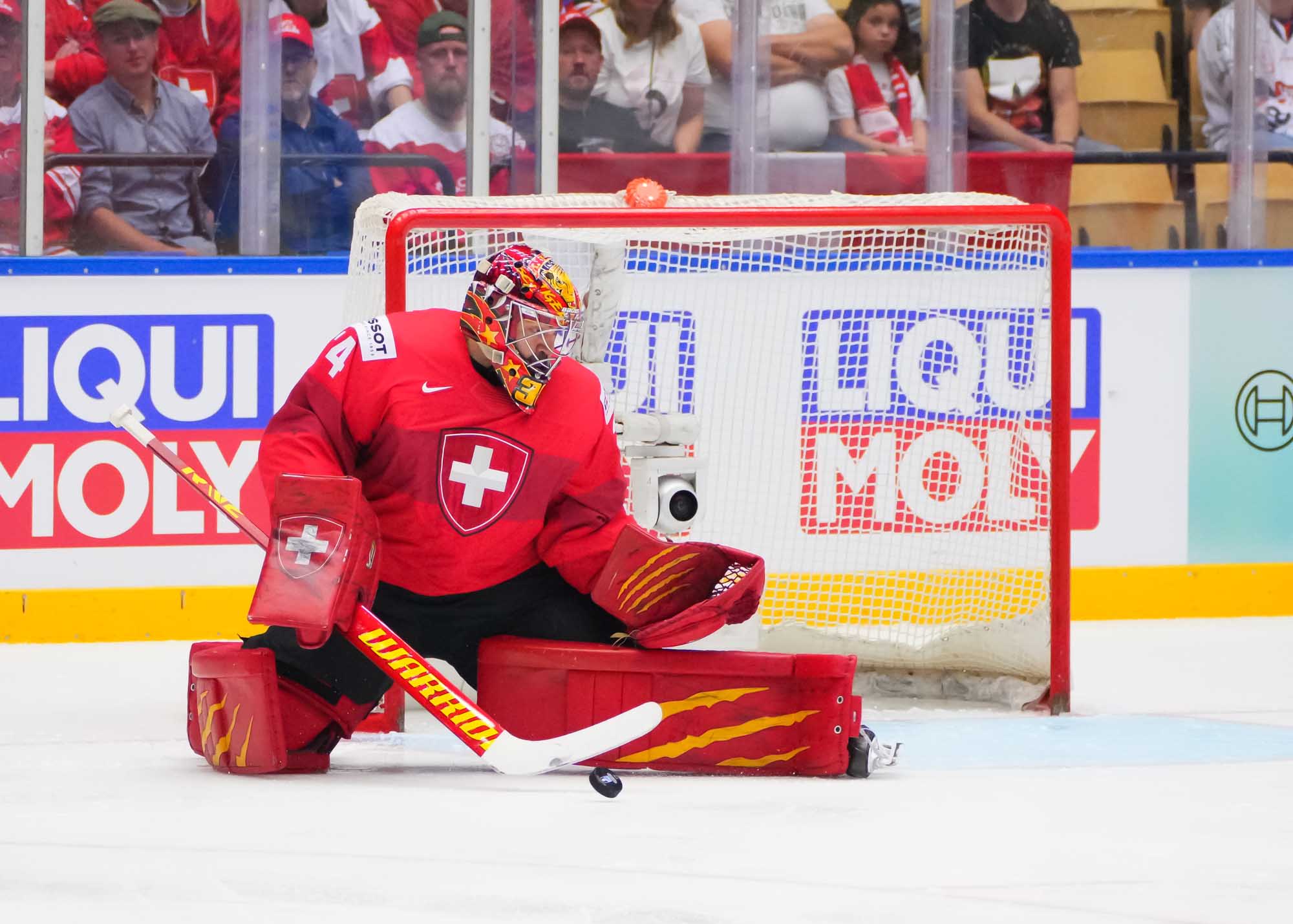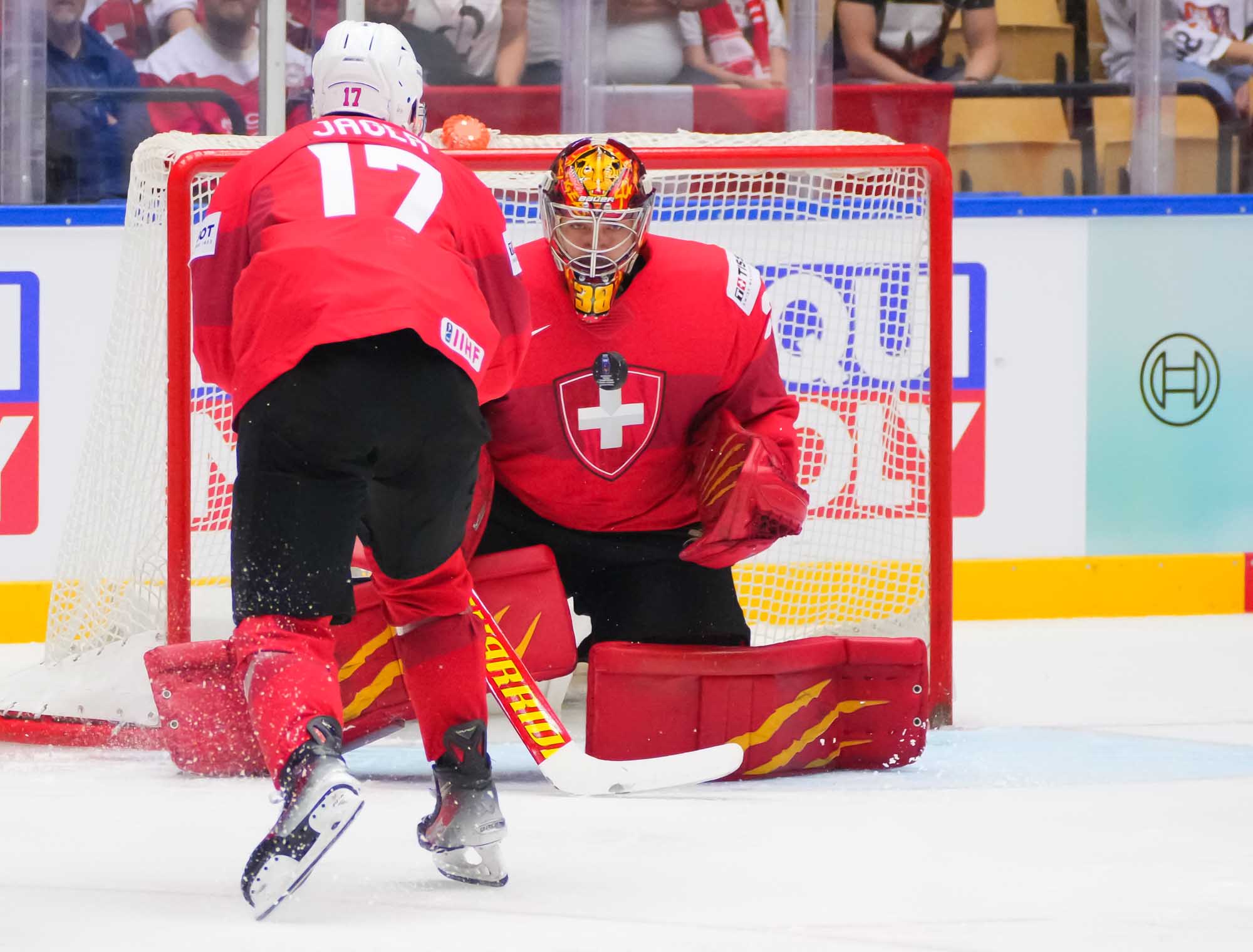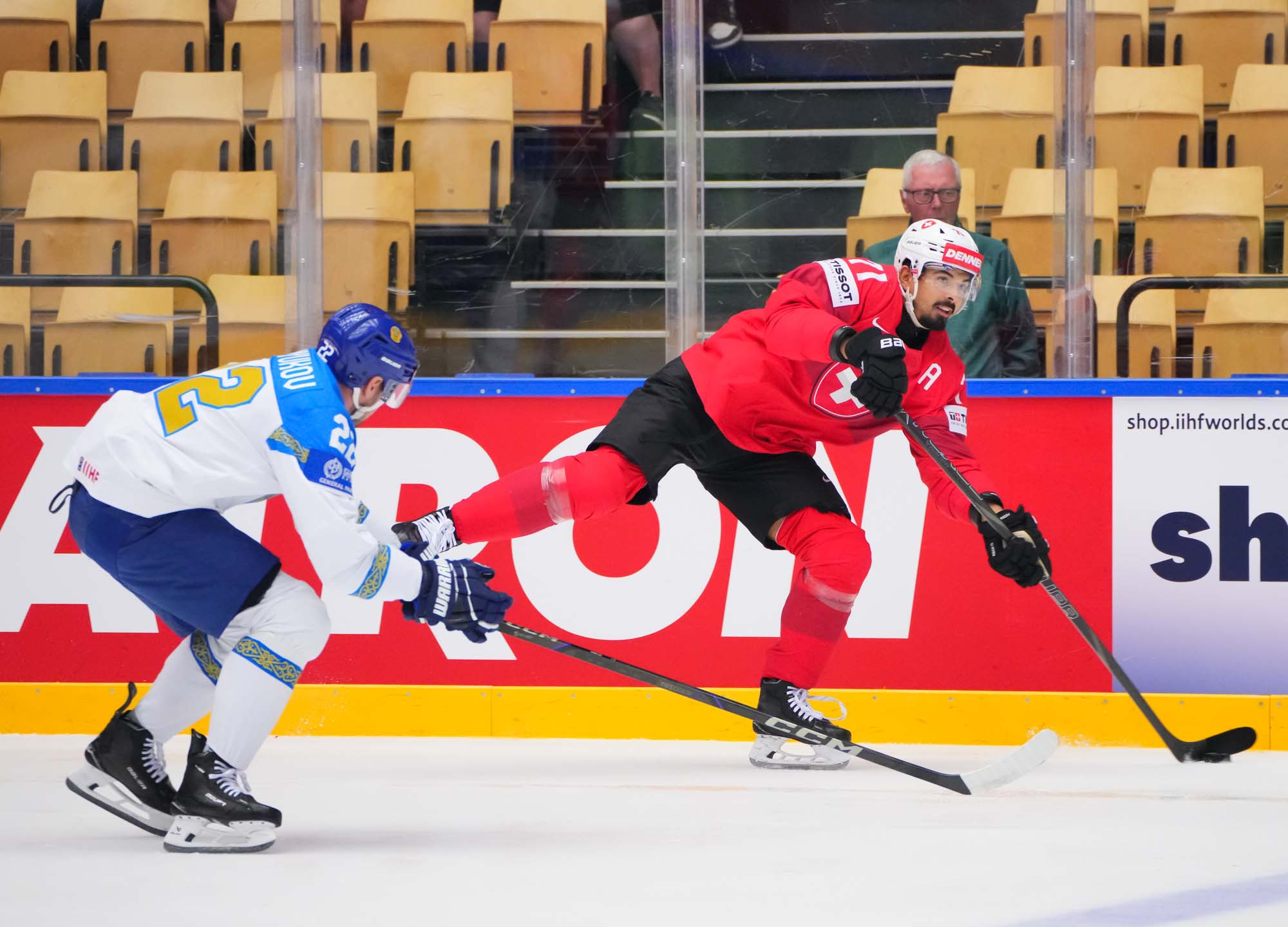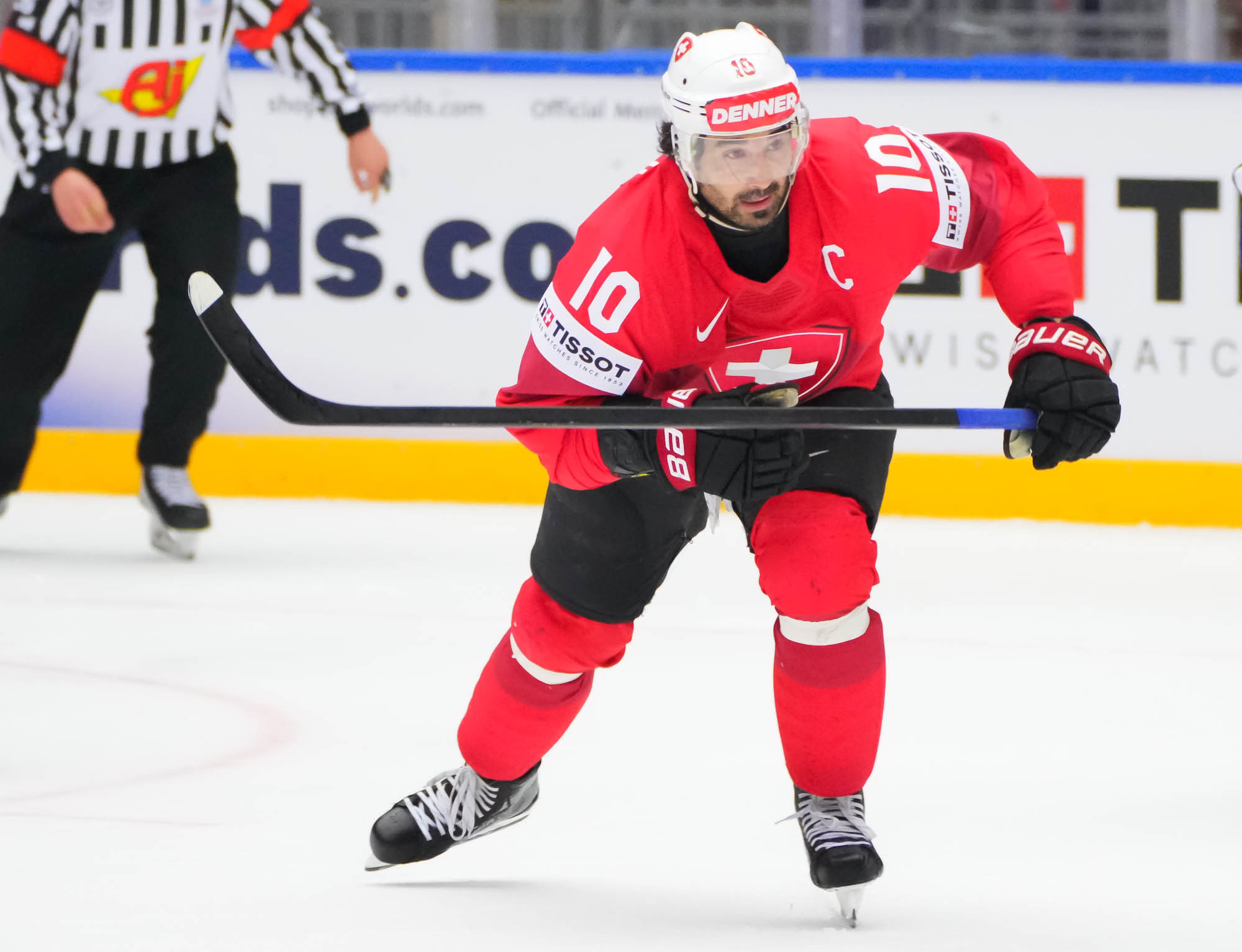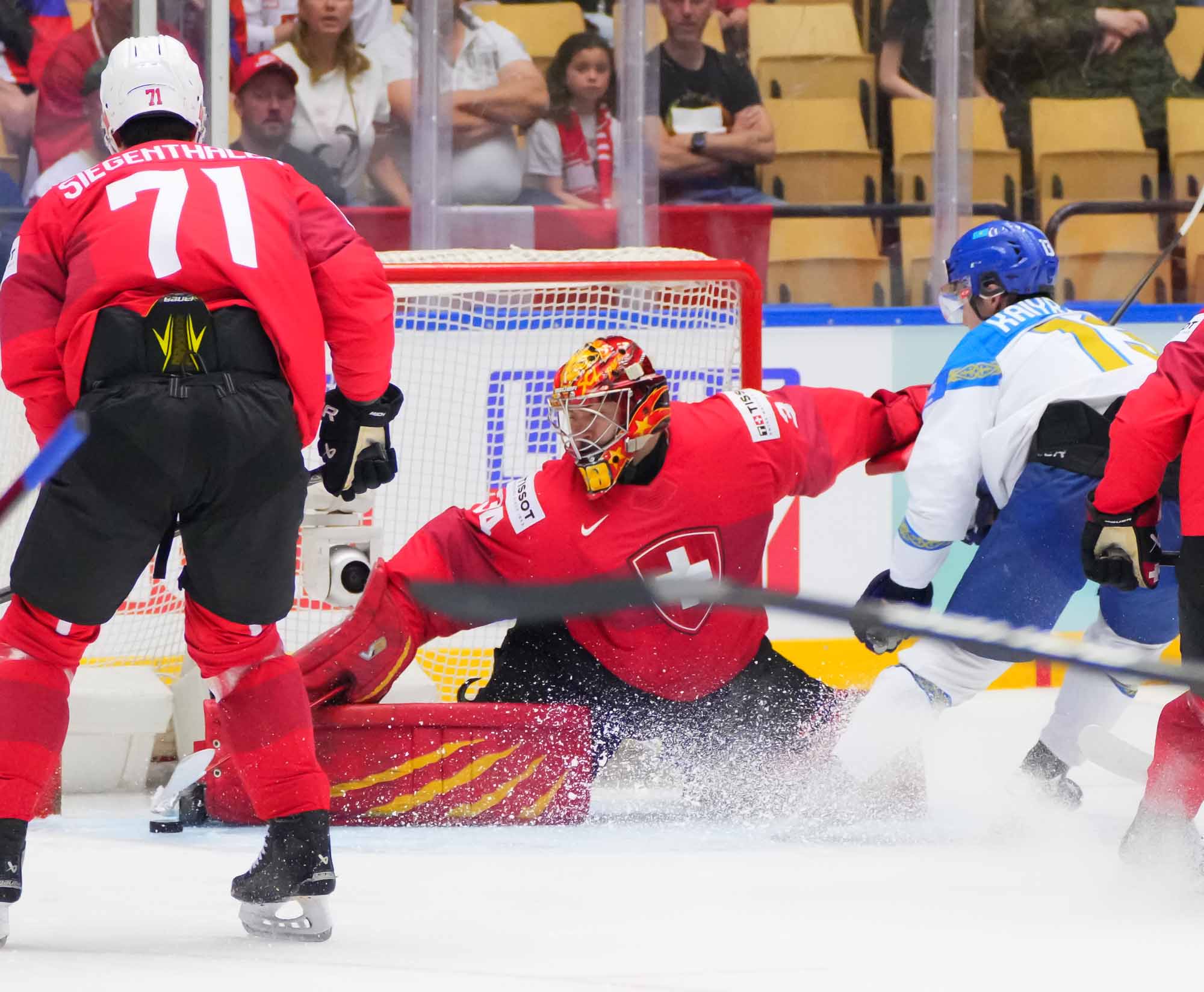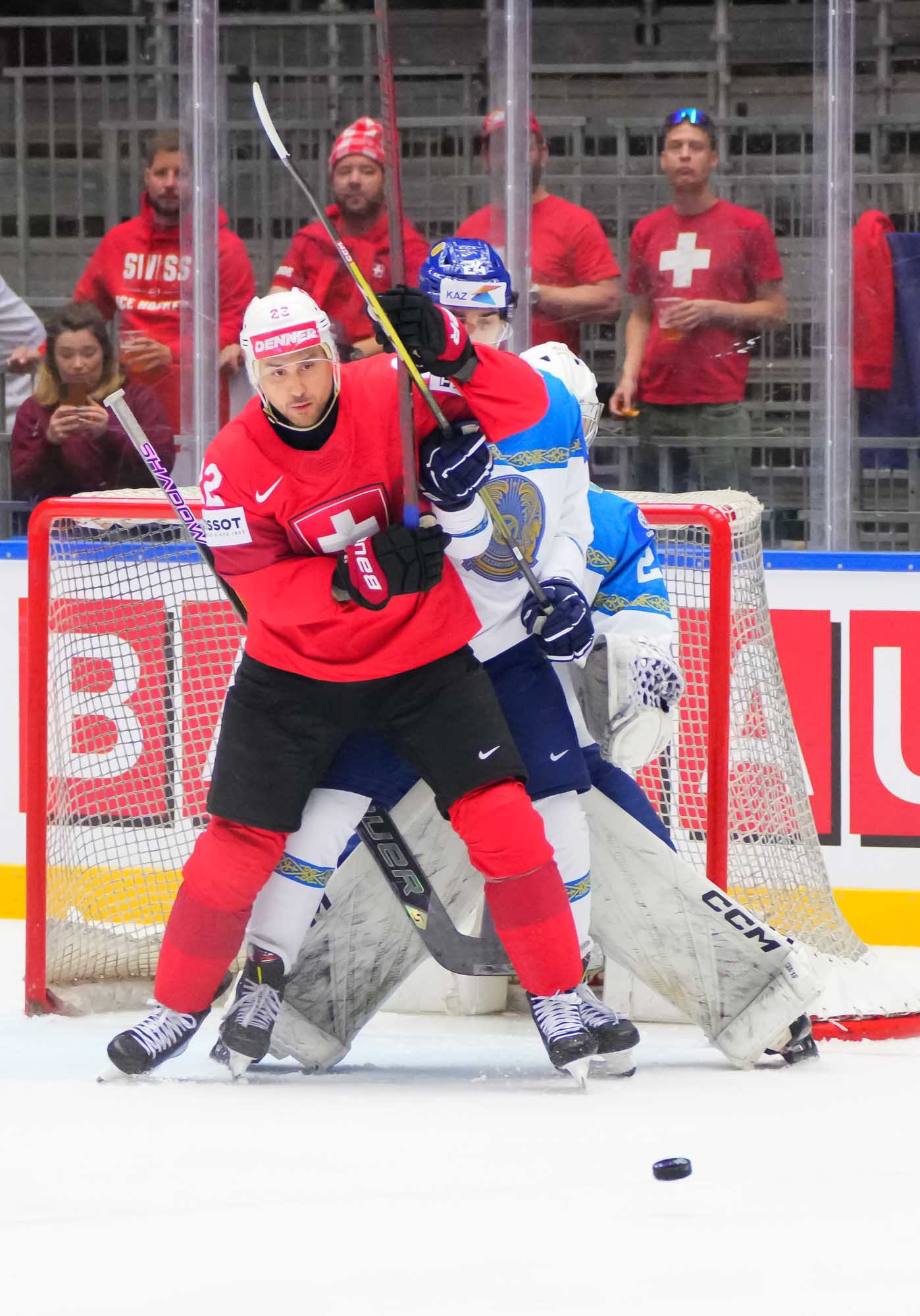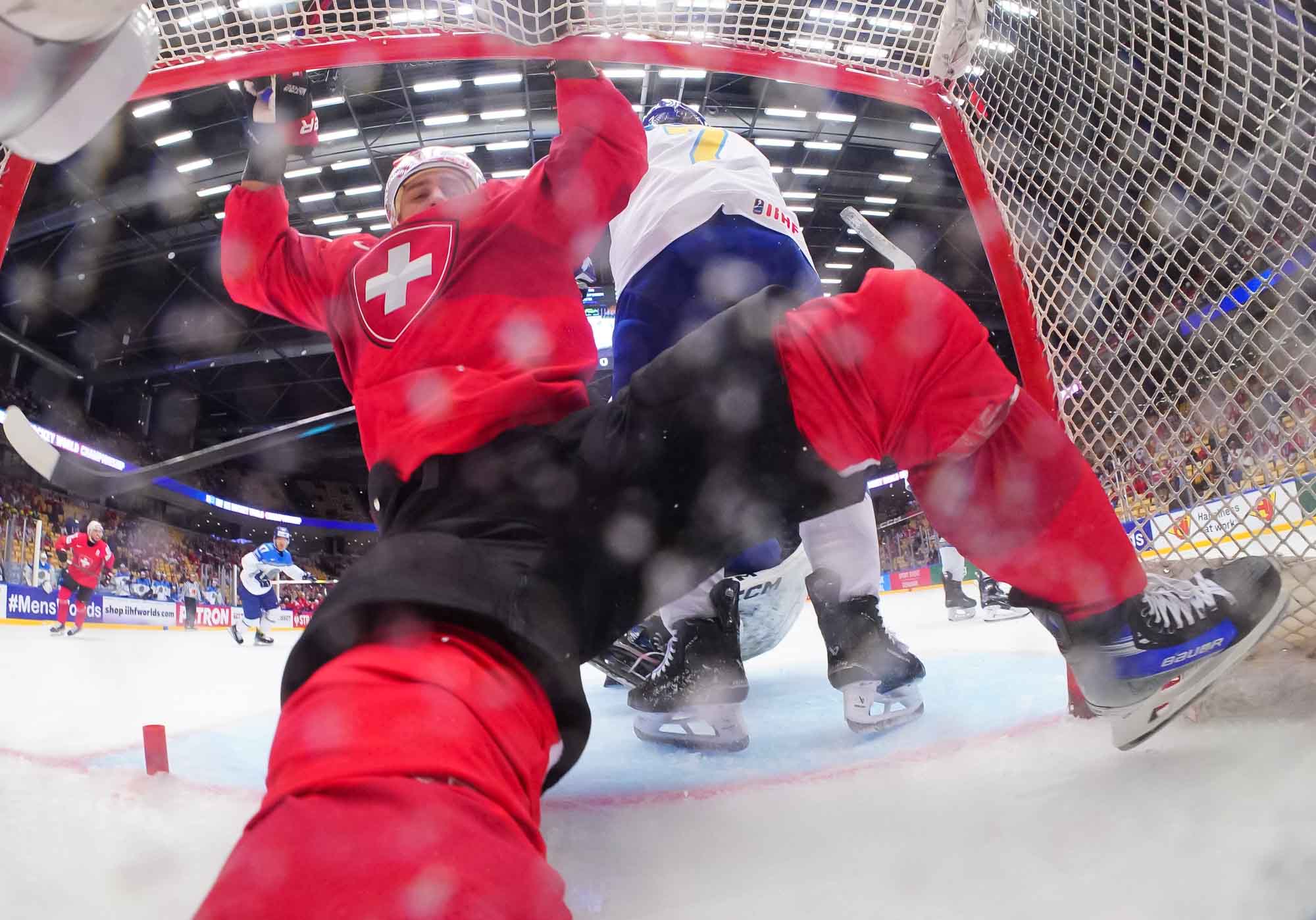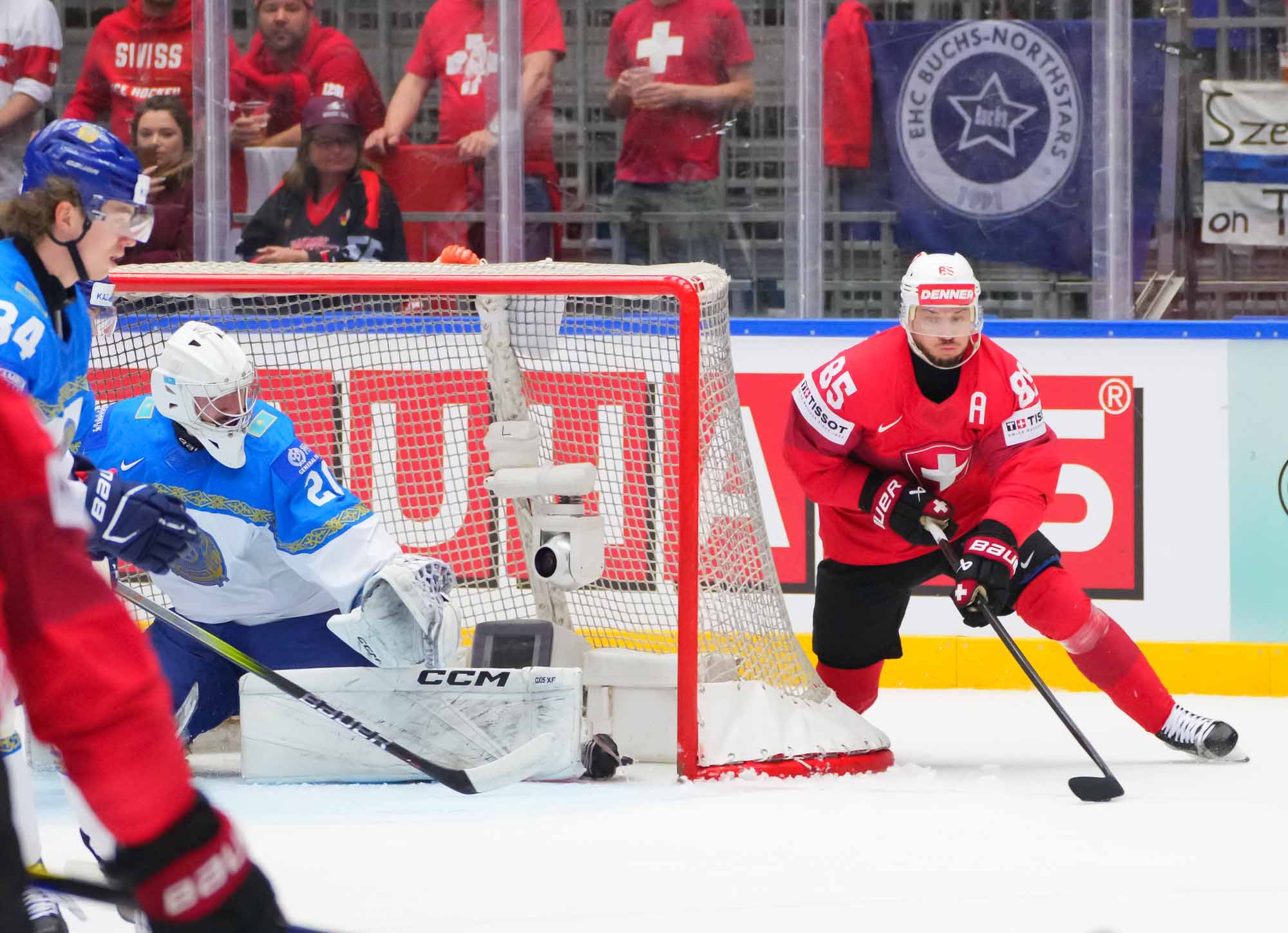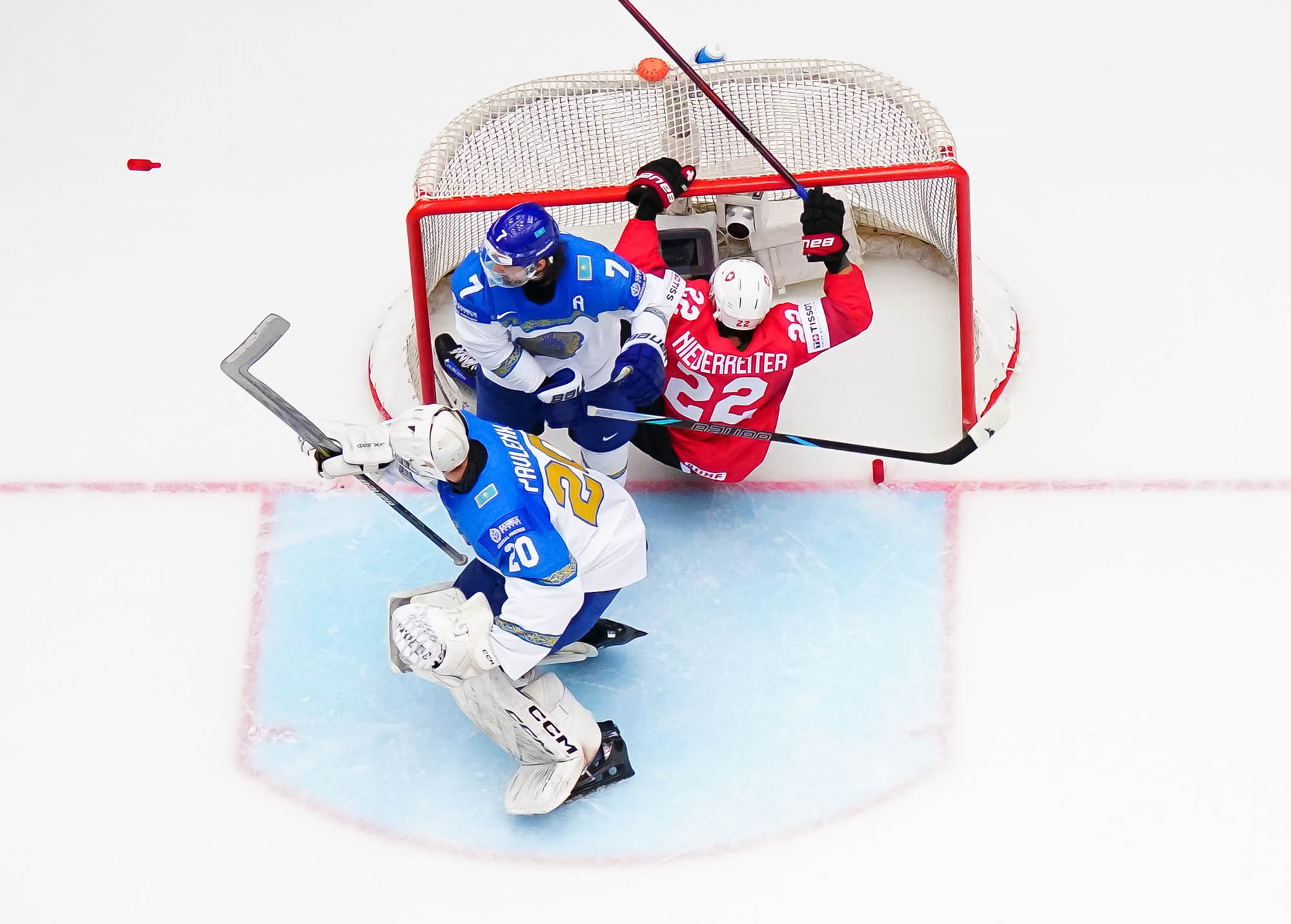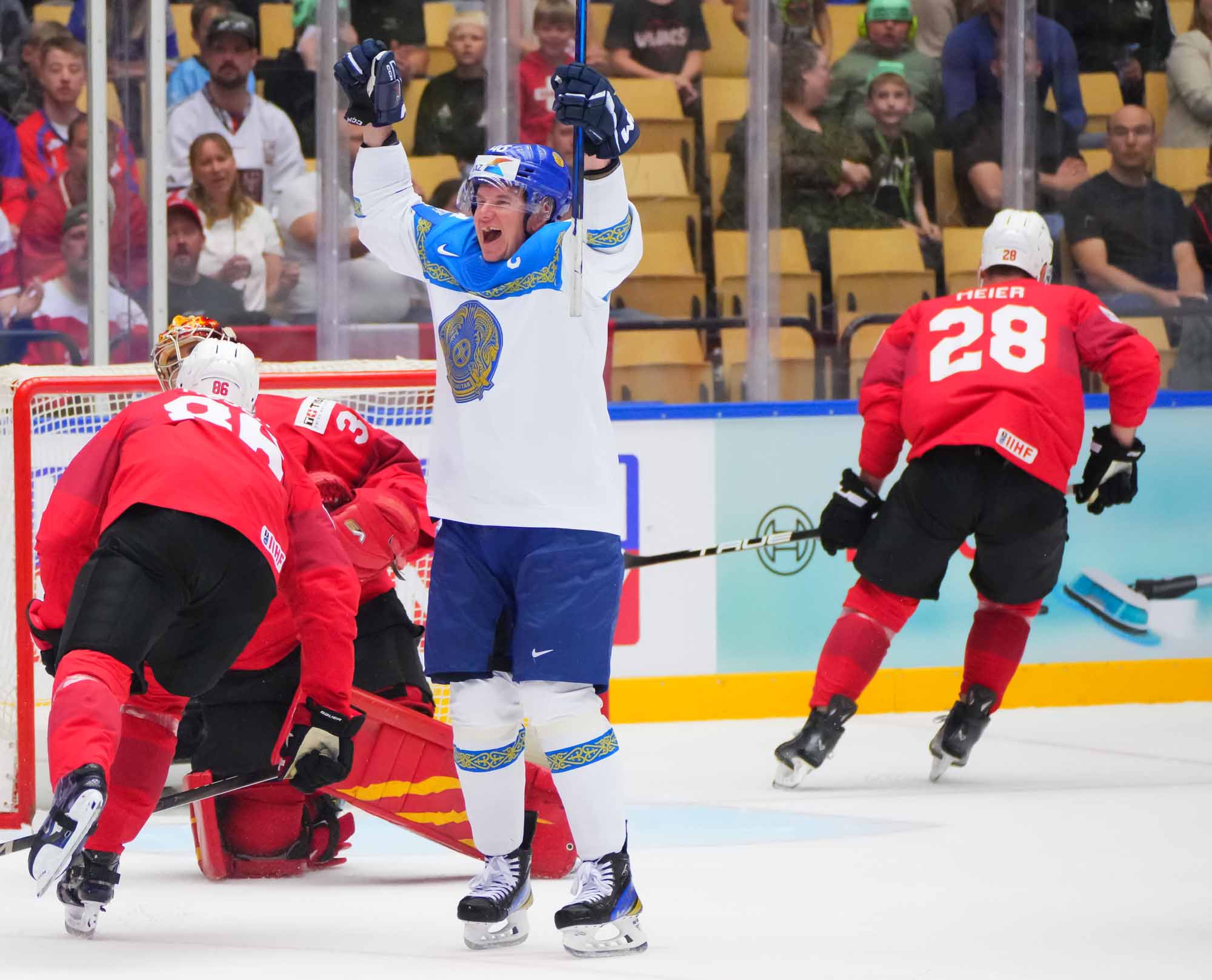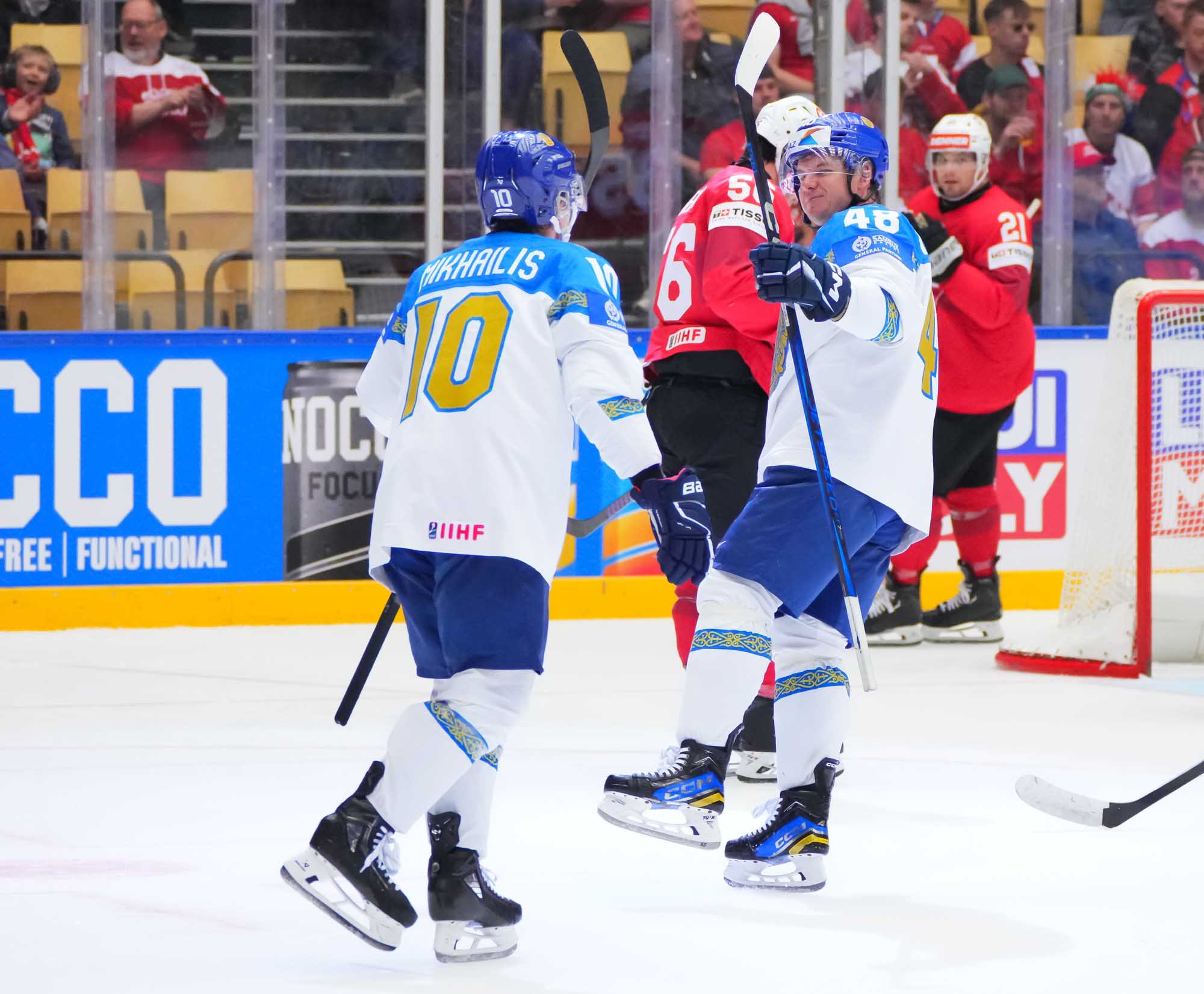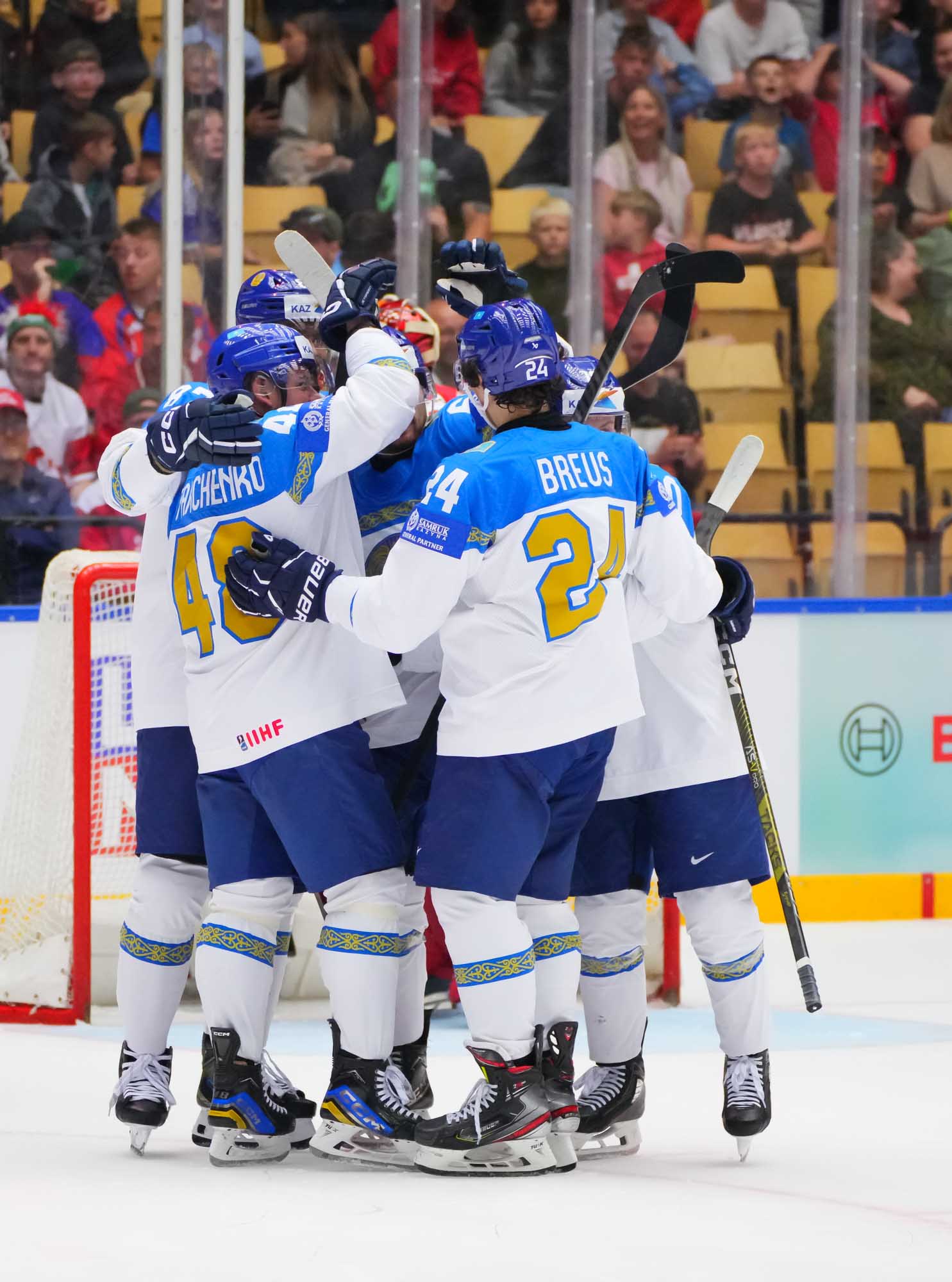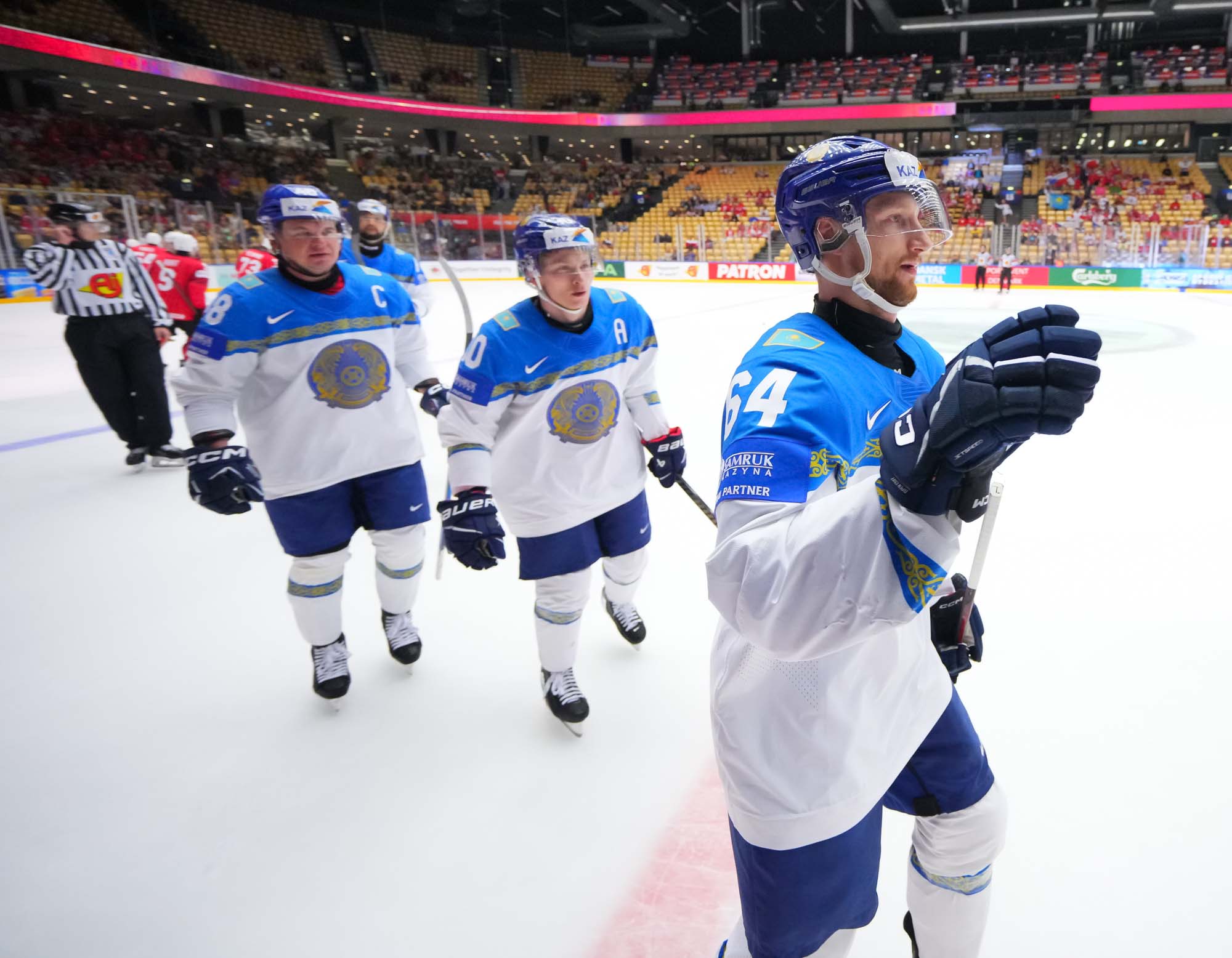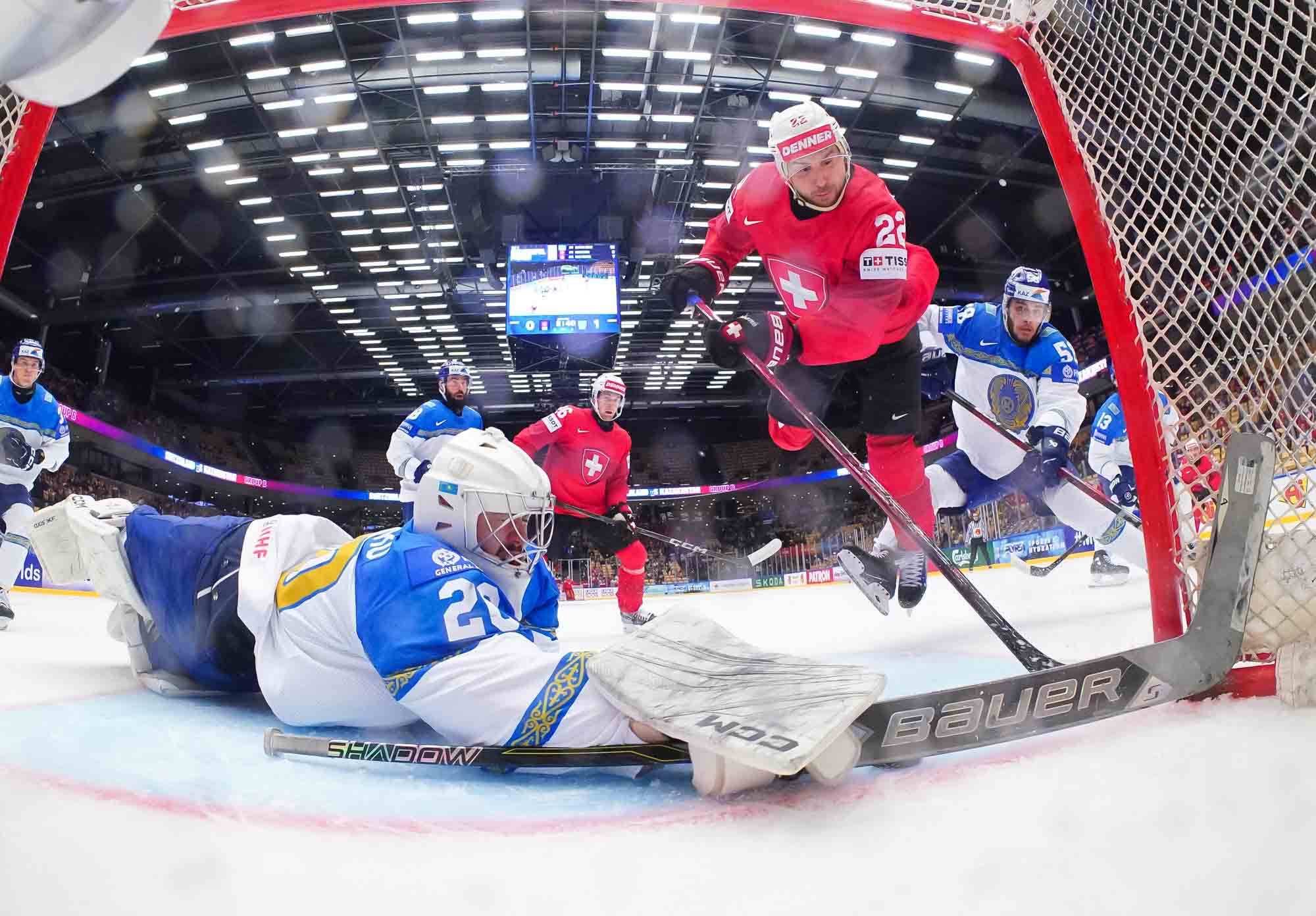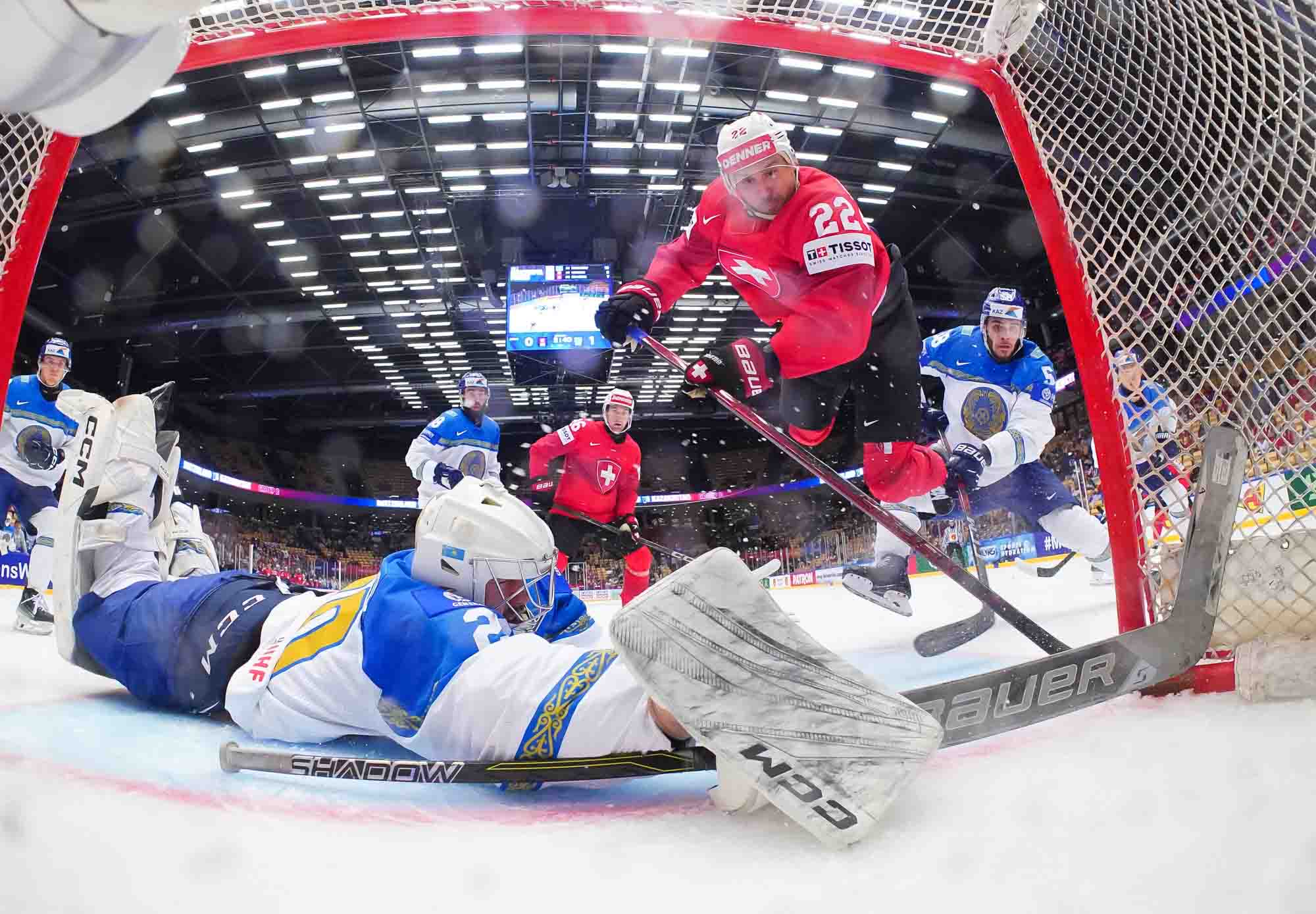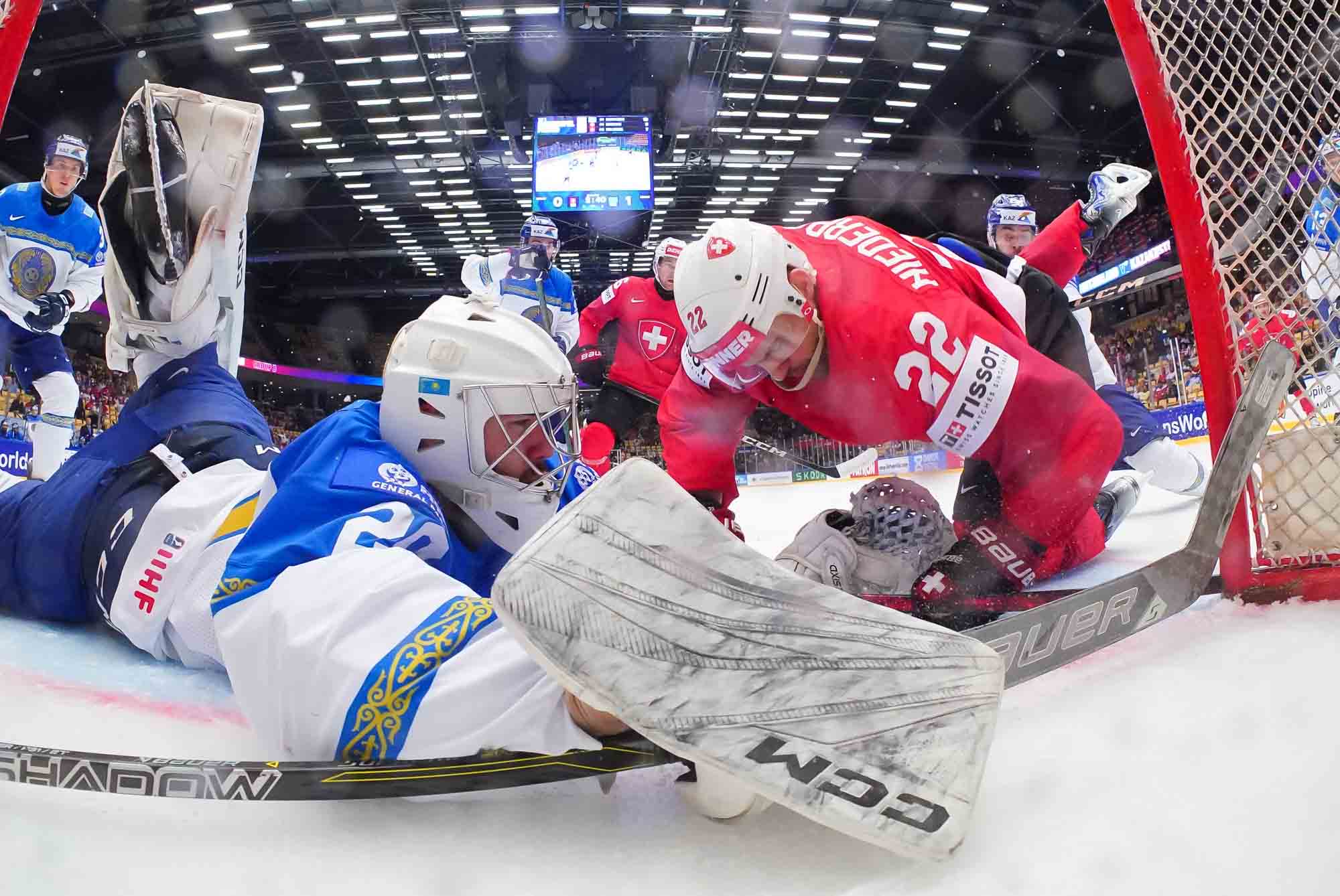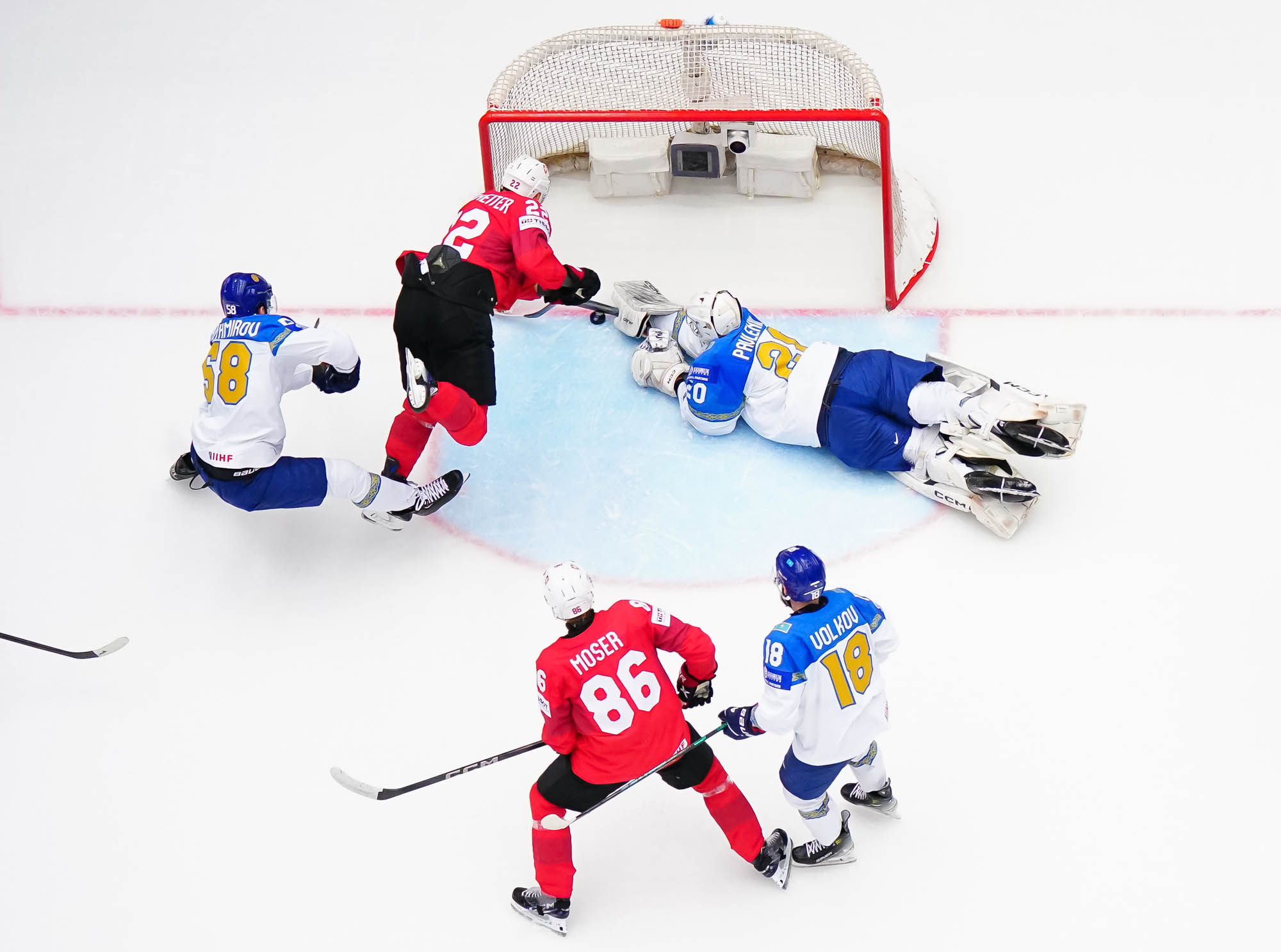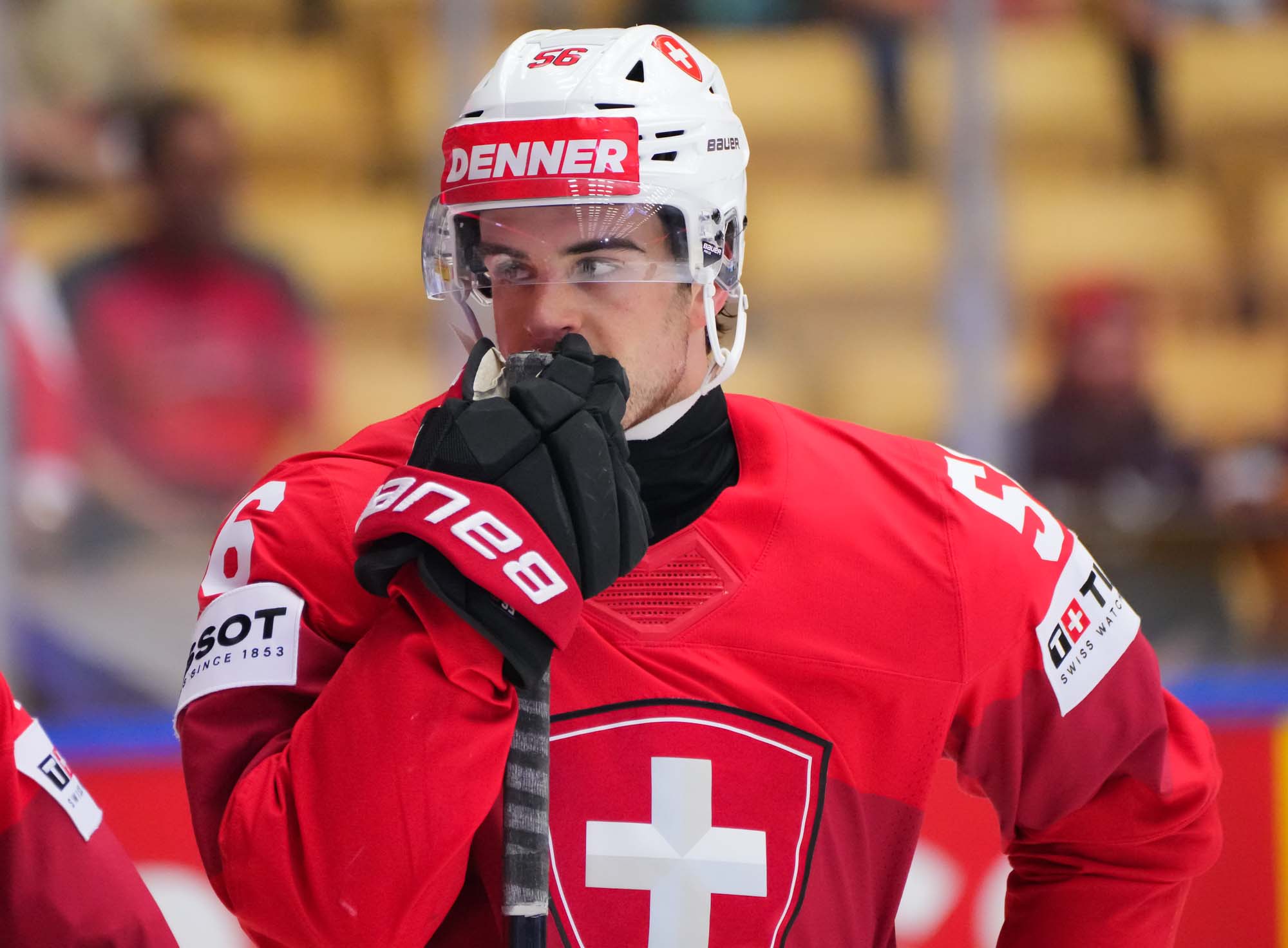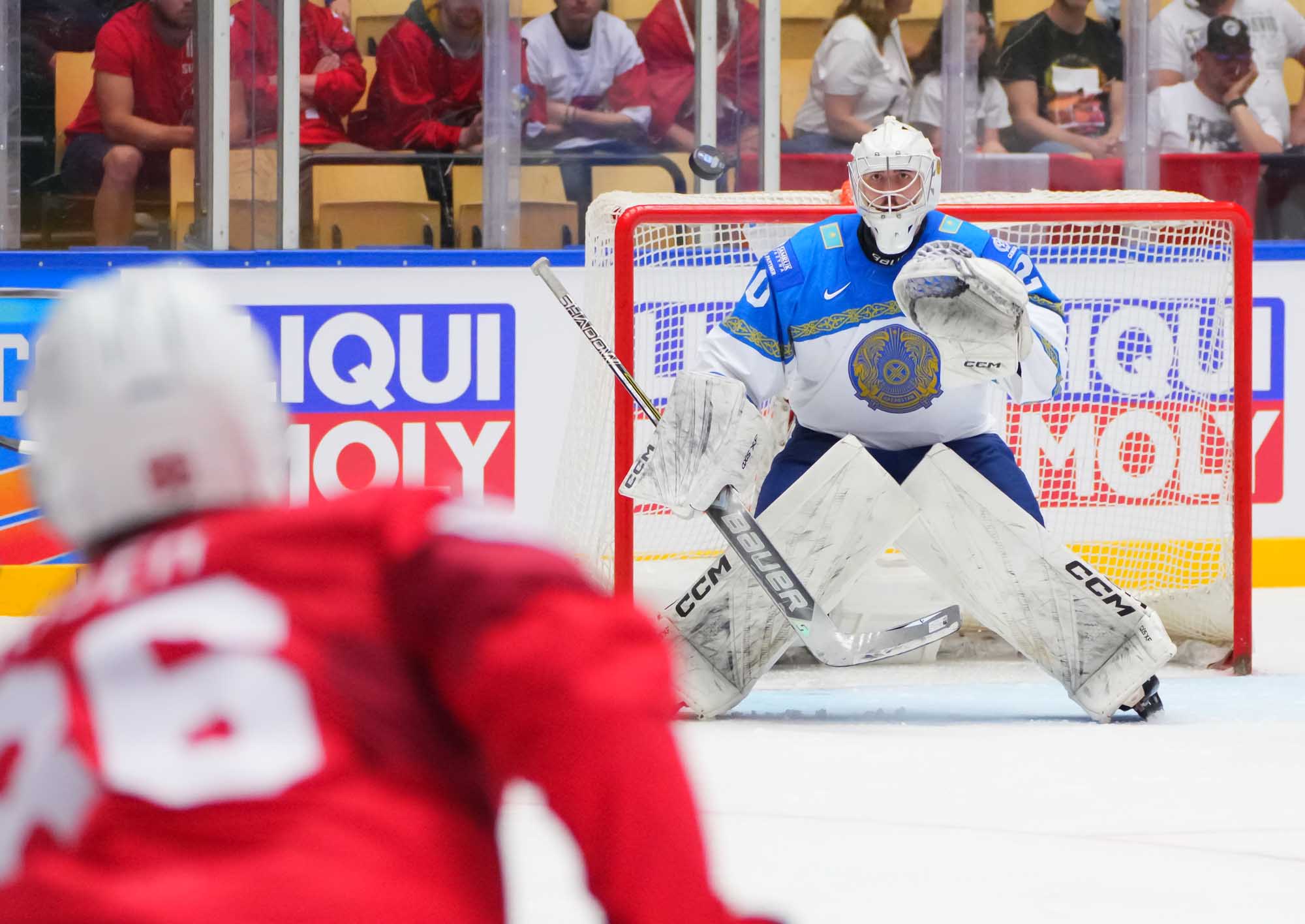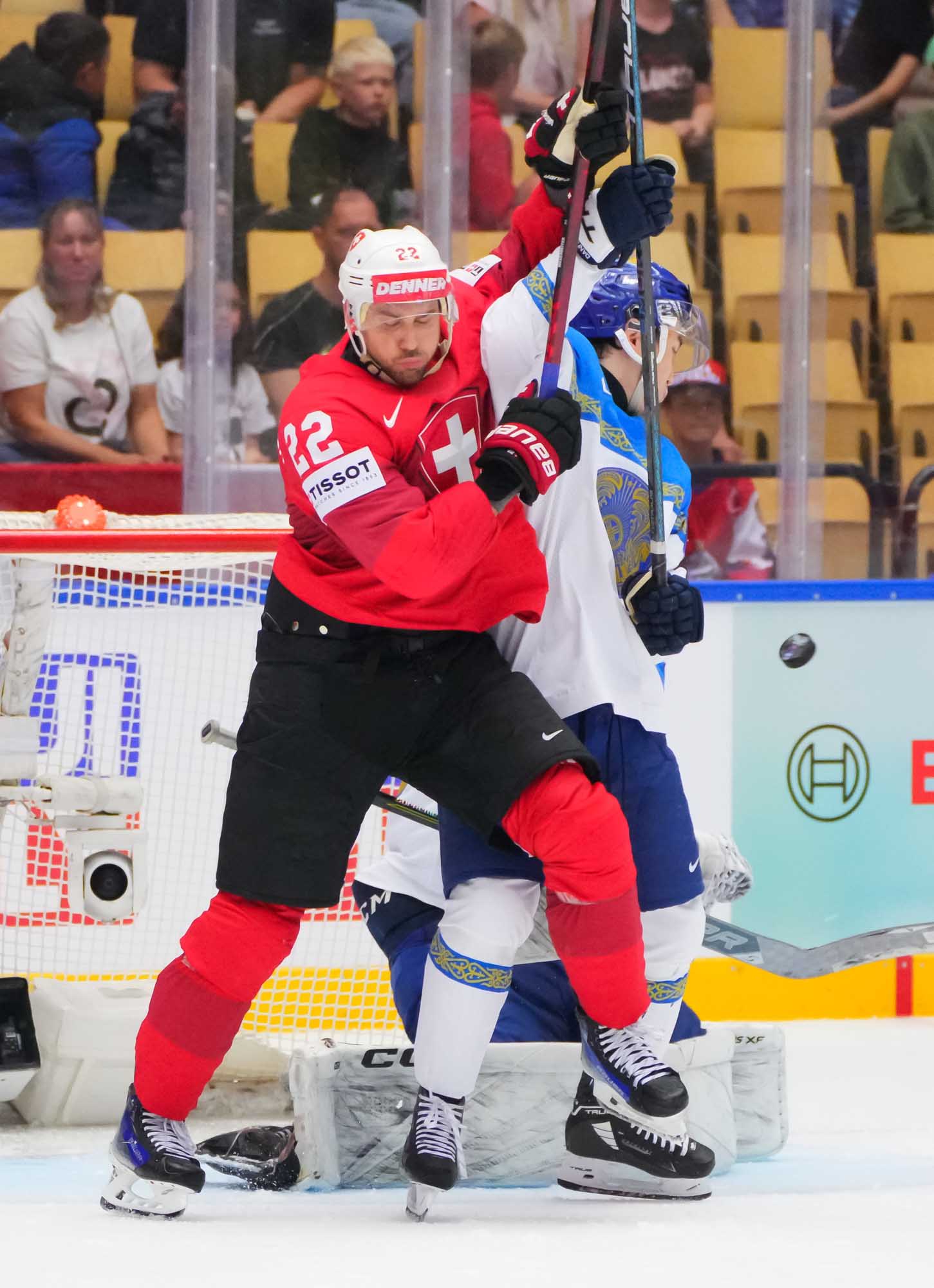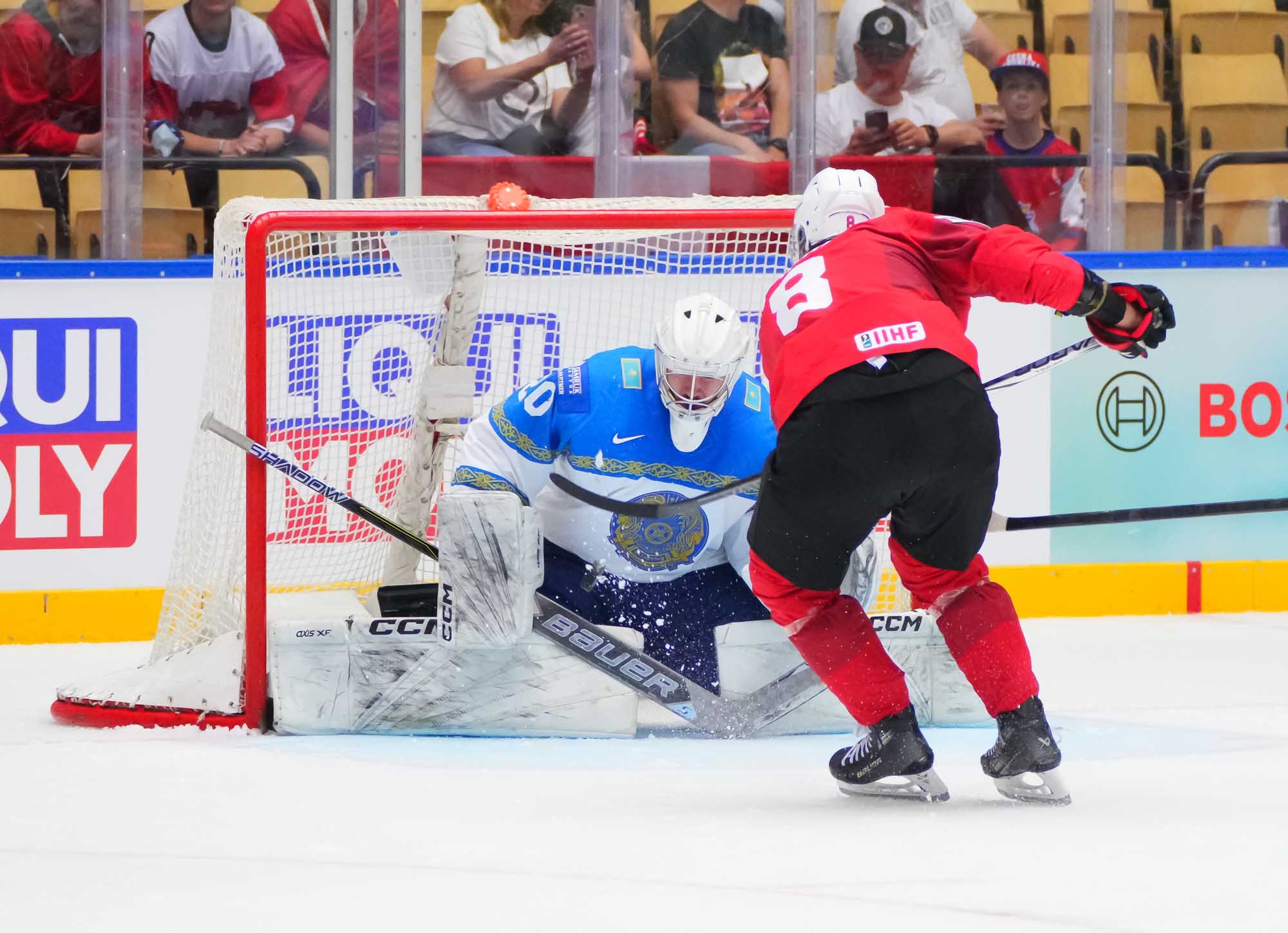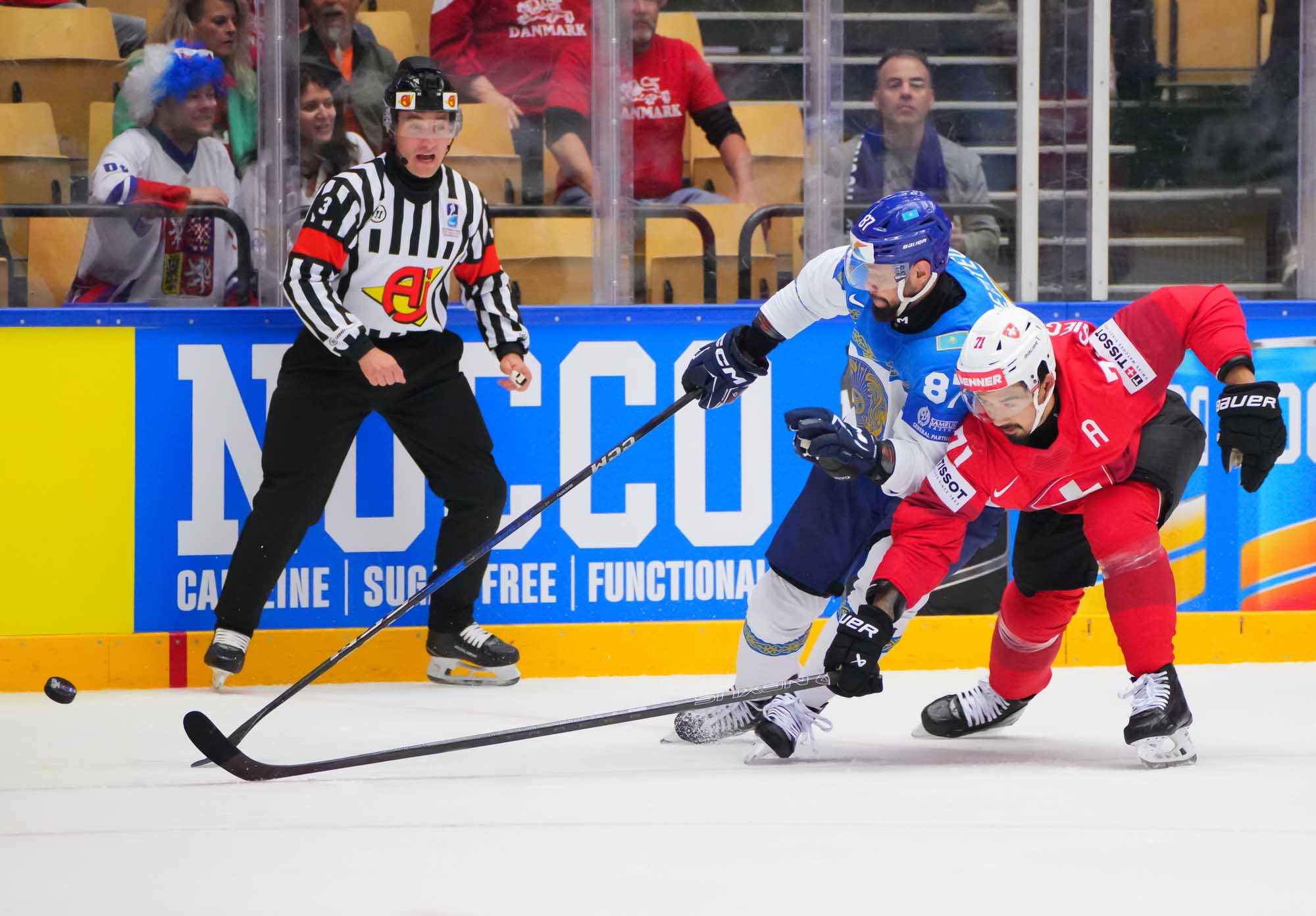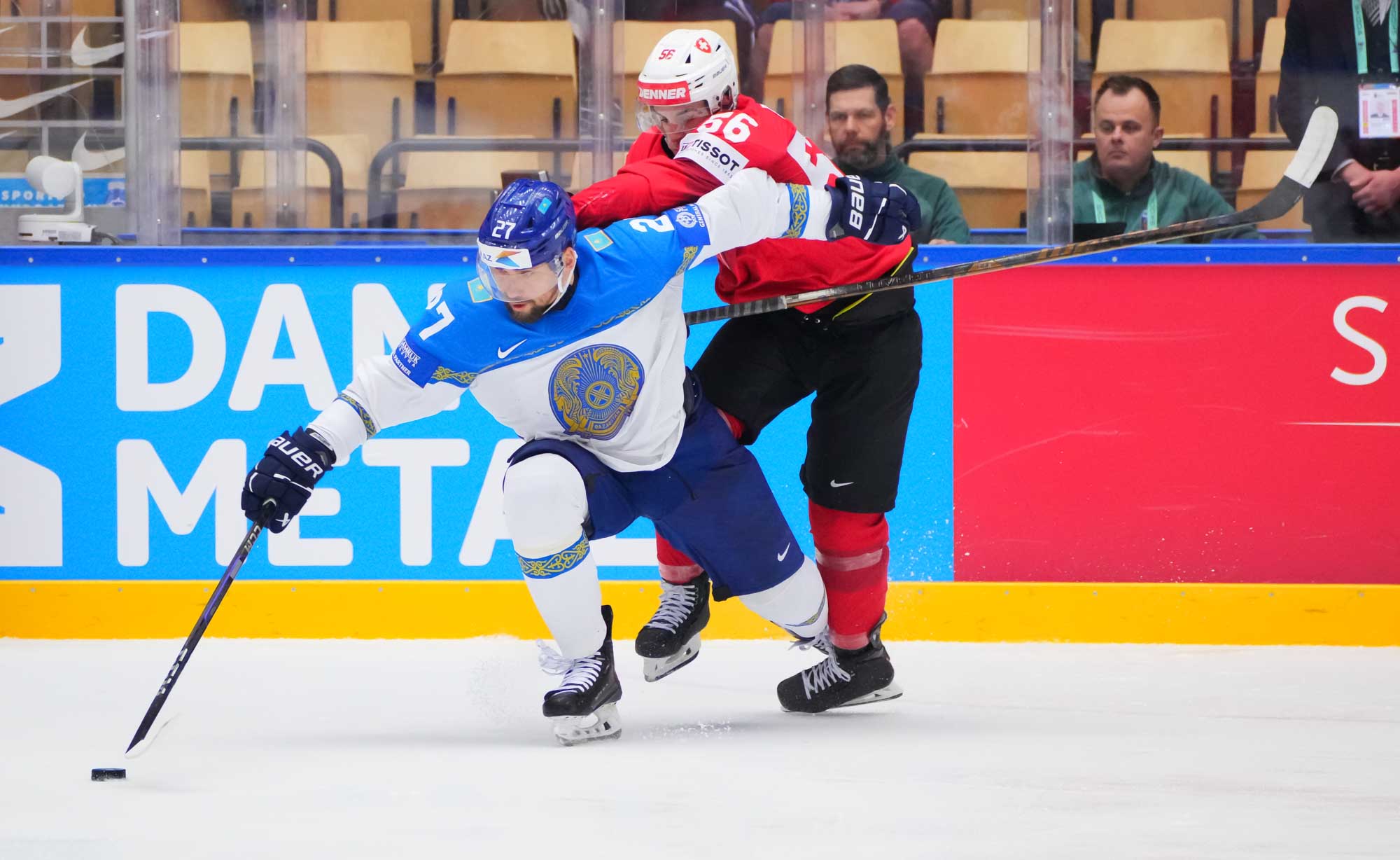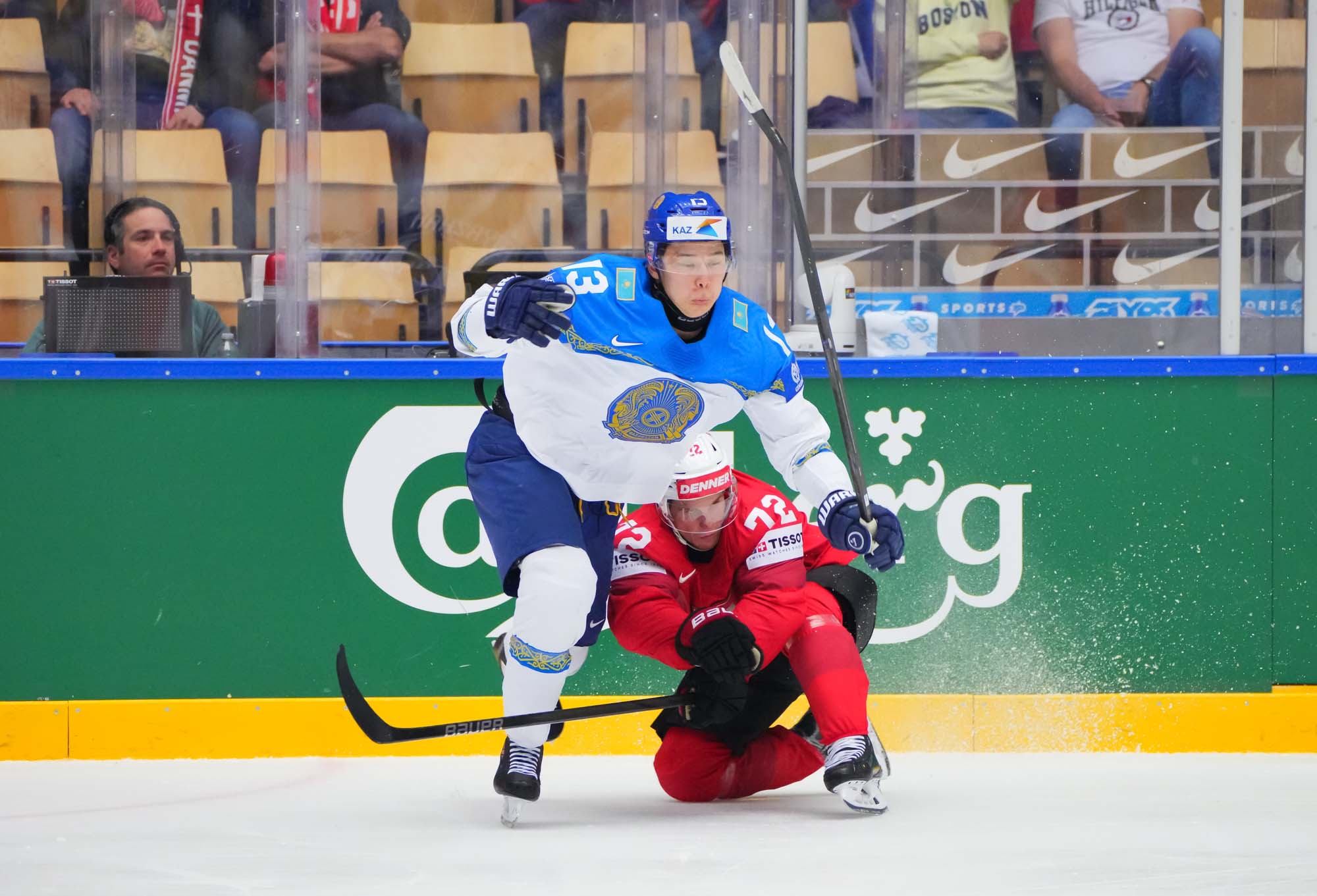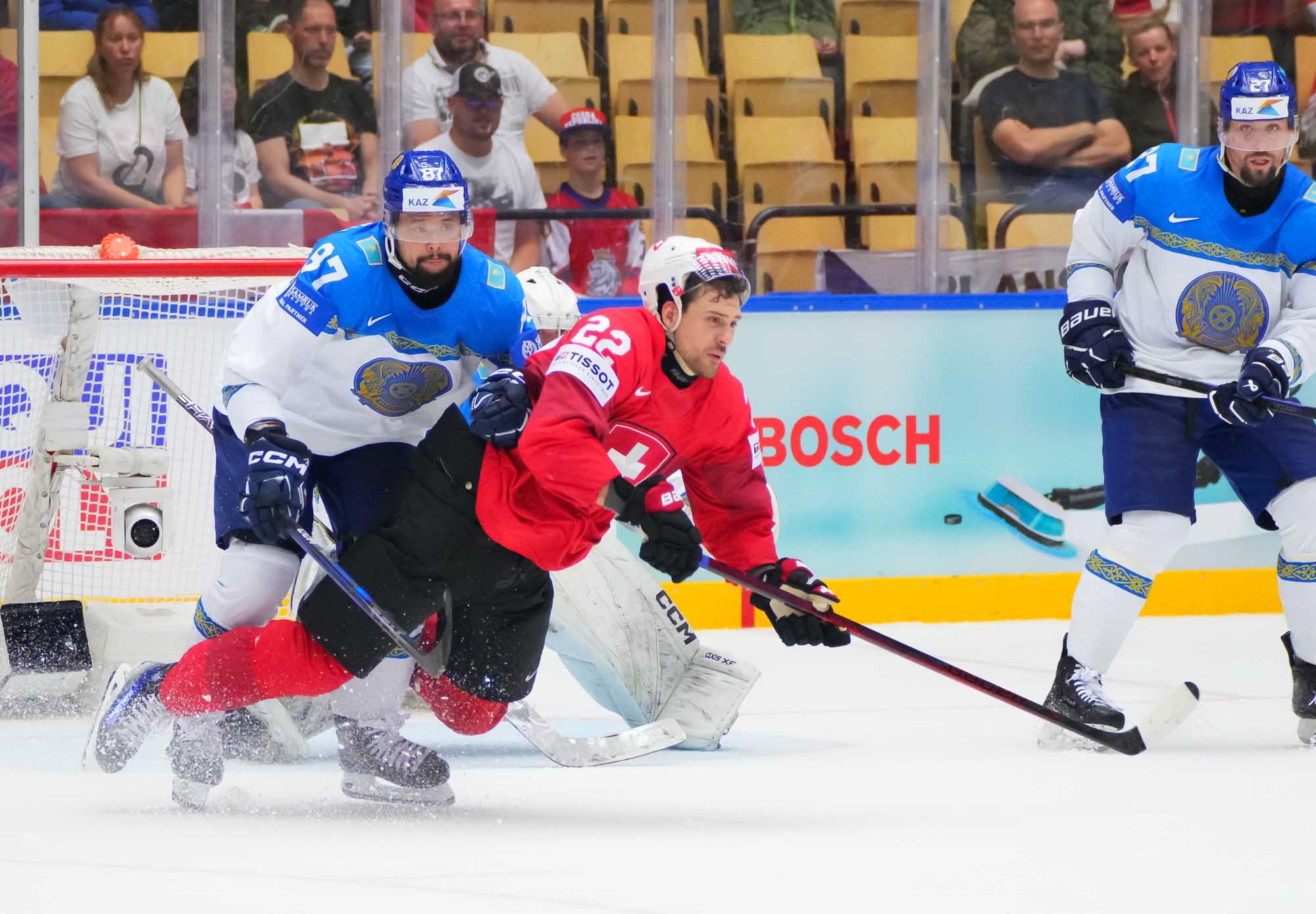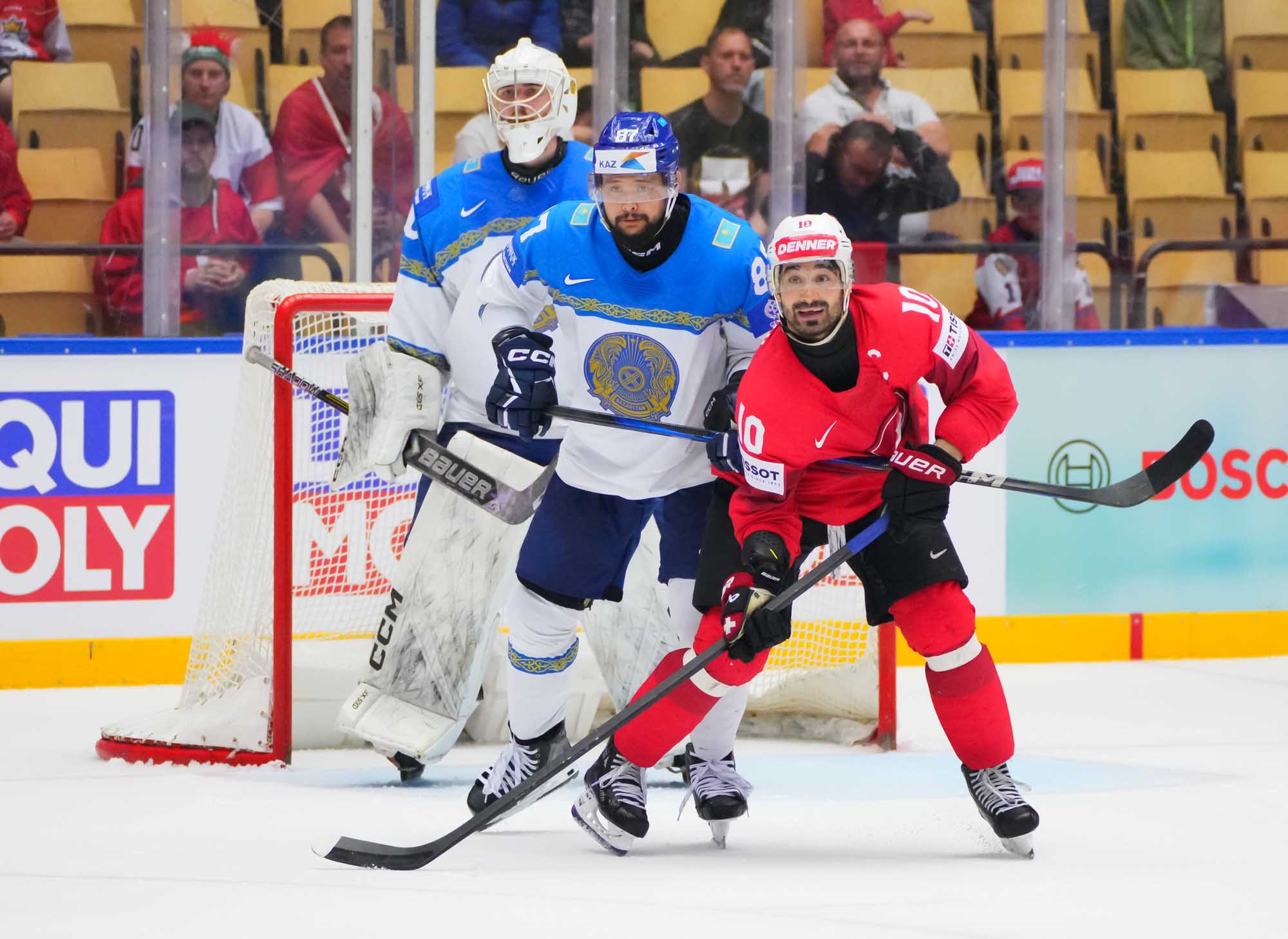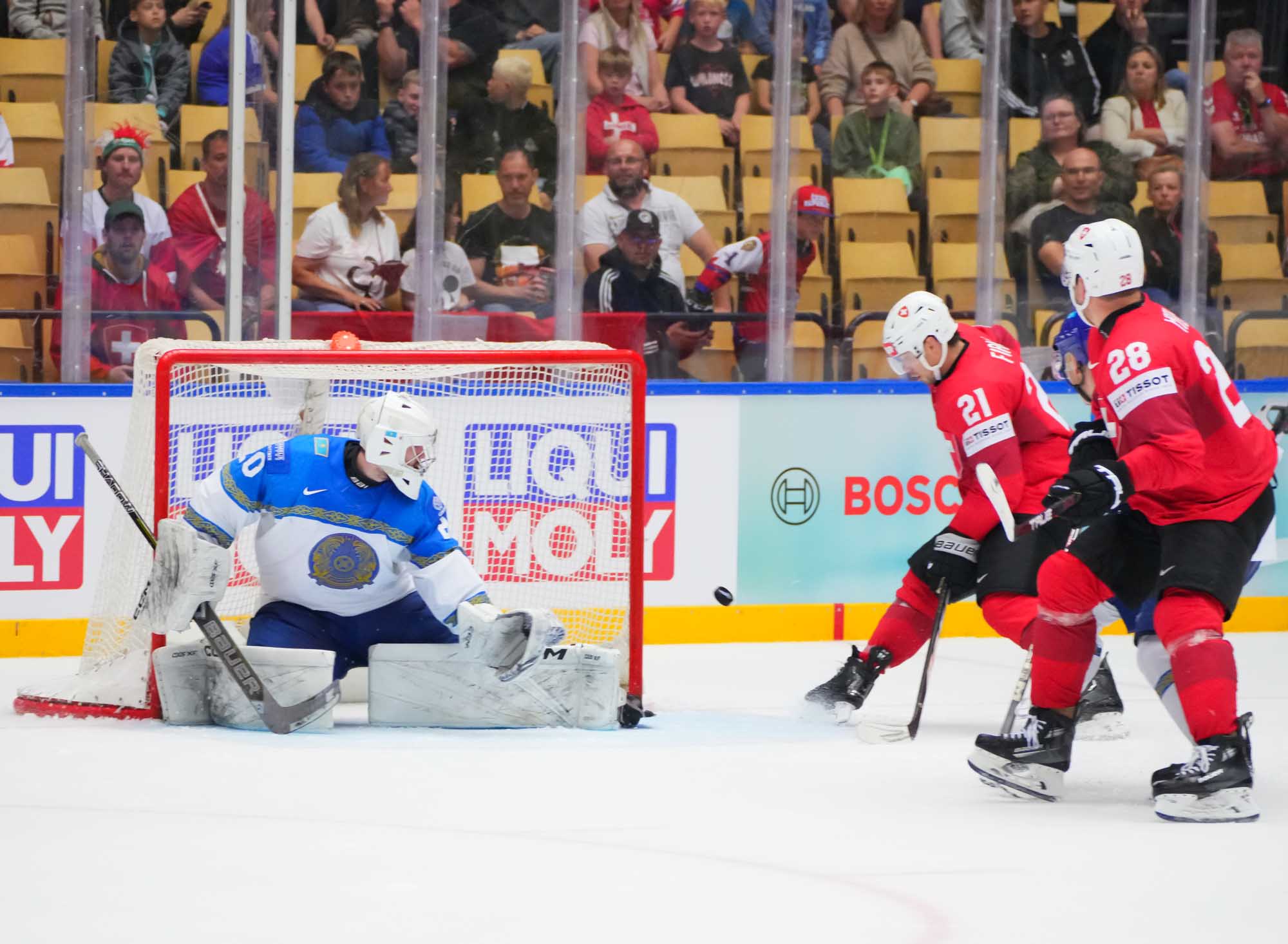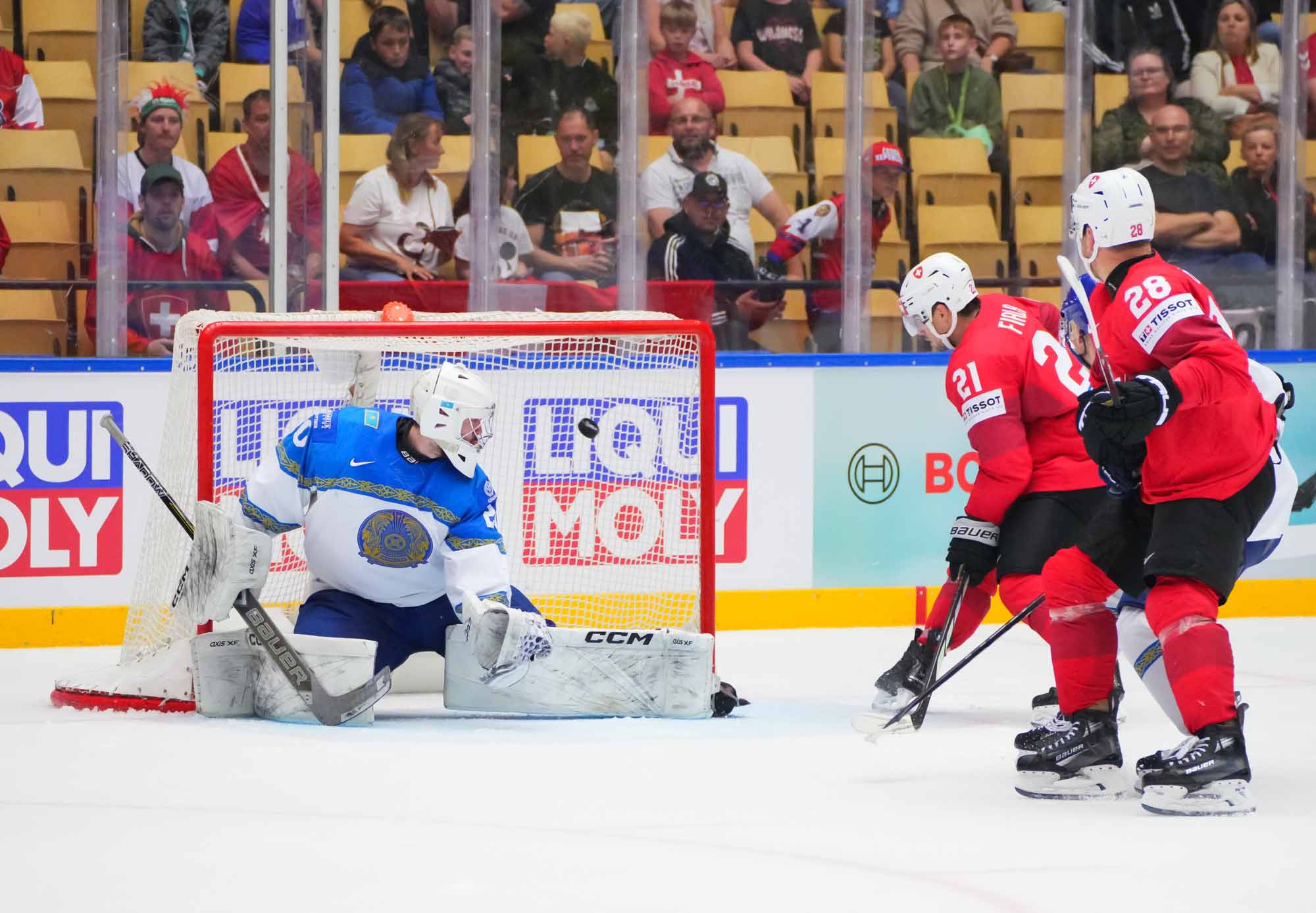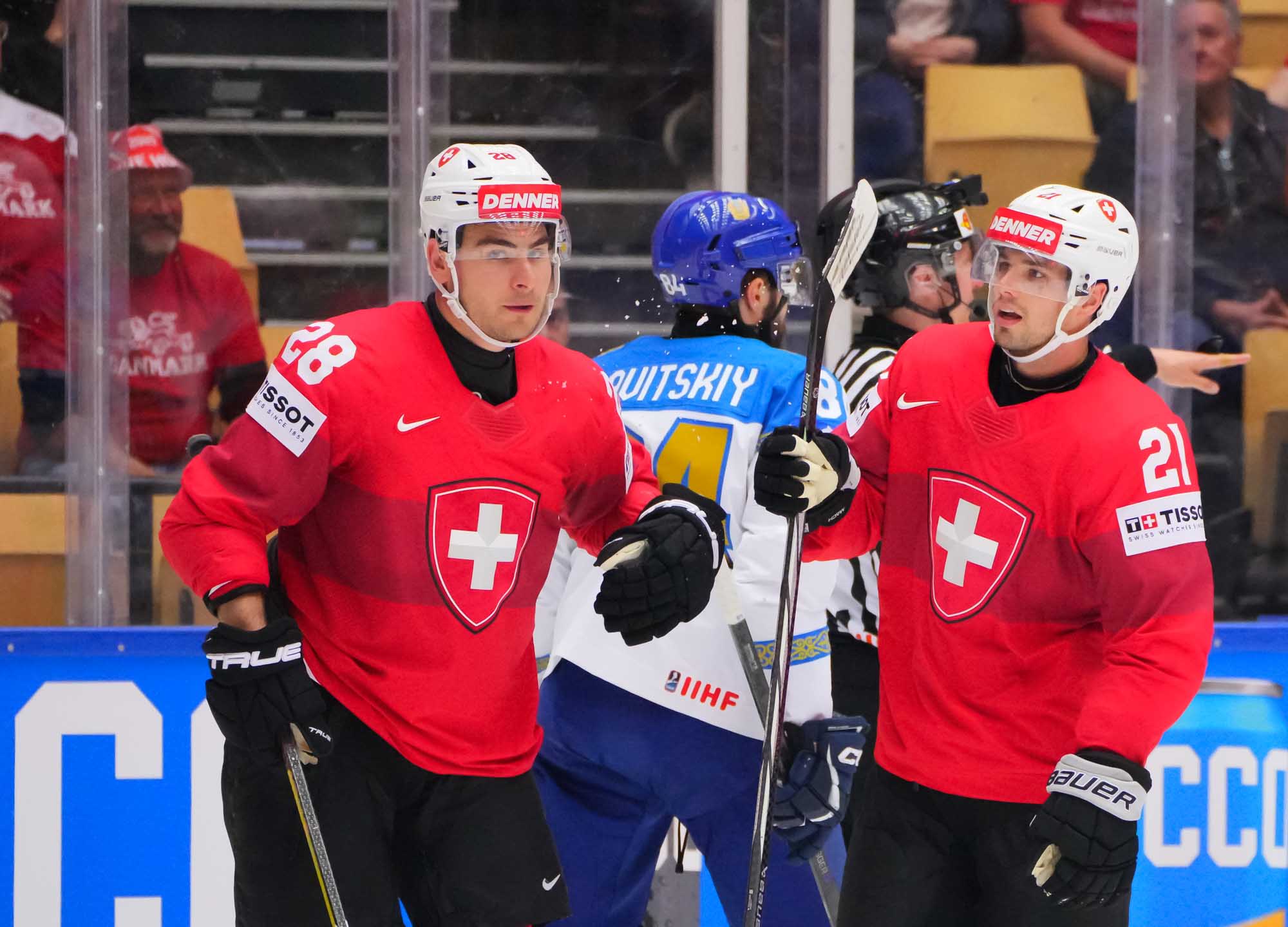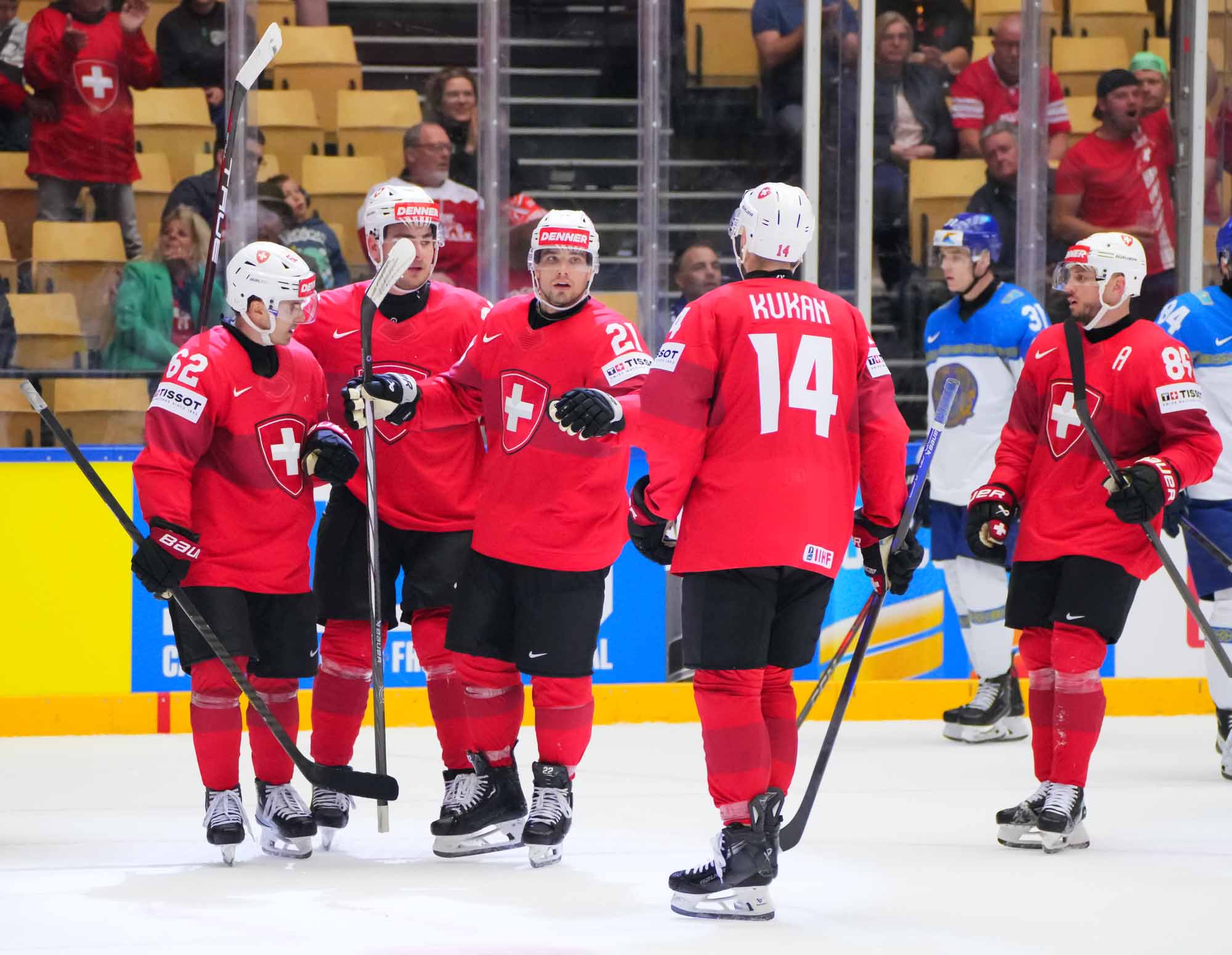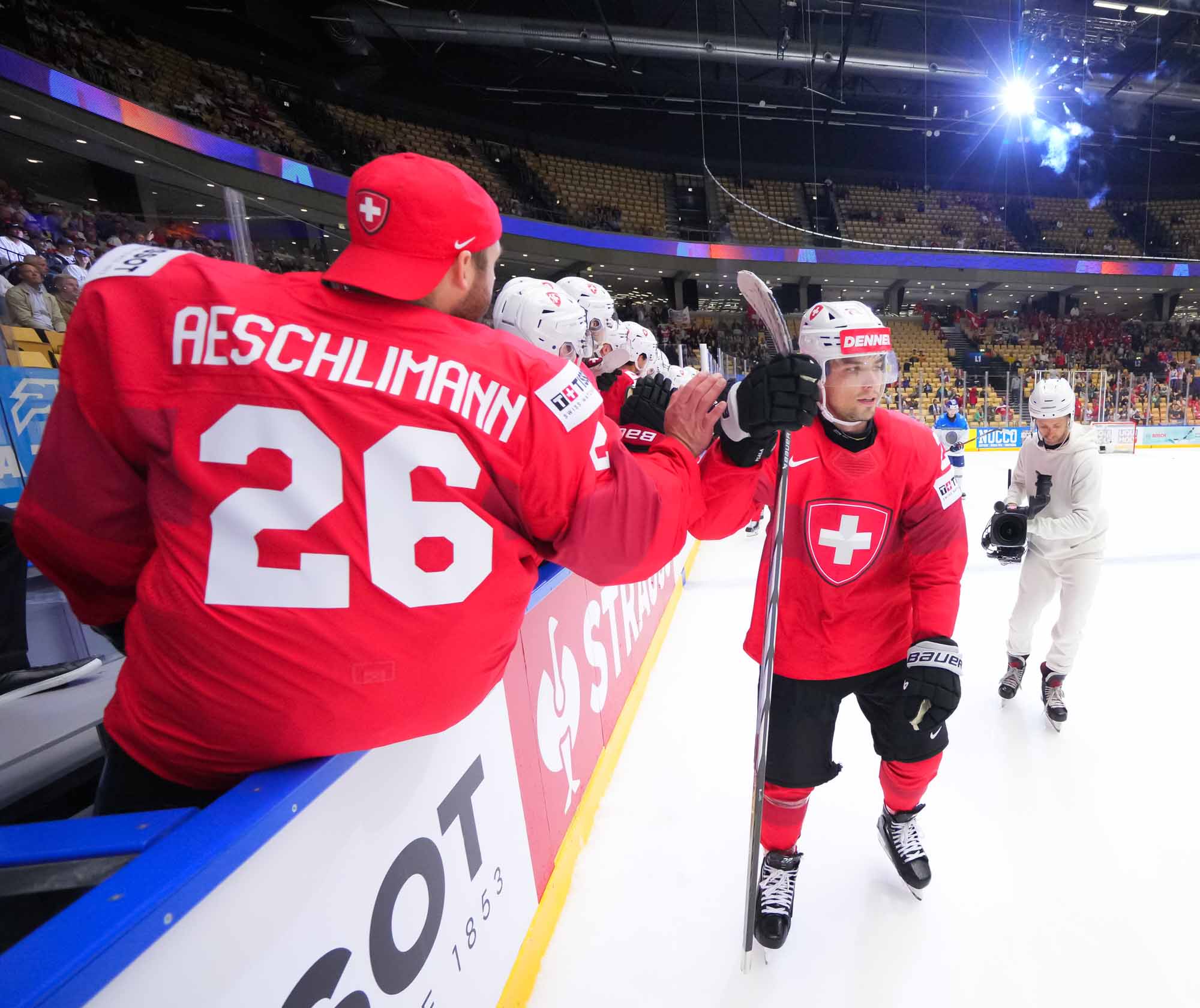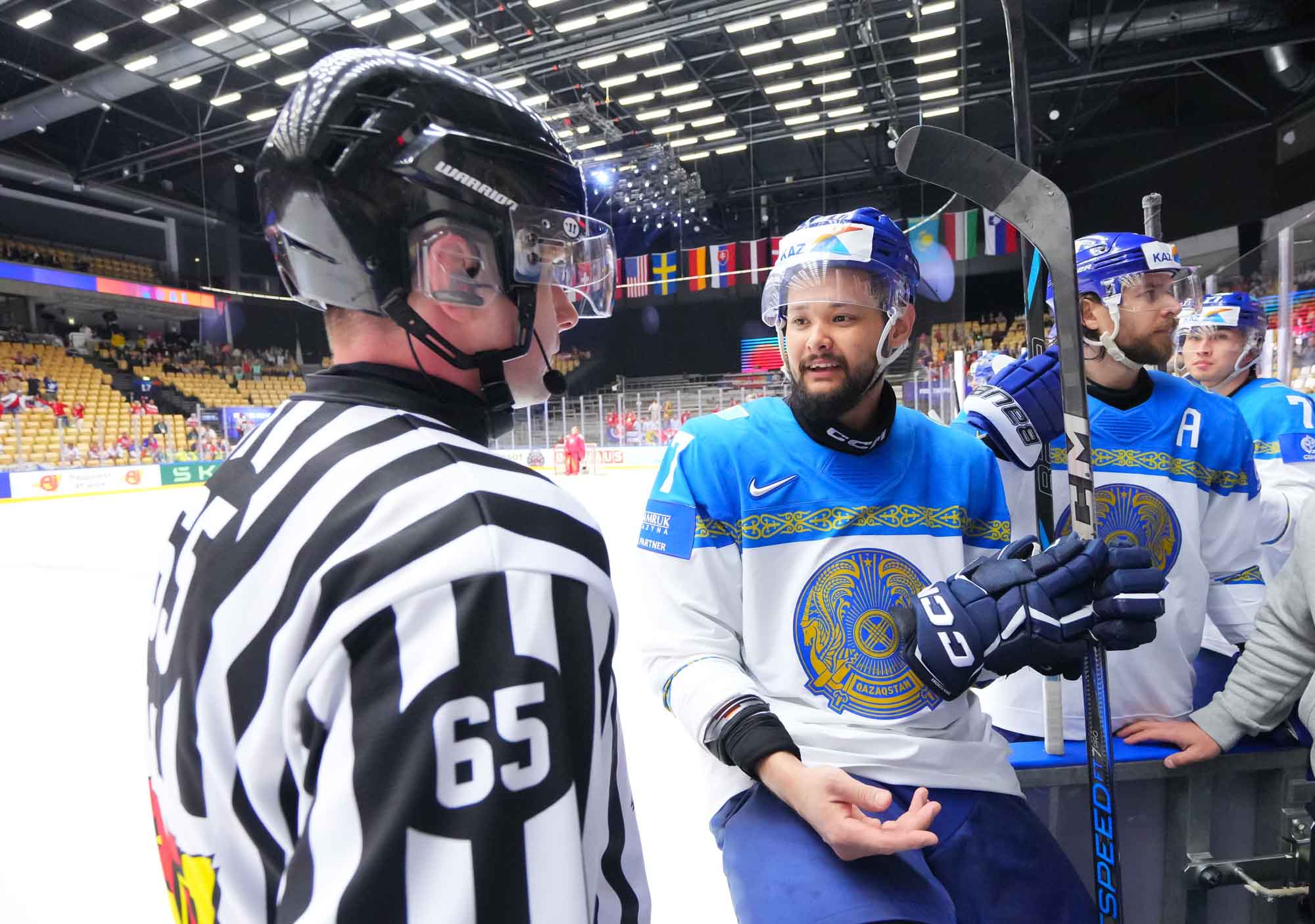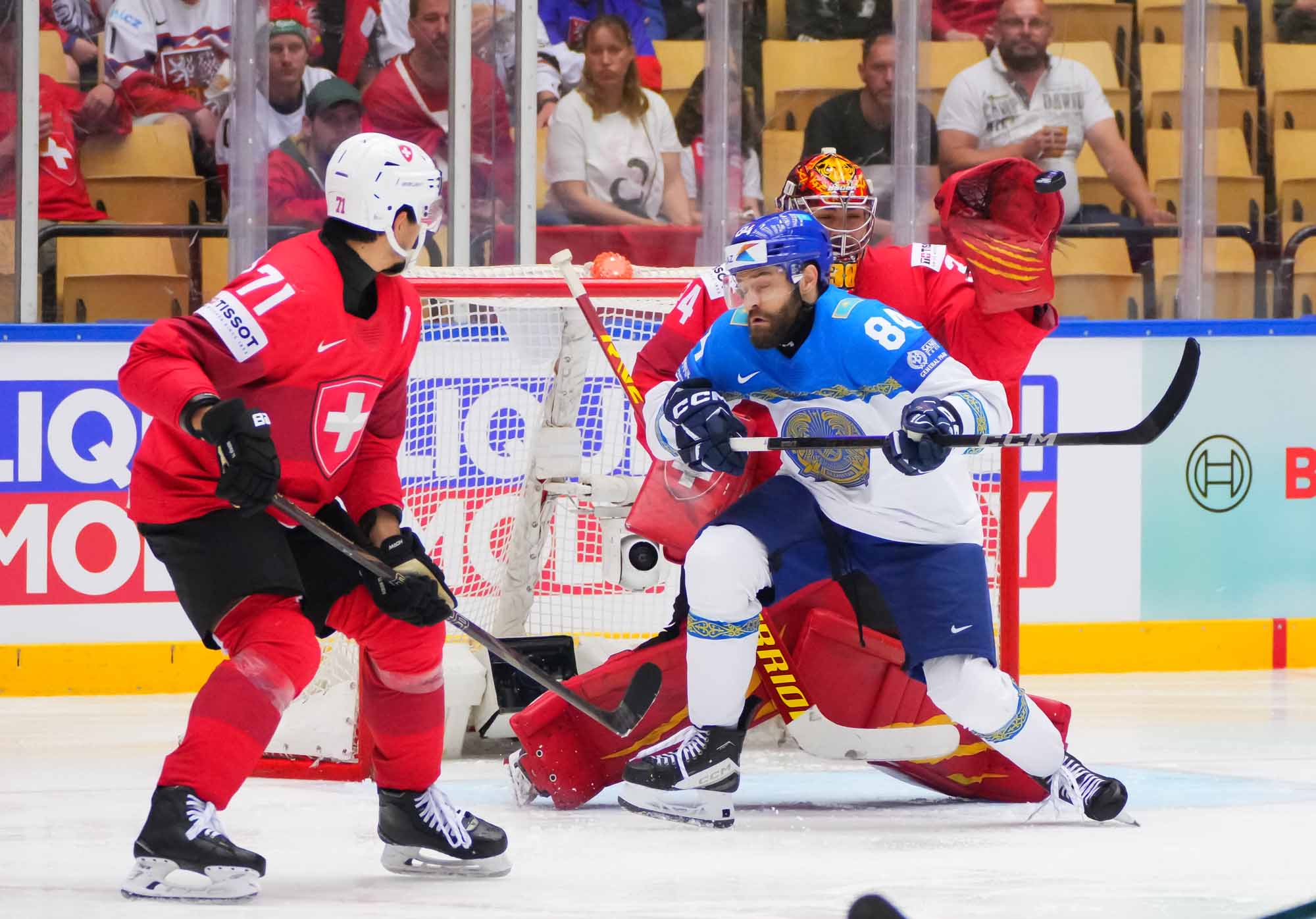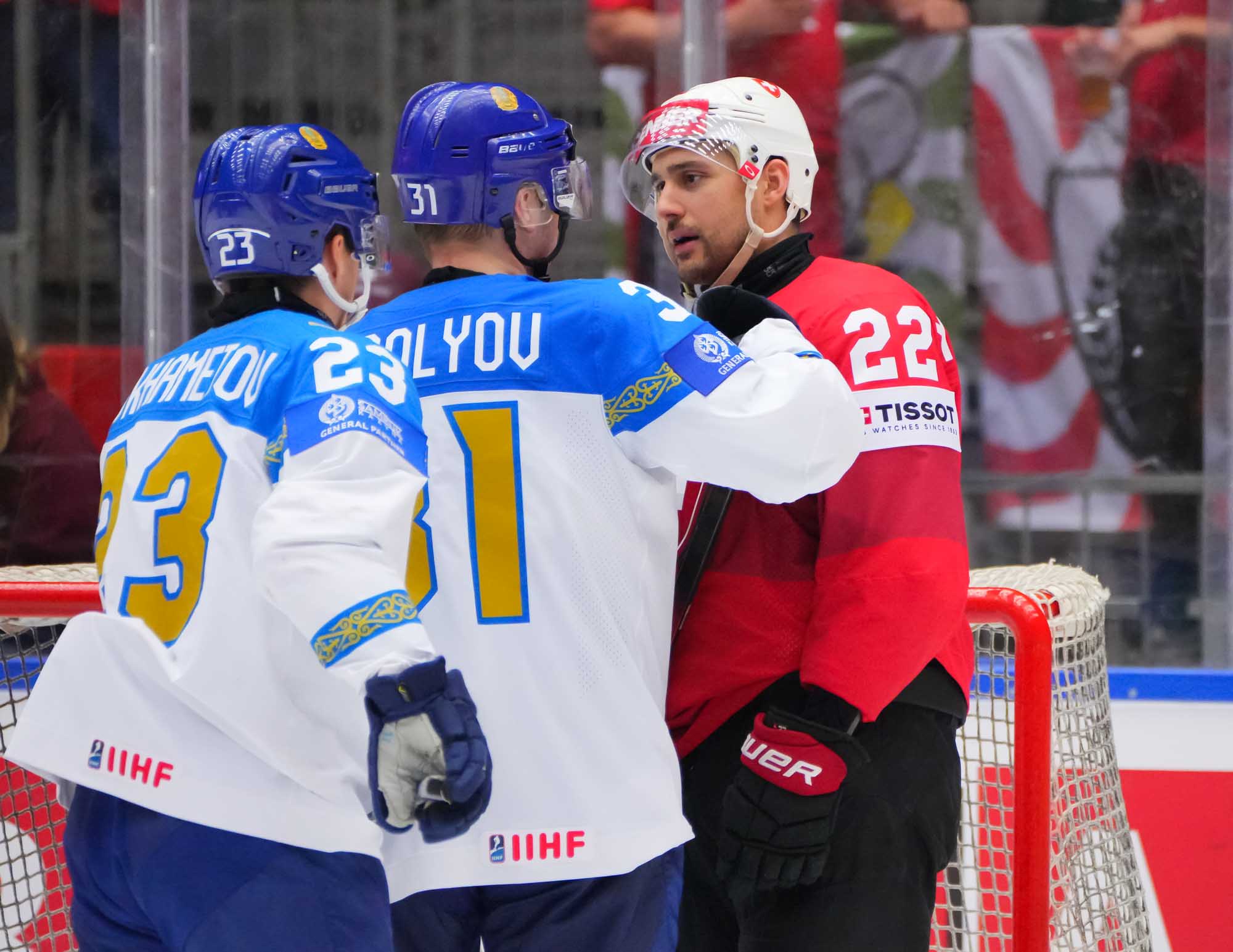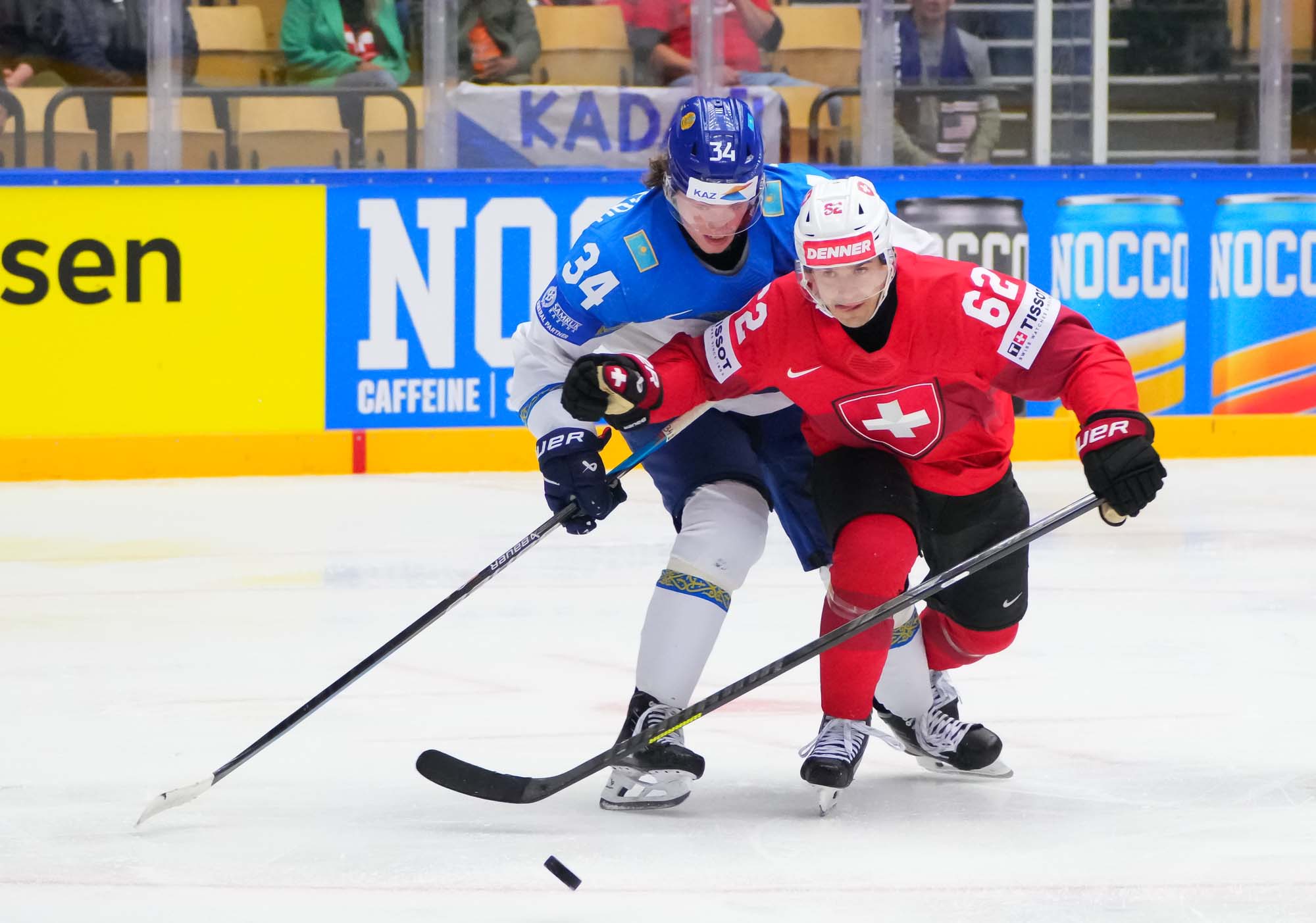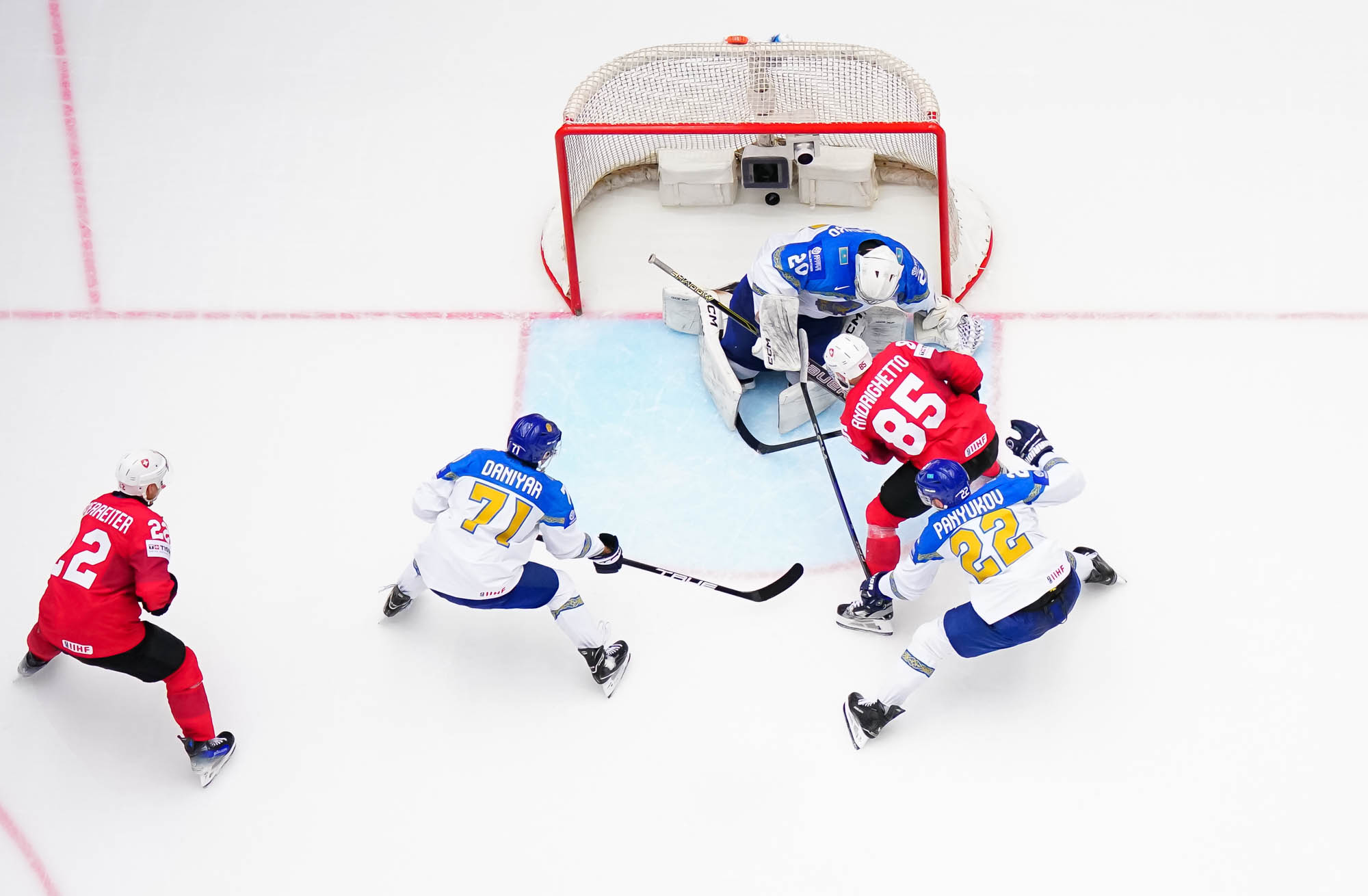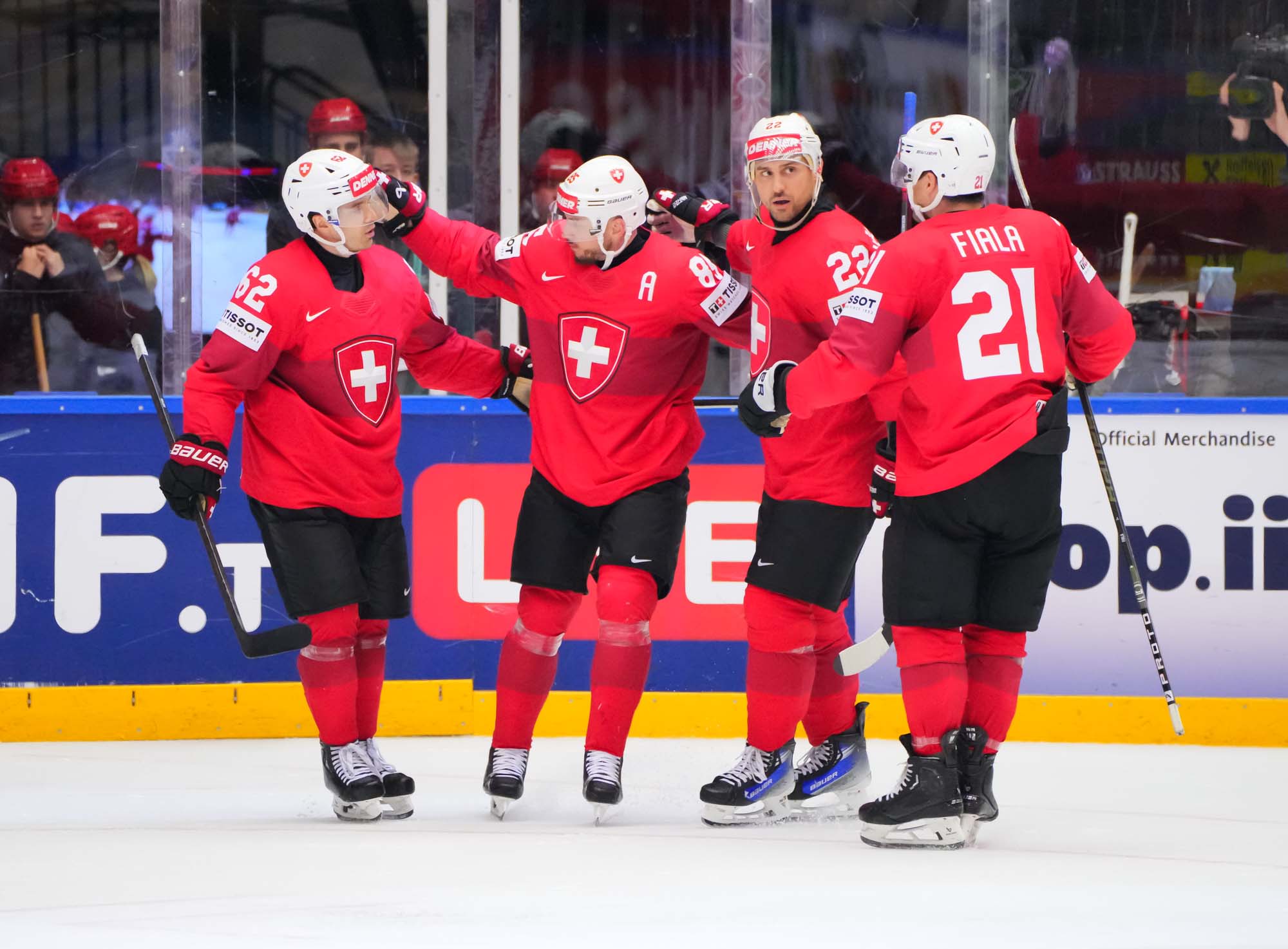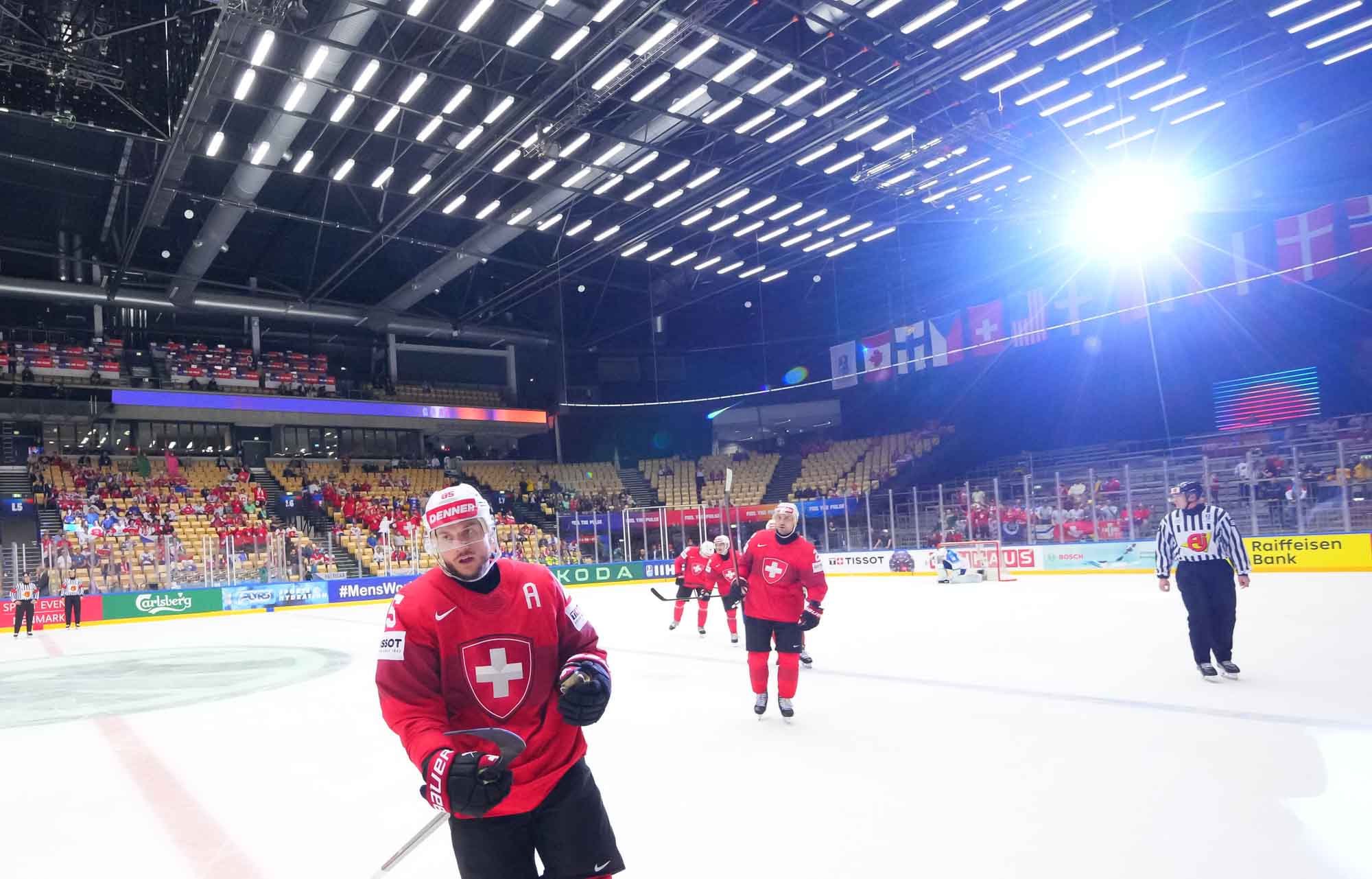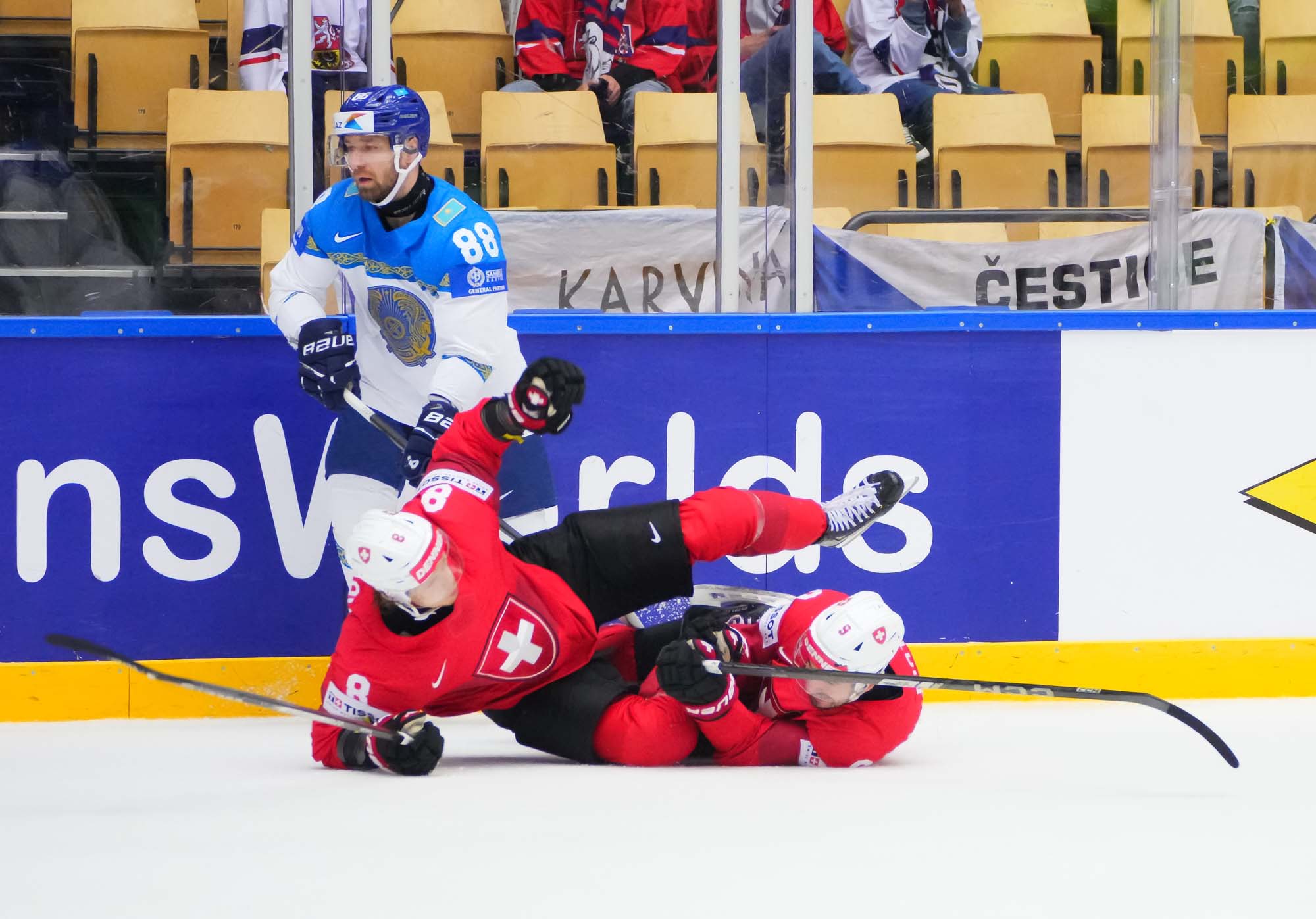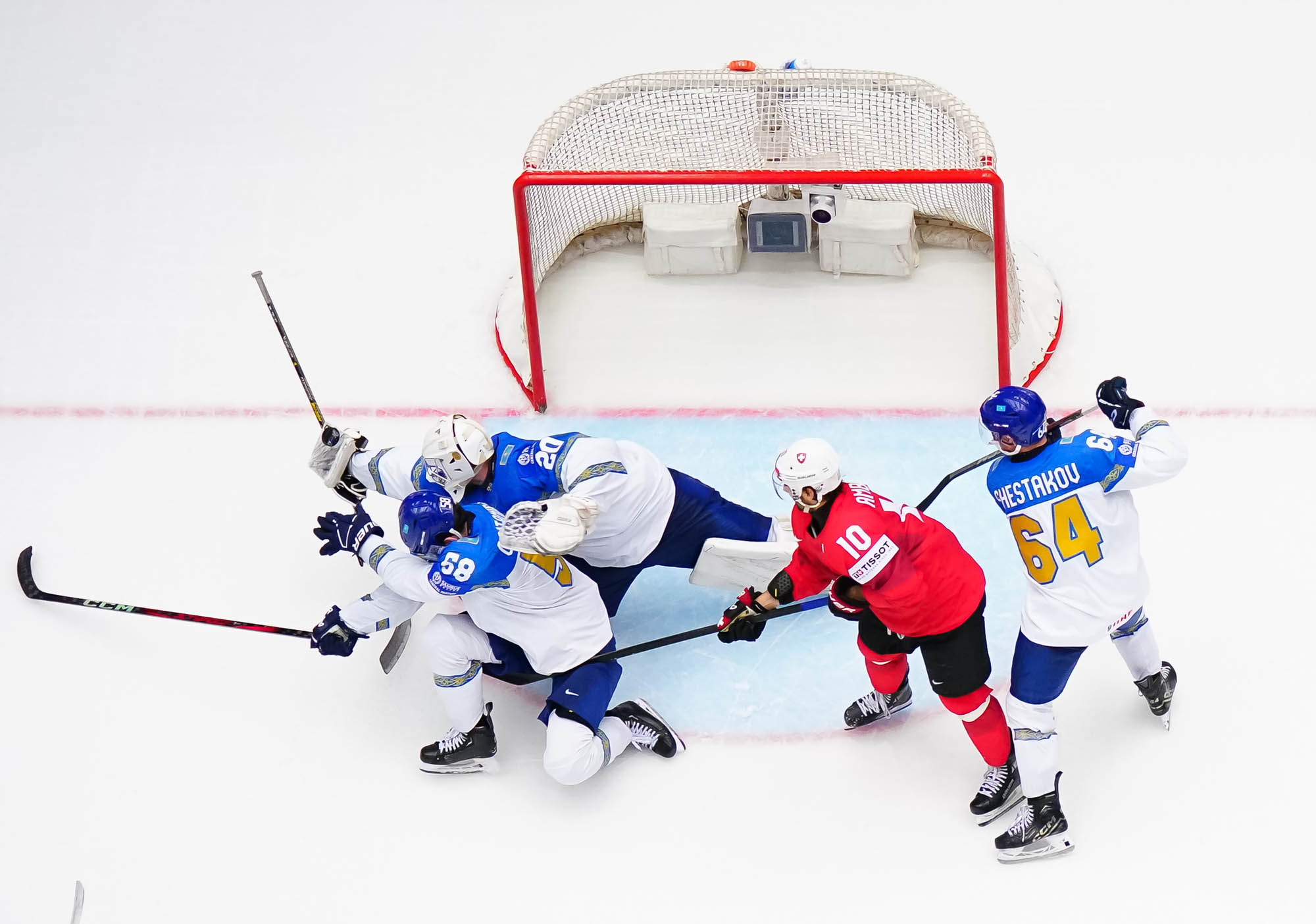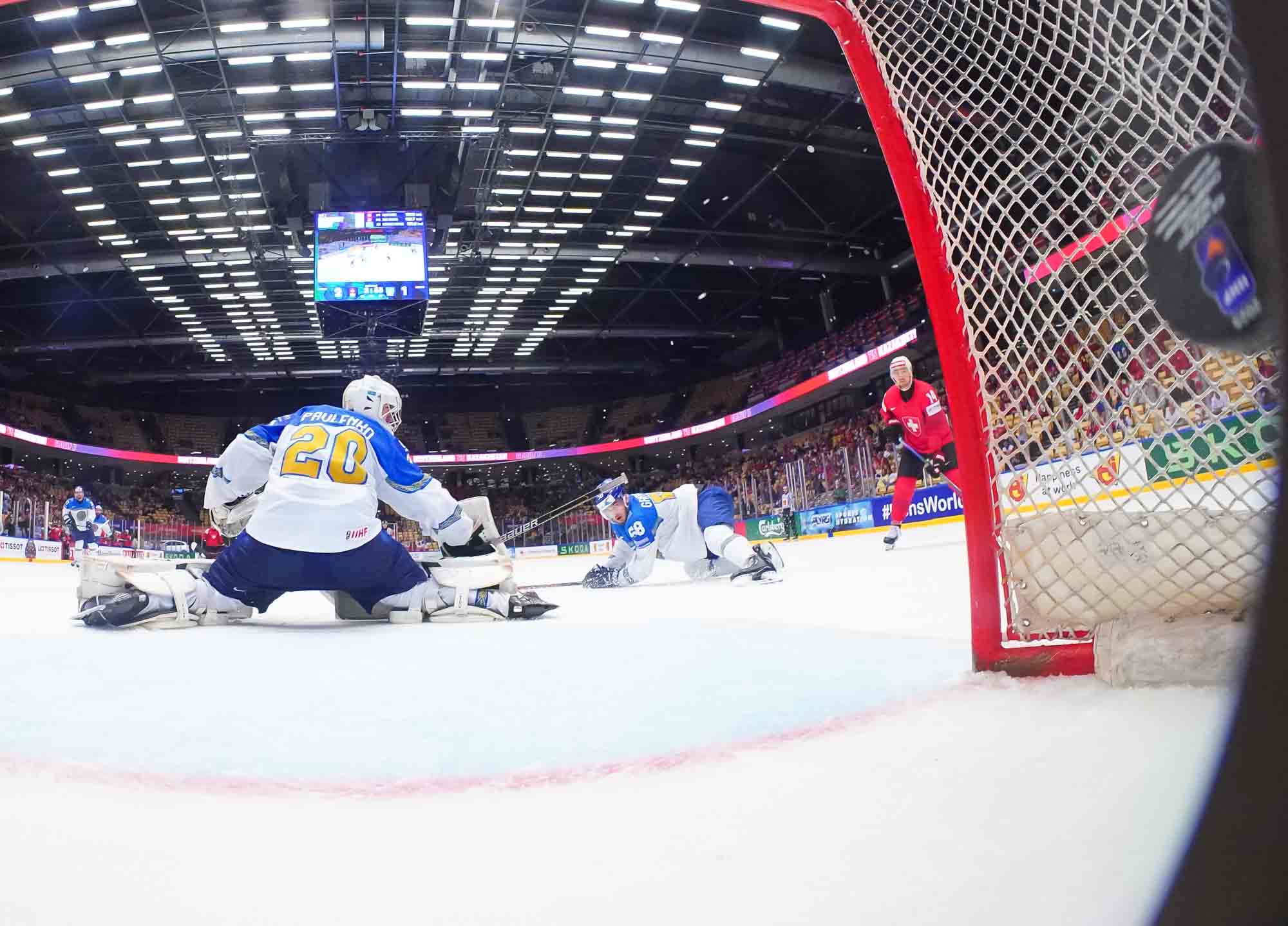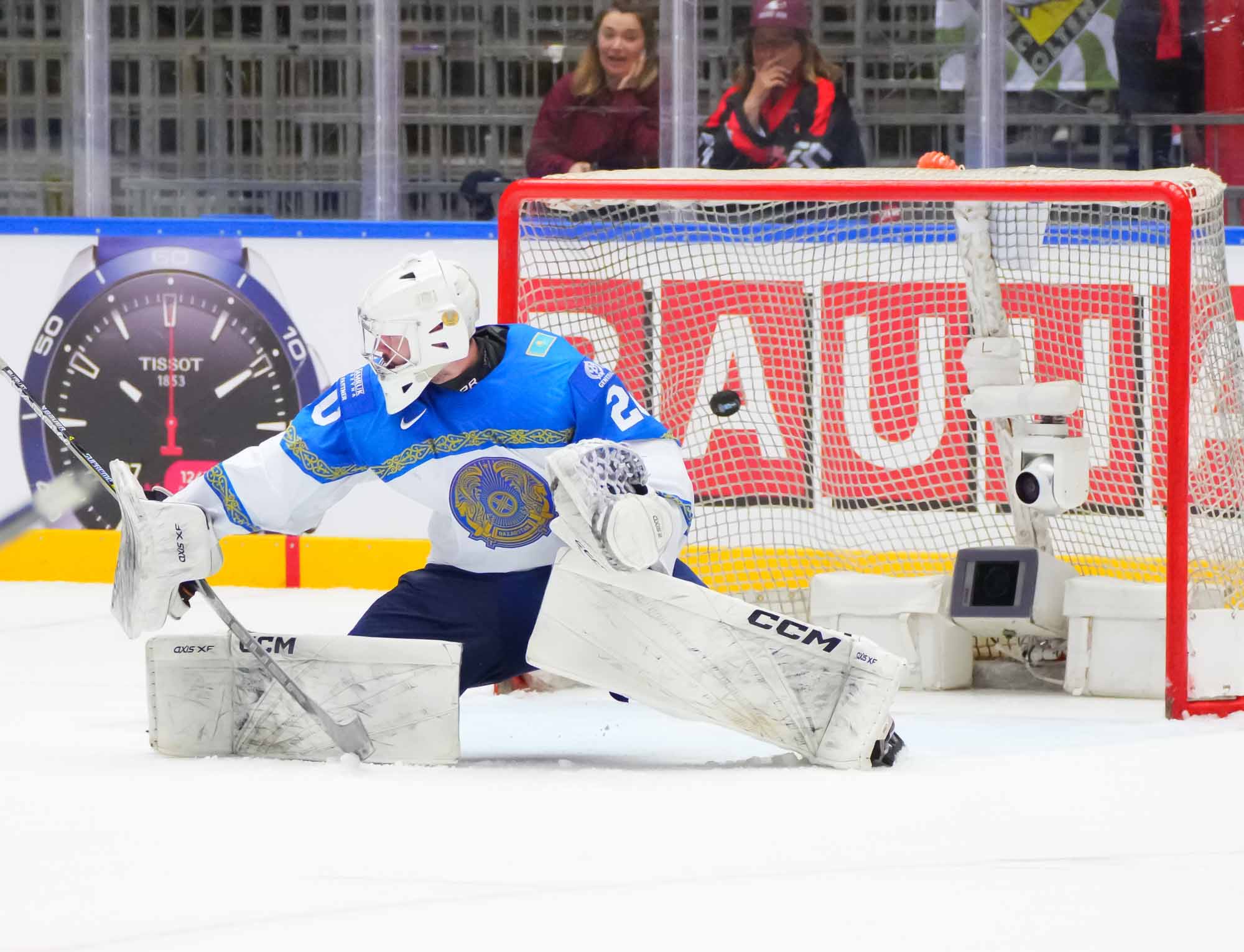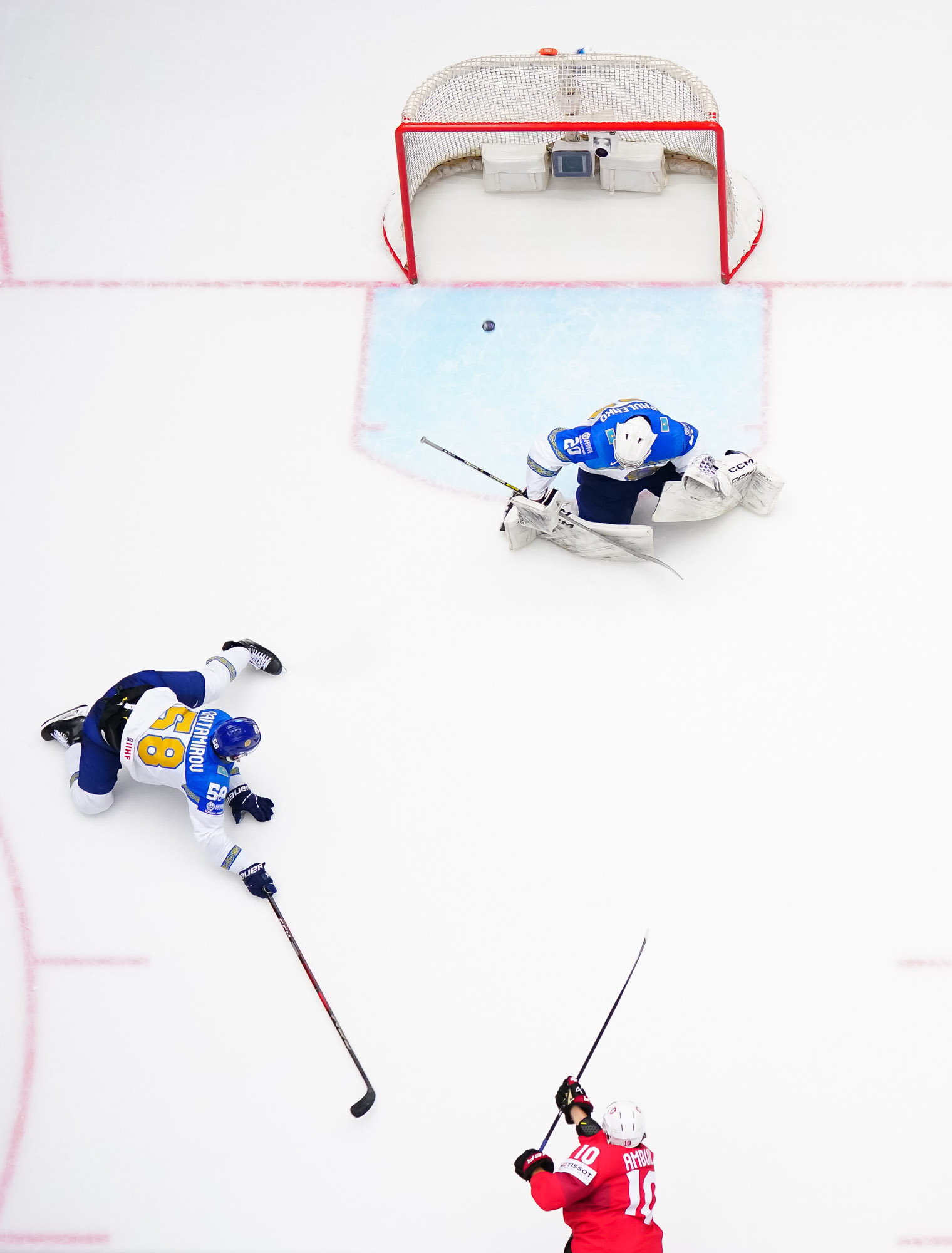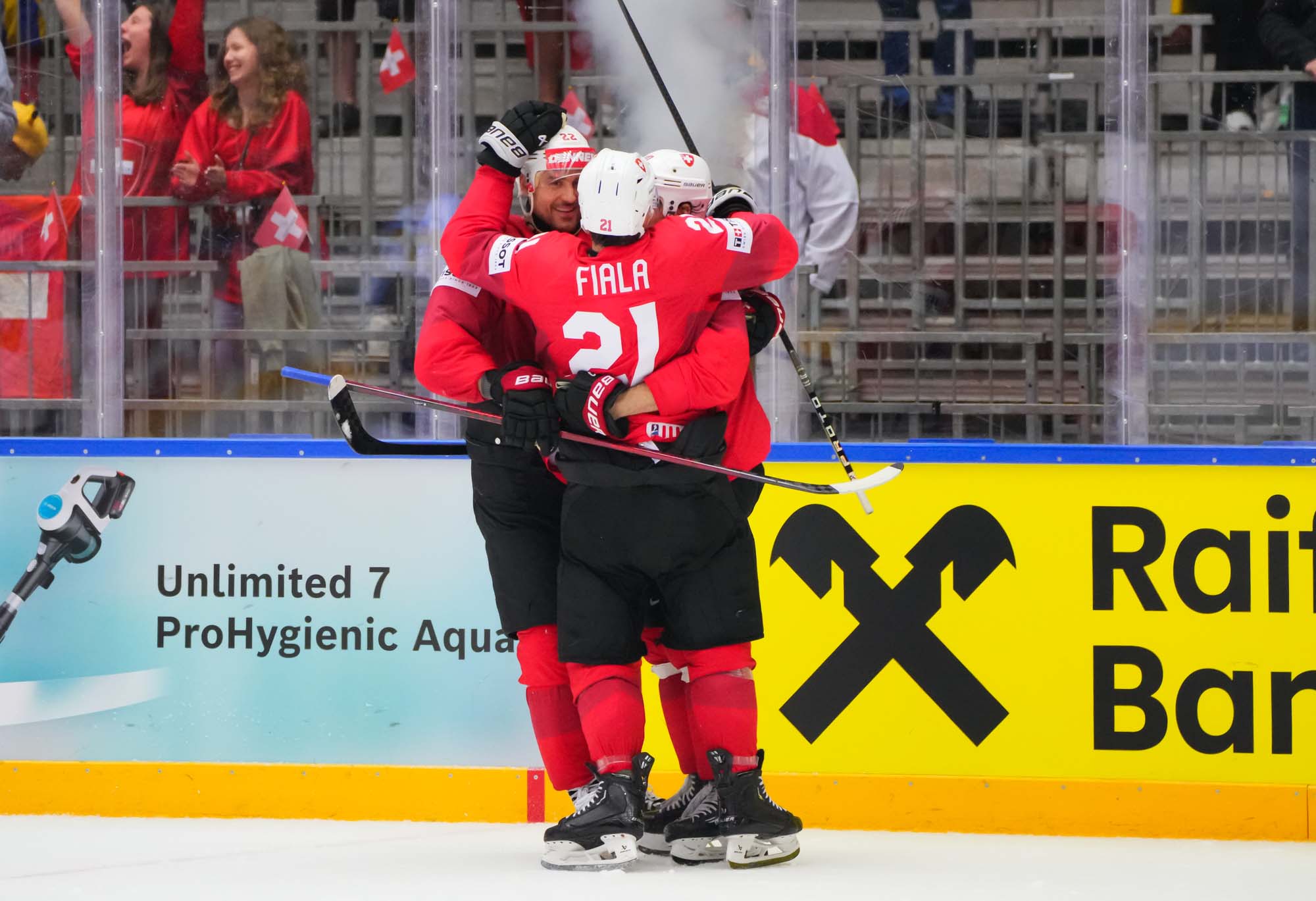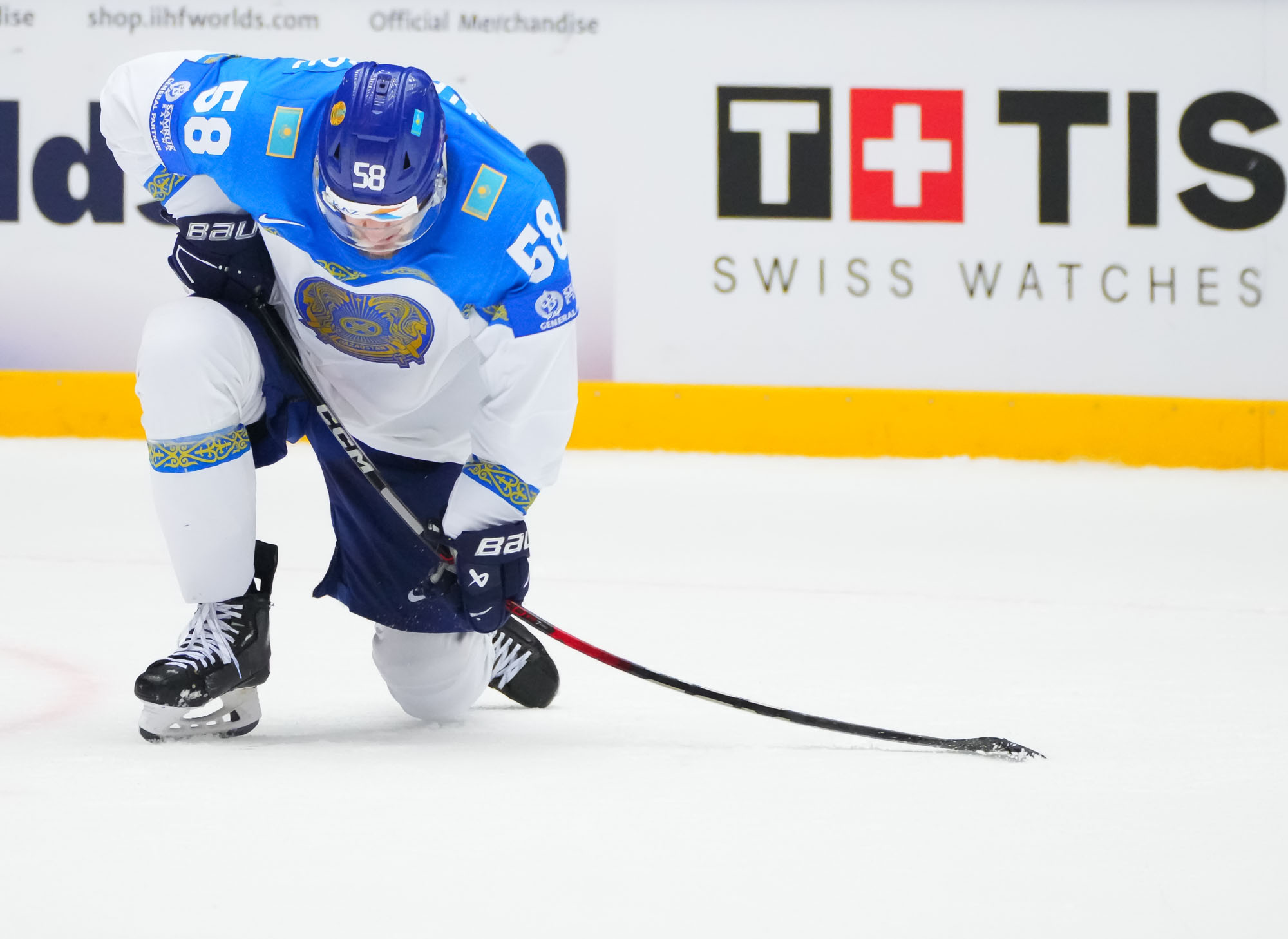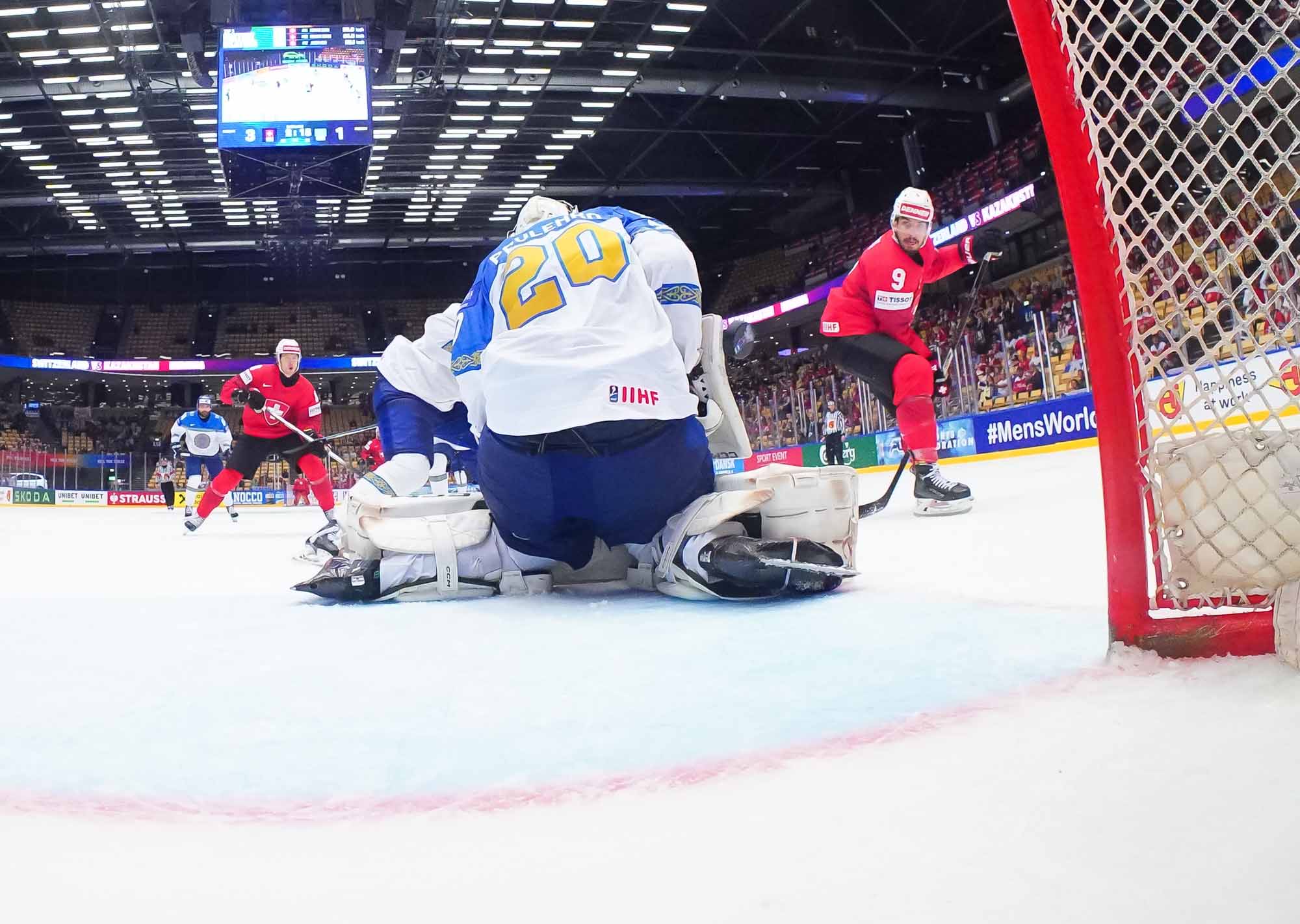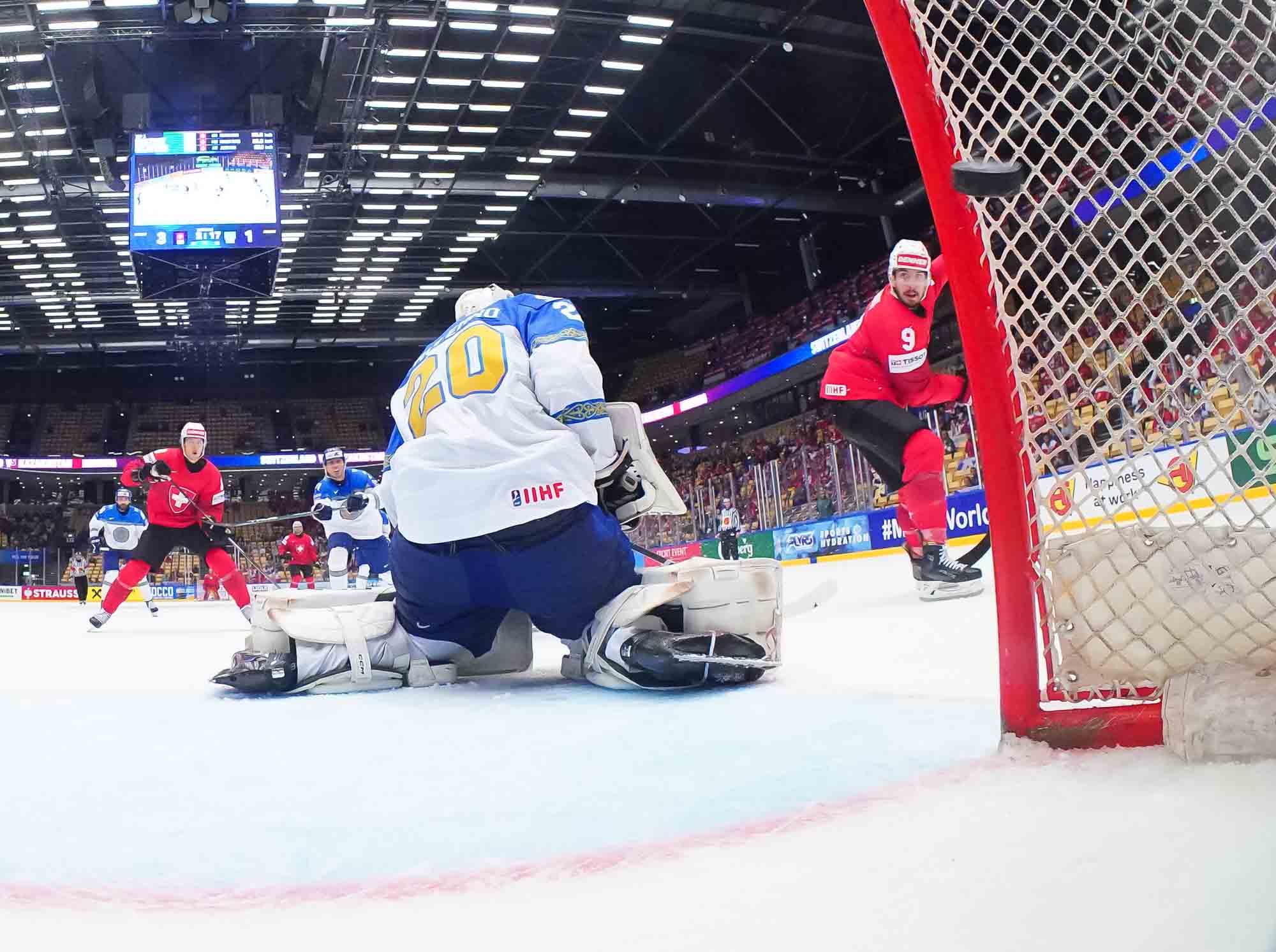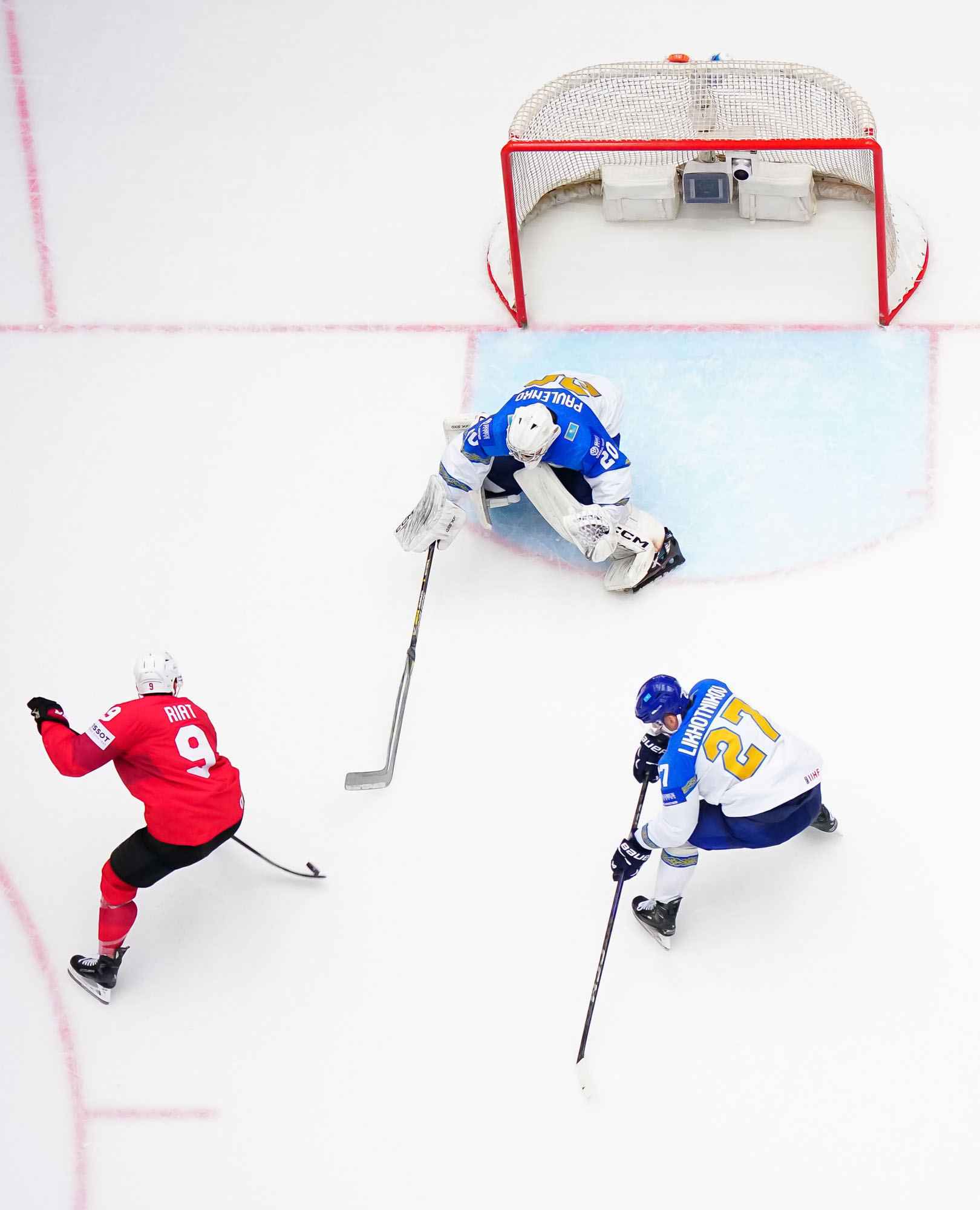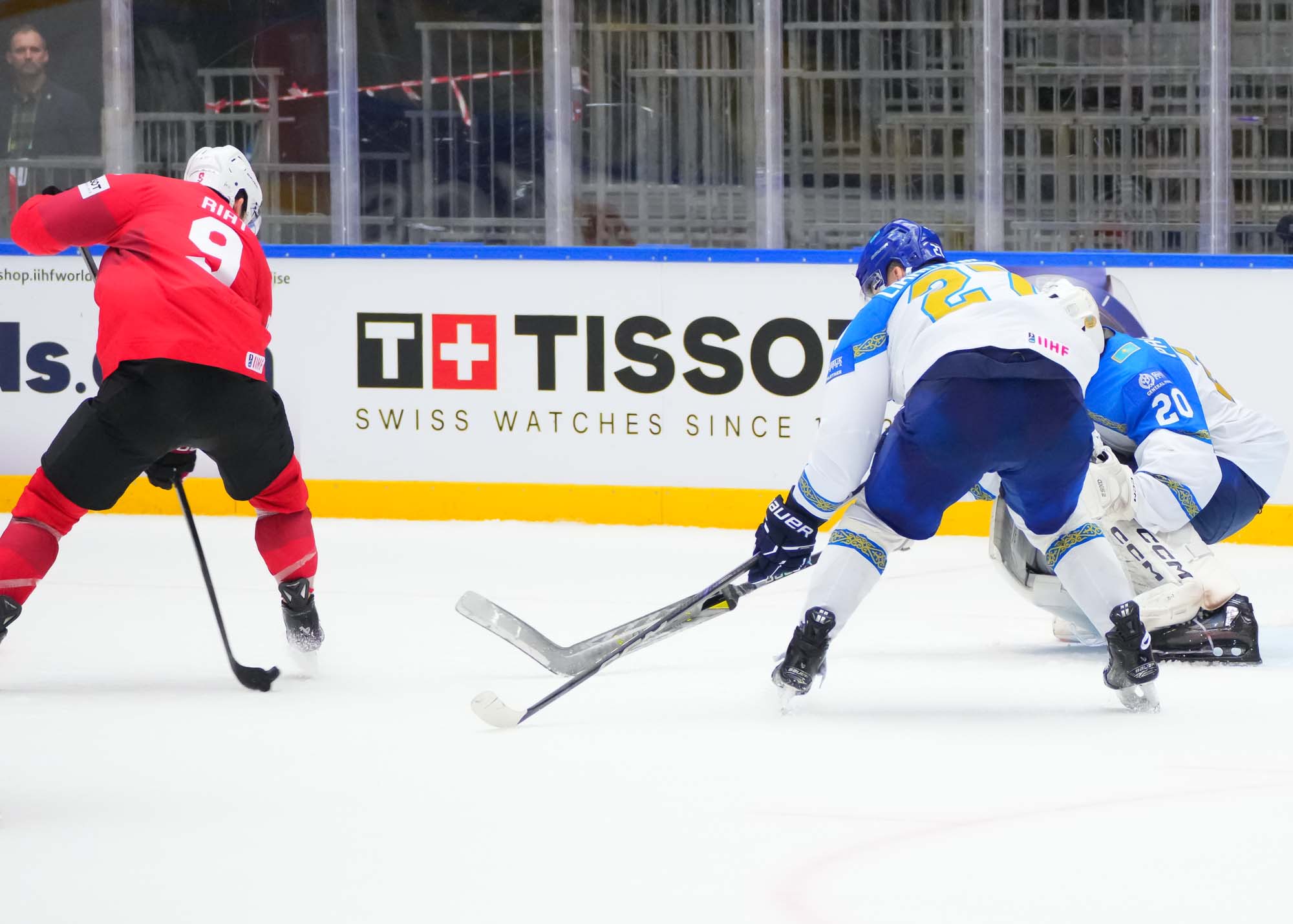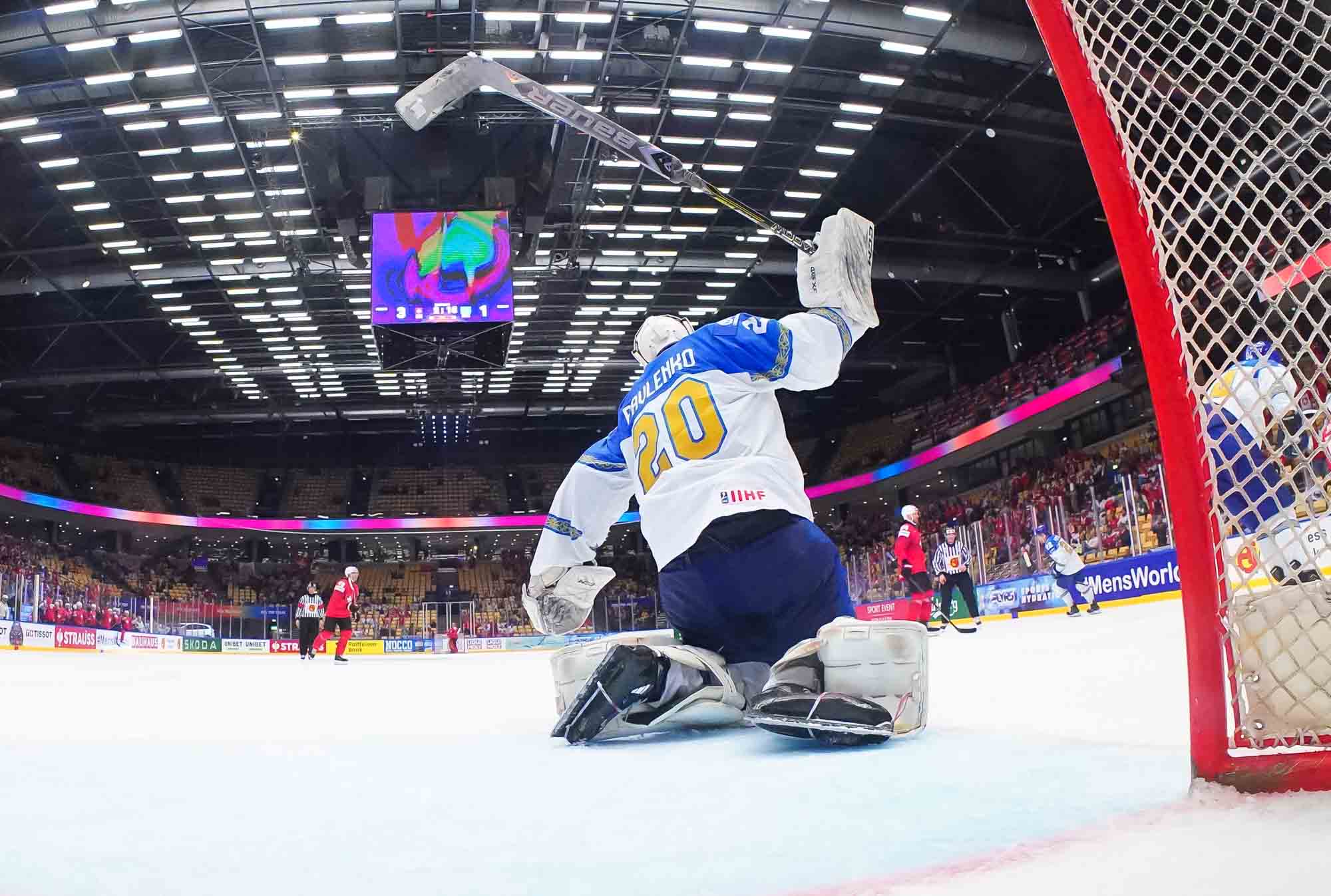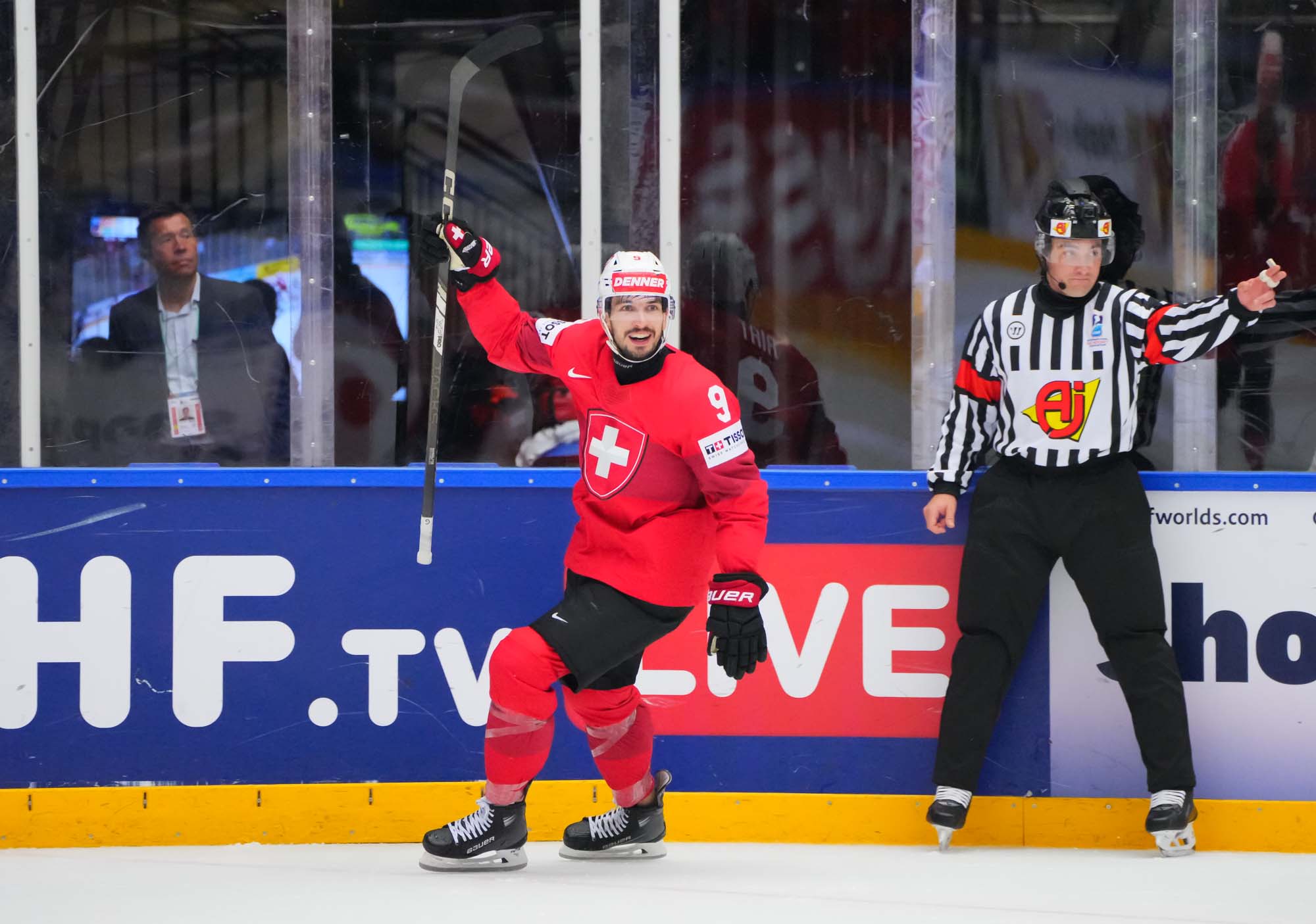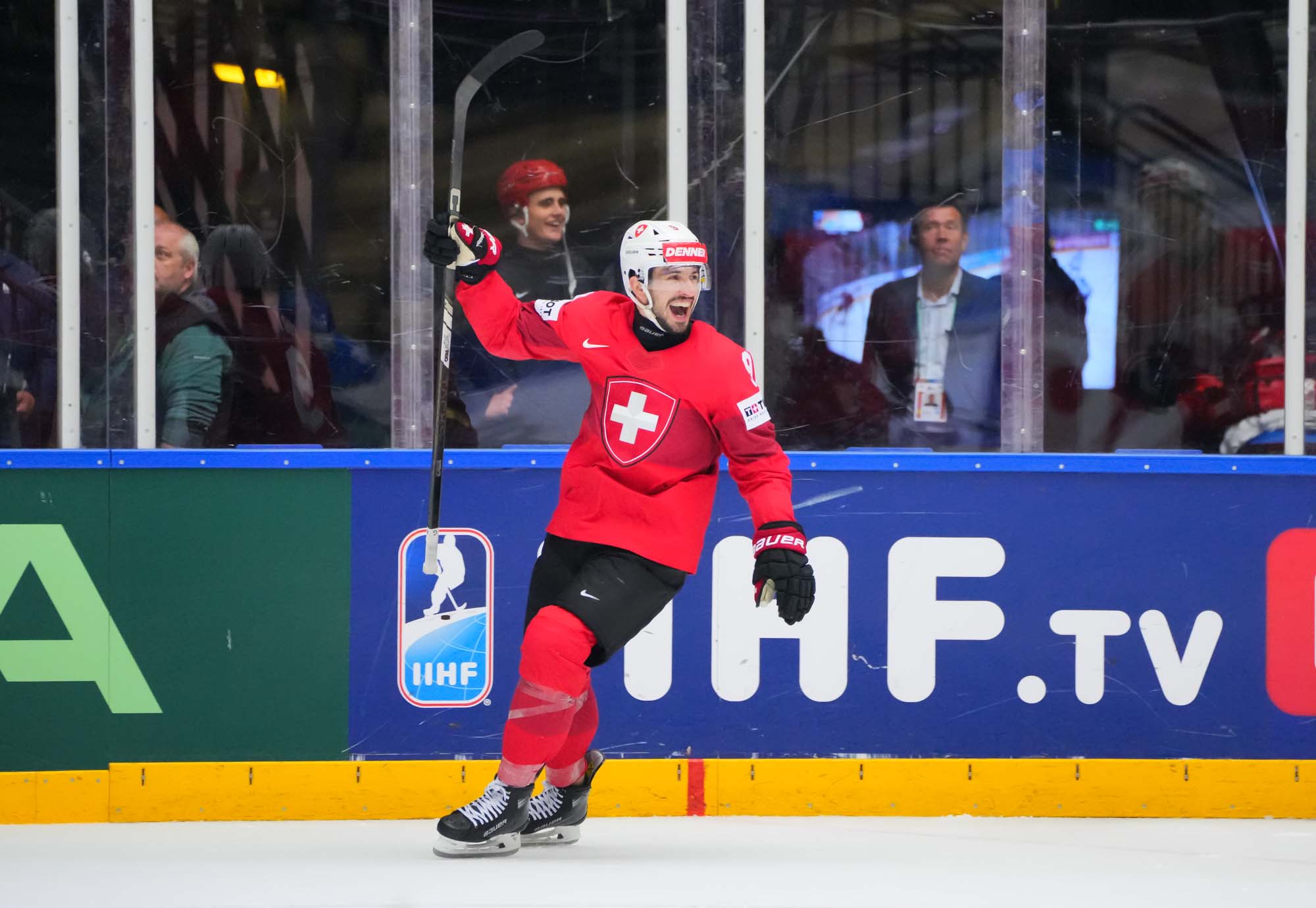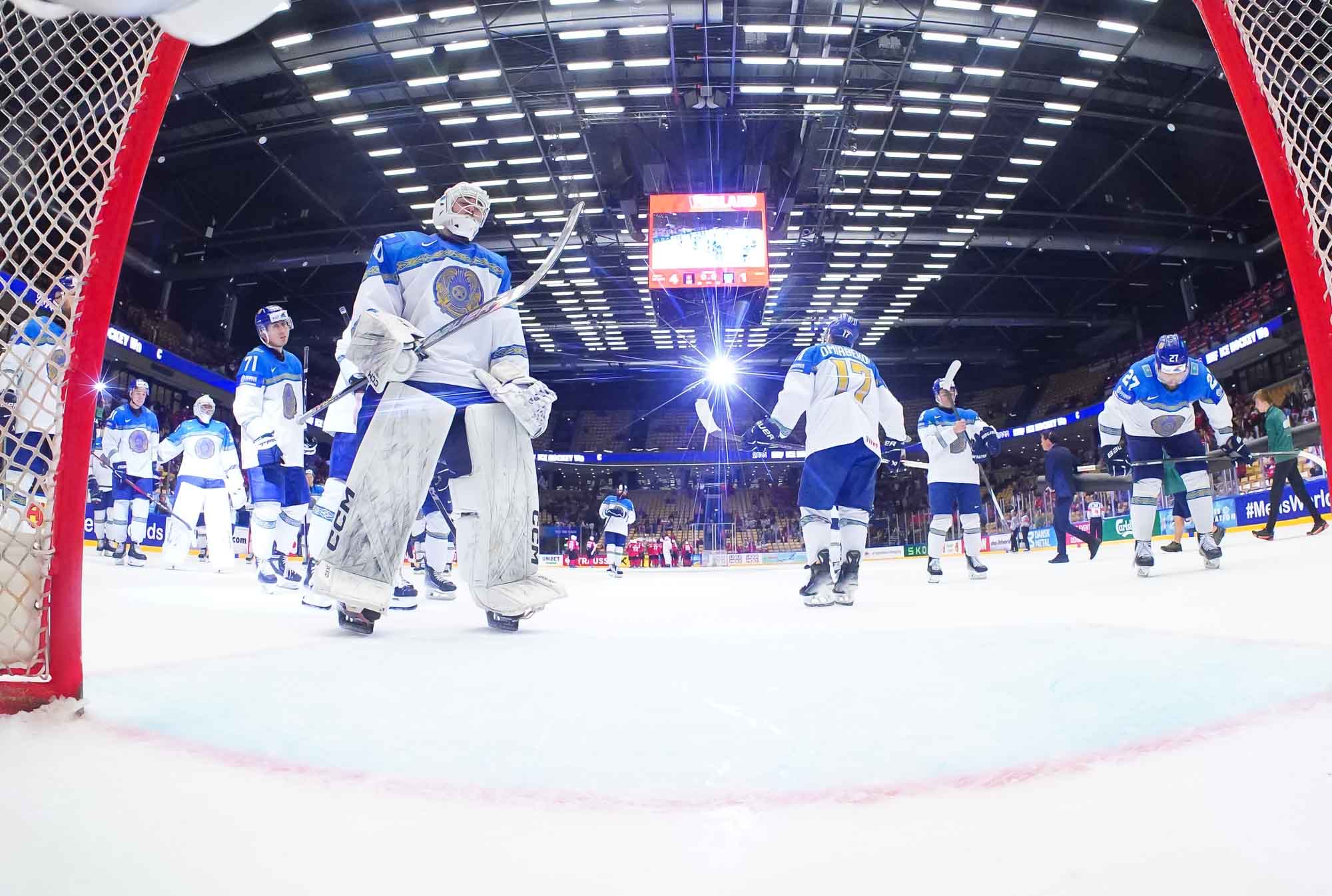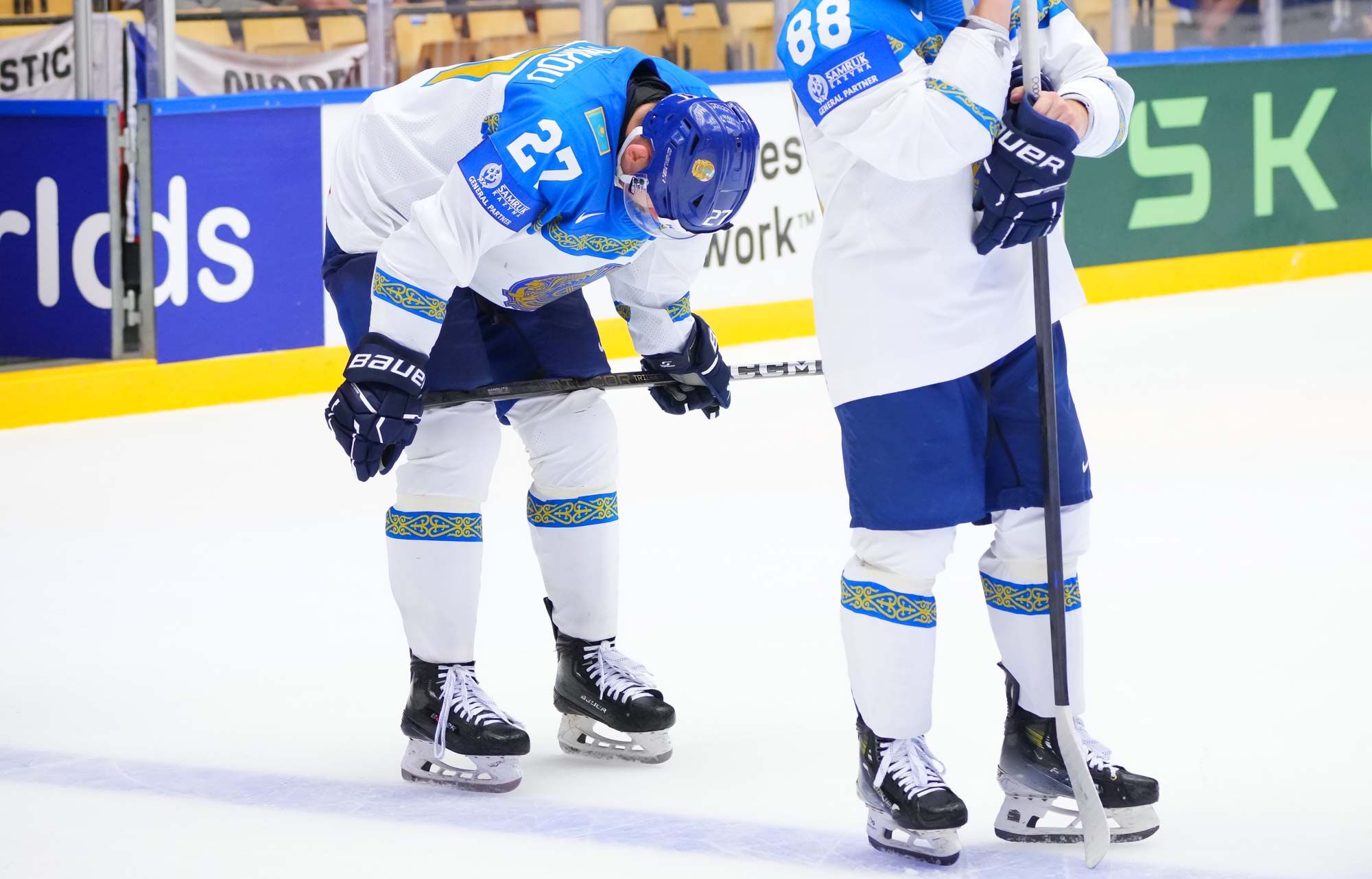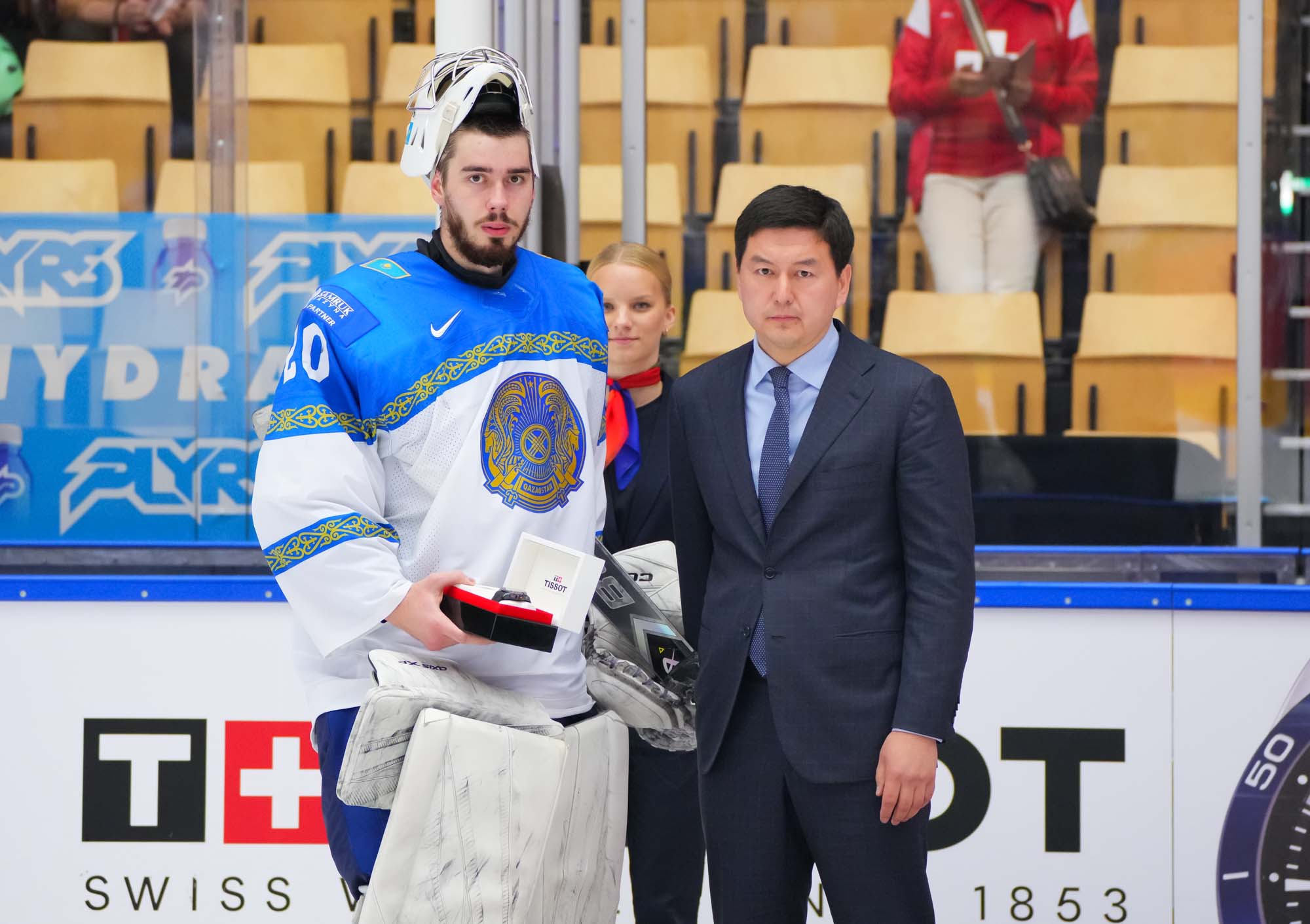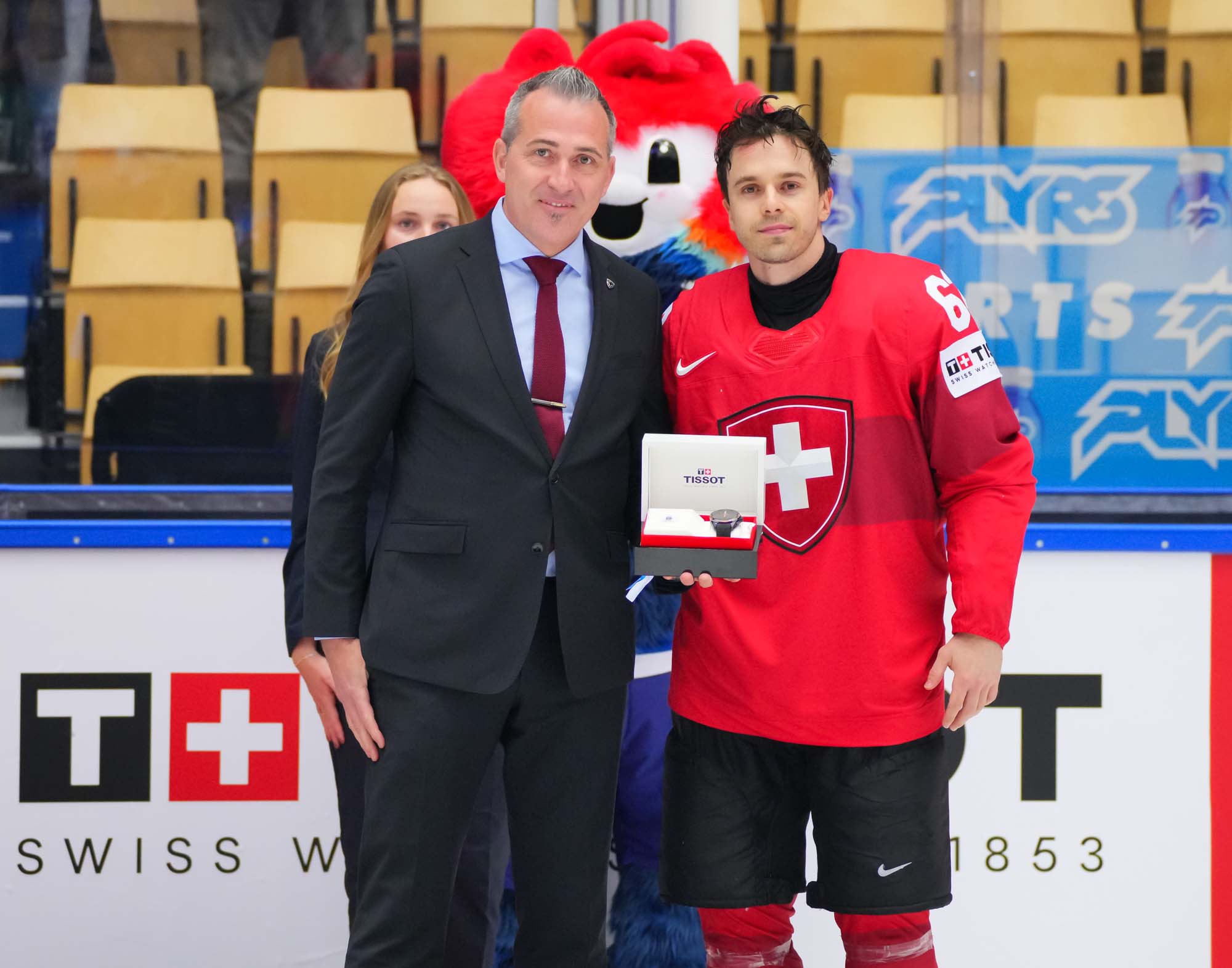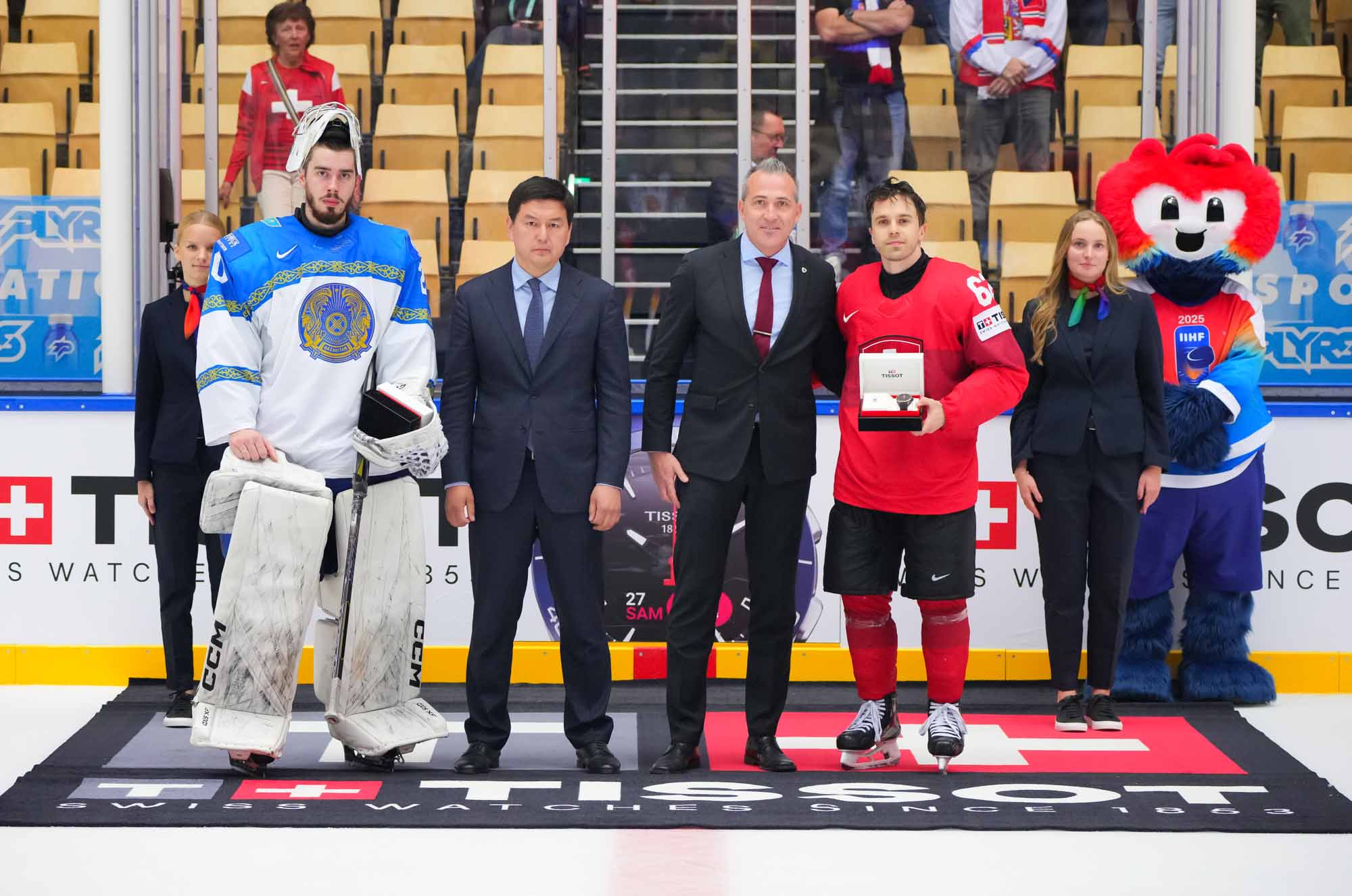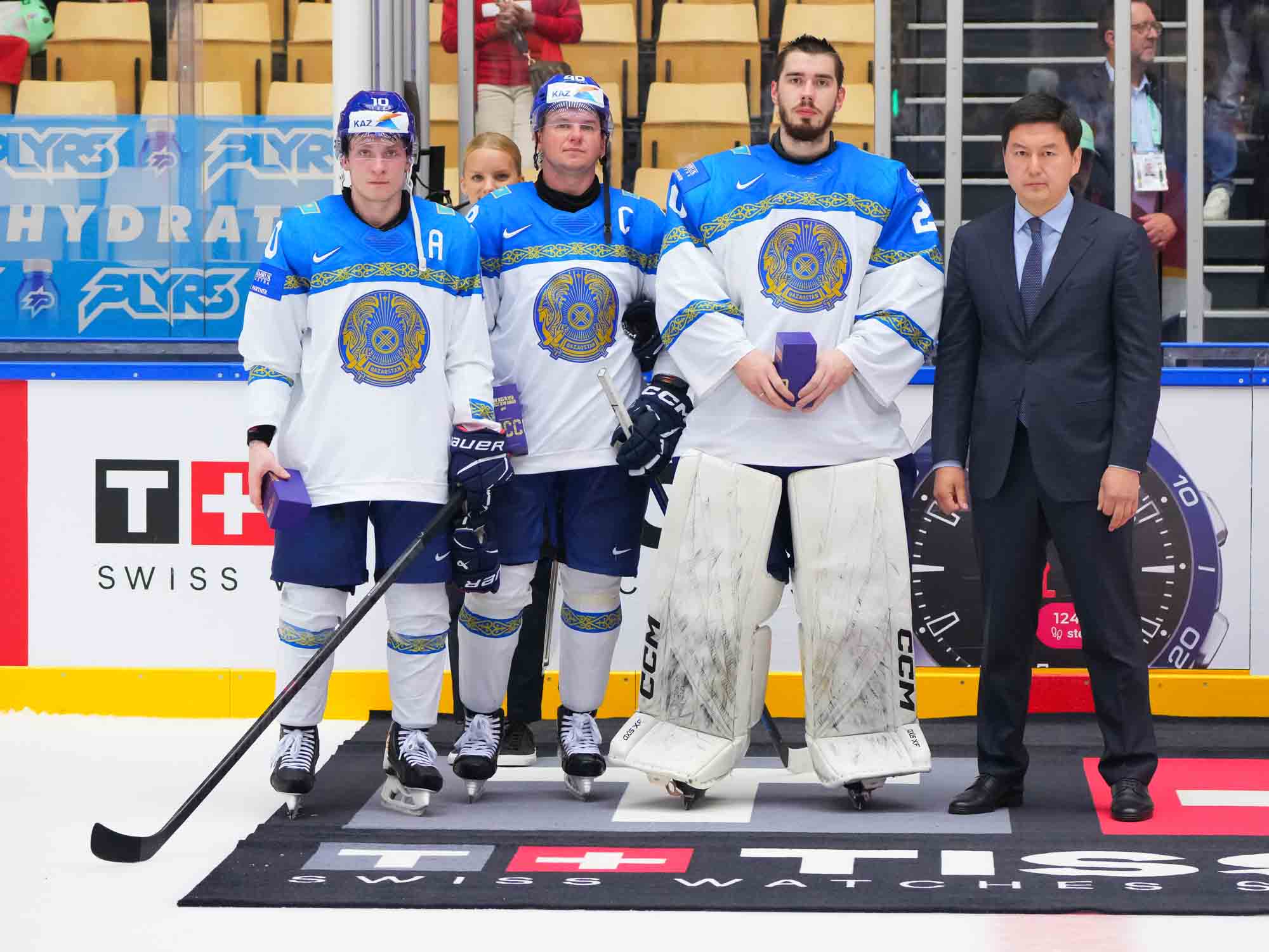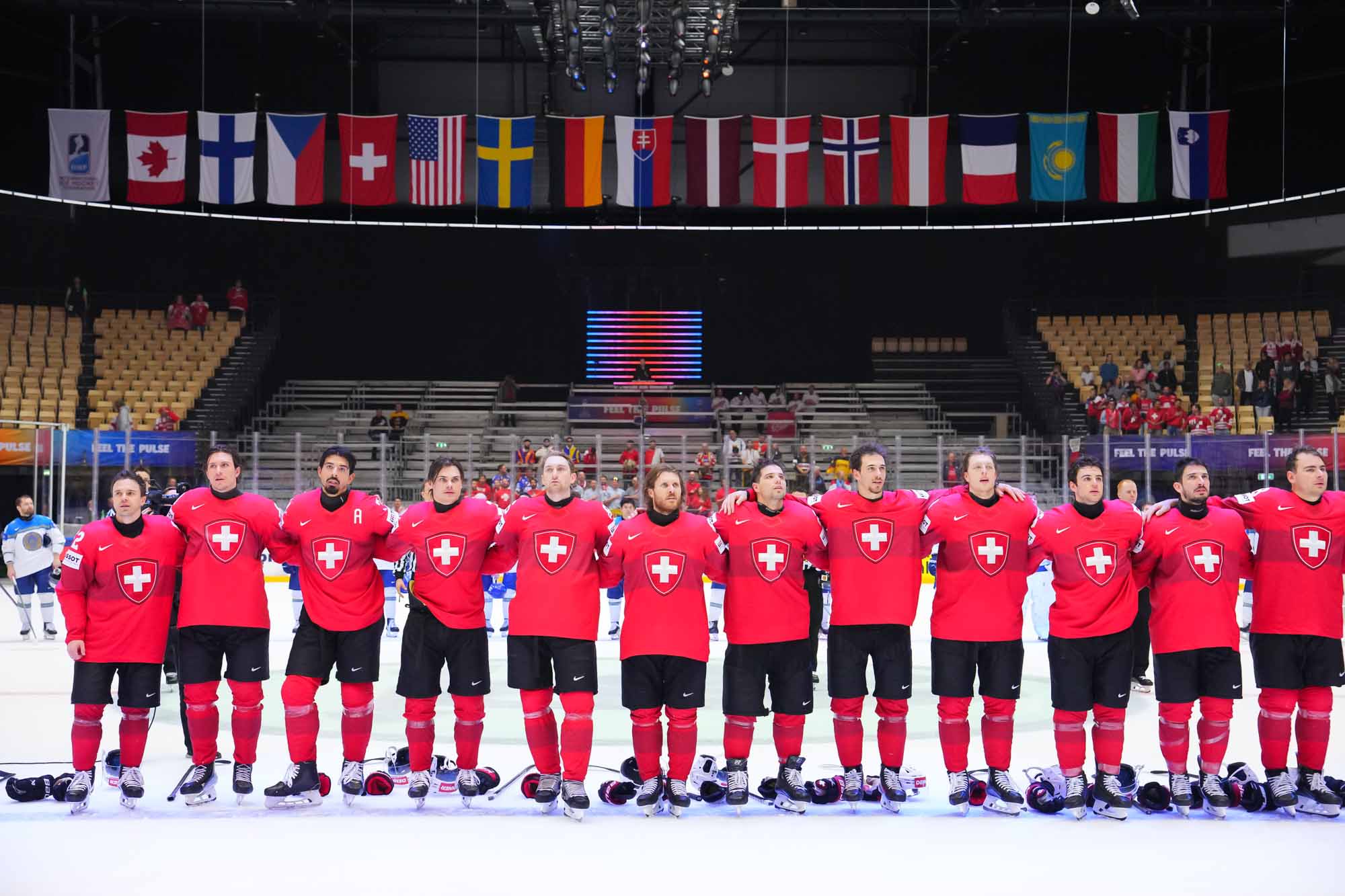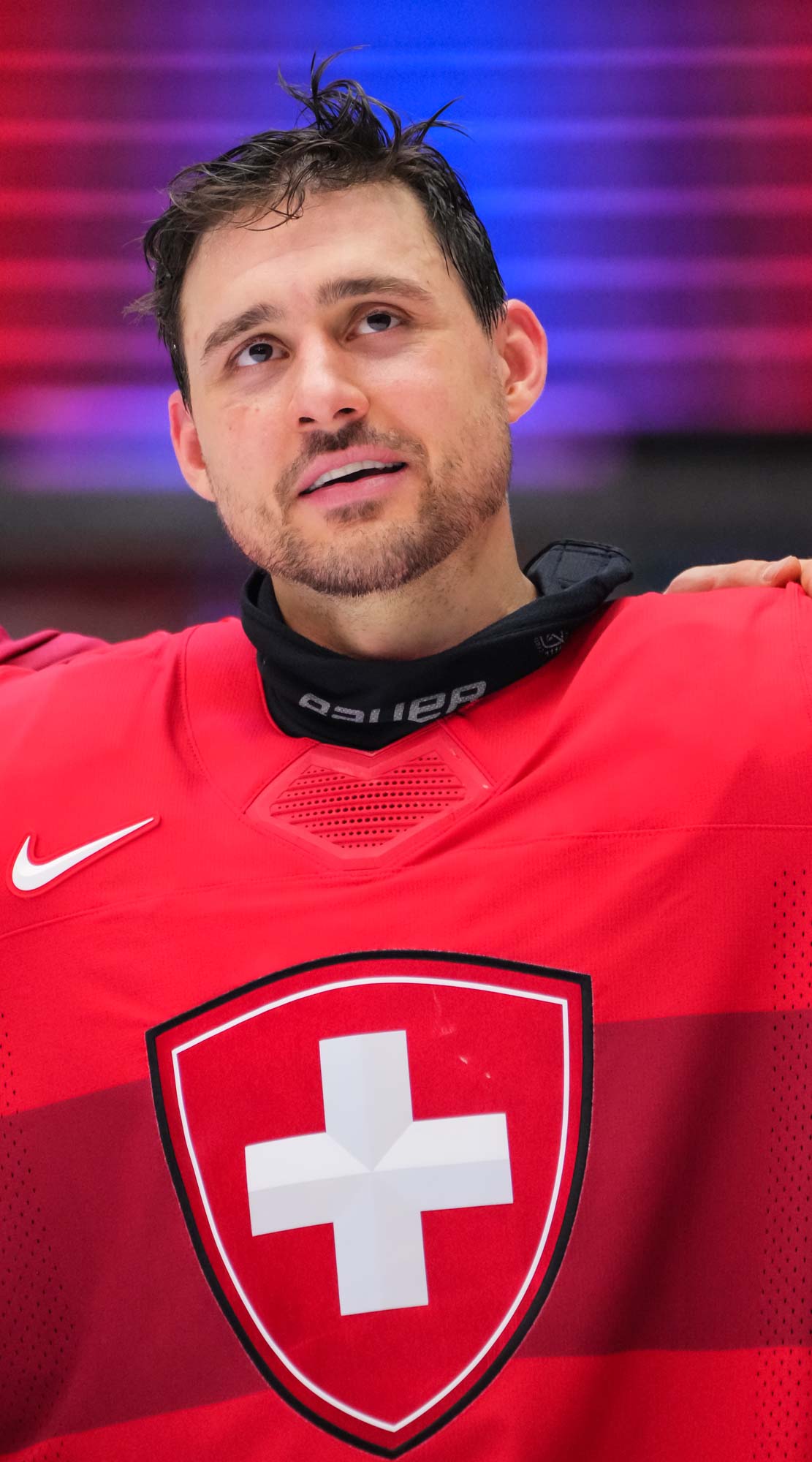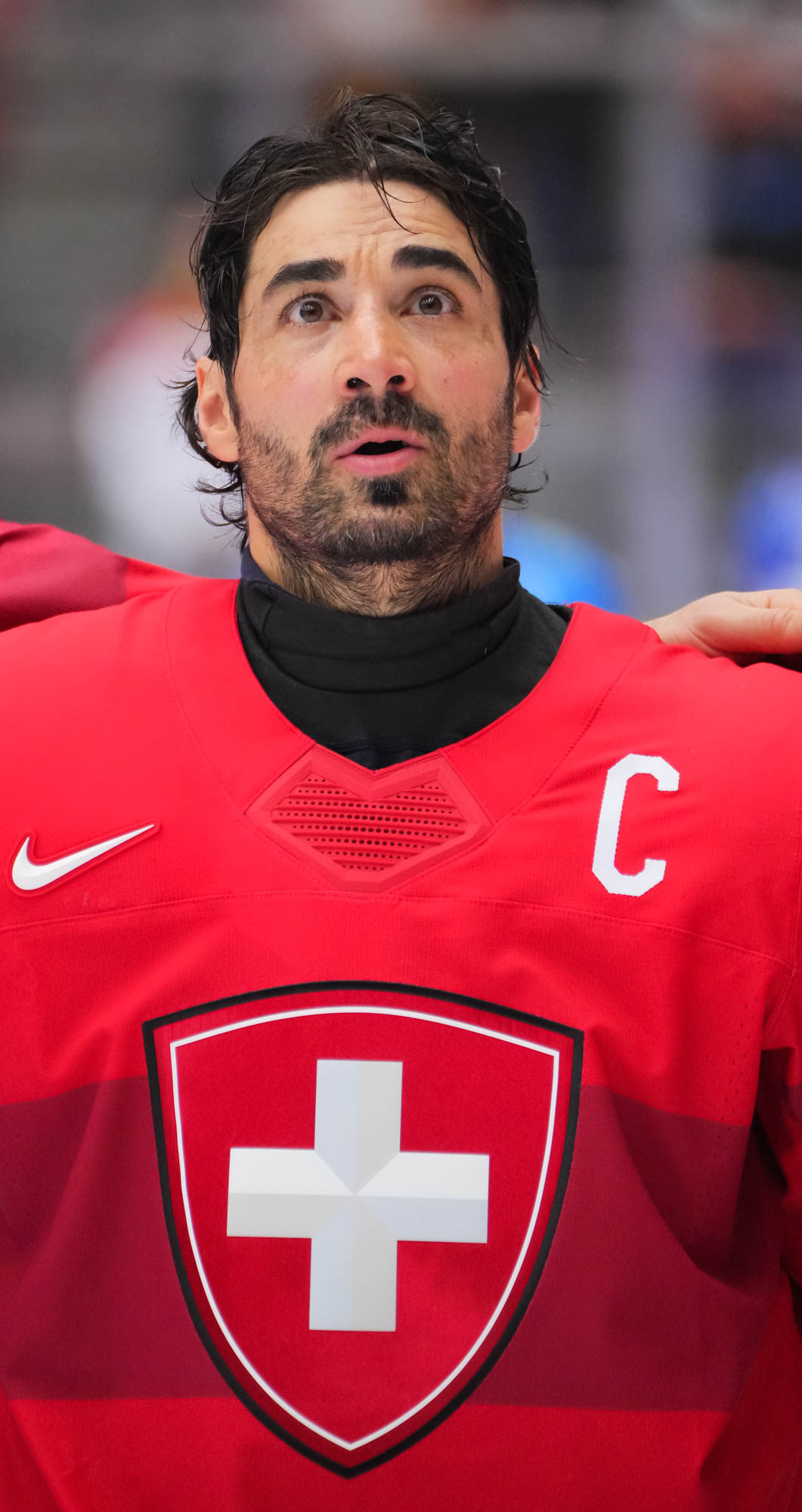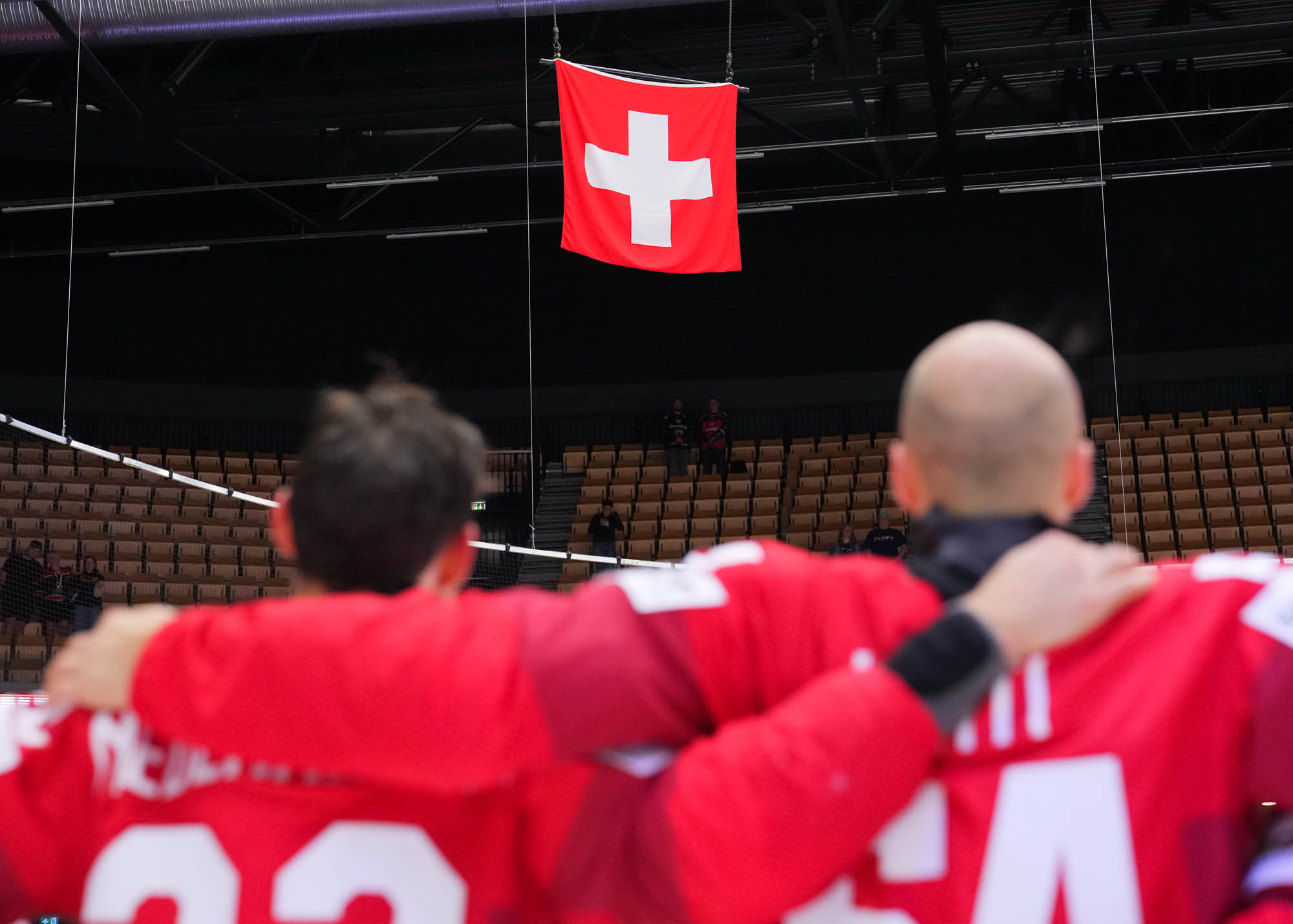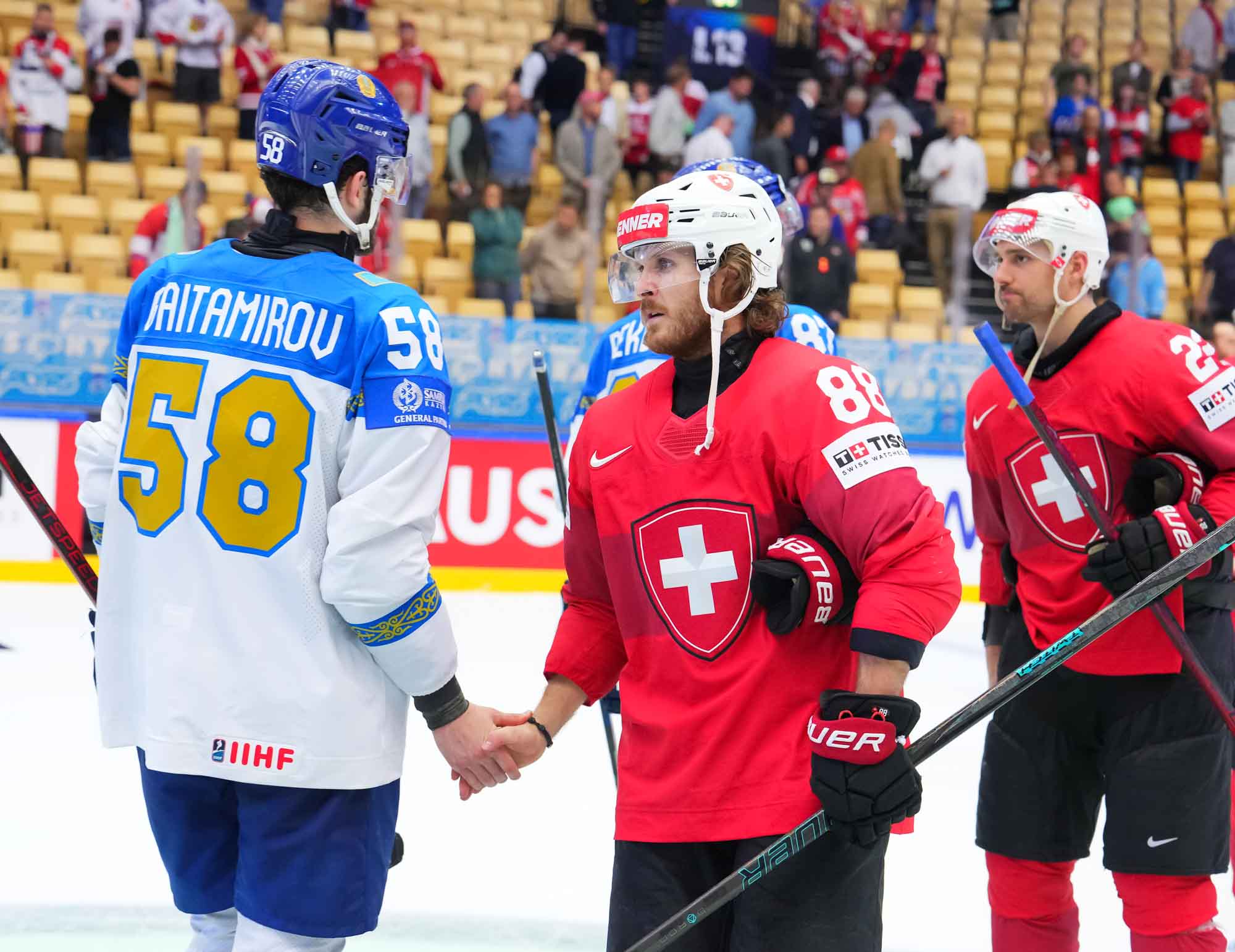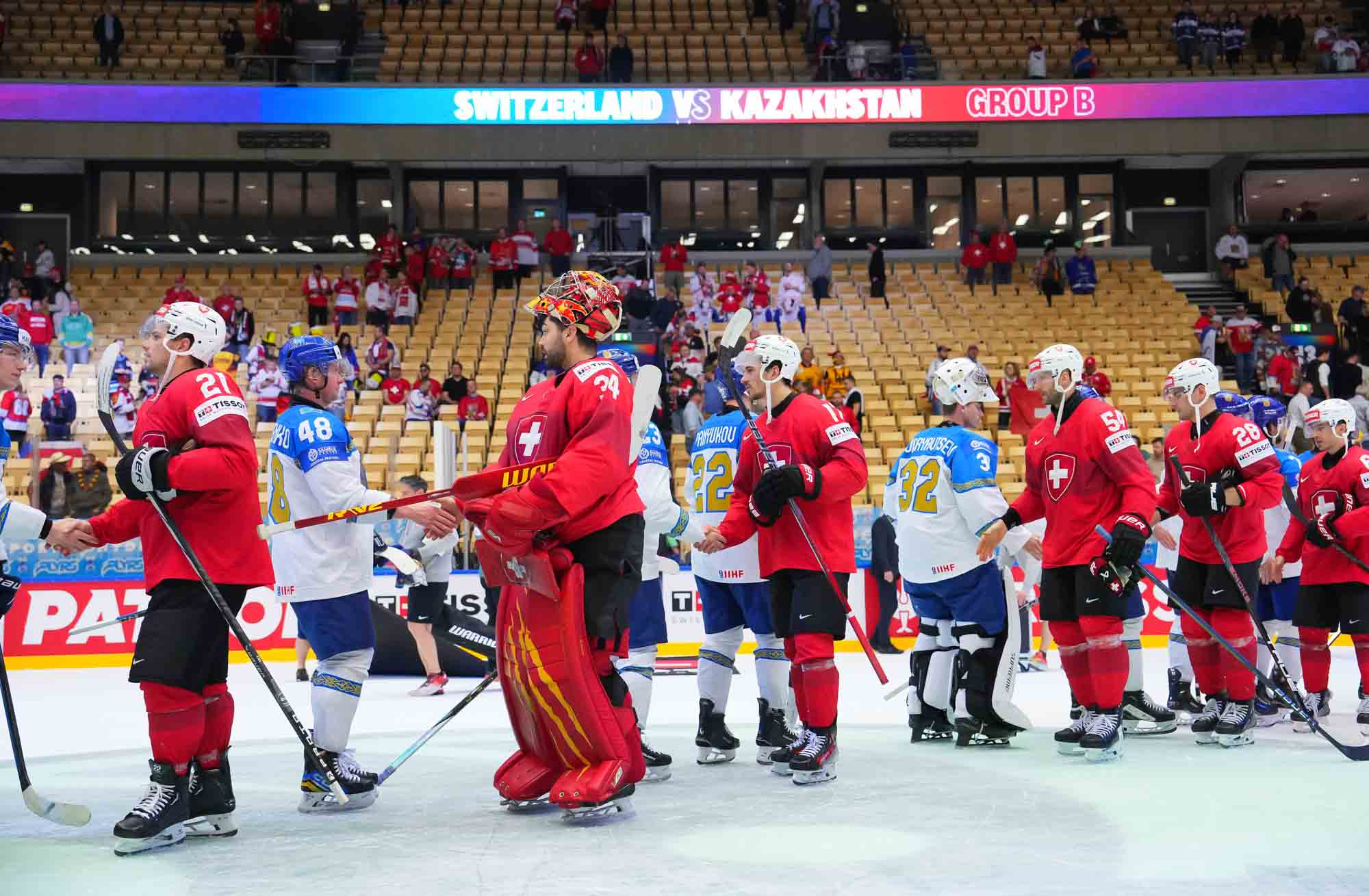Kazakh goaltender Maxim Pavlenko makes another big save to deny Nino Niederreiter before Switzerland claimed victory at the 2025 IIHF Ice Hockey World Championship in Herning, Denmark.
photo: © INTERNATIONAL ICE HOCKEY FEDERATION / MATT ZAMBONIN
Switzerland’s Sven Andrighetto is the toast of Hungarian hockey. He grabbed the decisive goal as his team overcame a stubborn Kazakhstan performance to secure a 4-1 victory and ensure that Hungary escapes relegation at the 2025 IIHF Ice Hockey World Championship.
A Swiss win in regulation condemned the Kazakhs to the drop, ending a run of five seasons in the top division. But Oleg Bolyakin’s team put up a huge fight in a game few expected to be competitive.
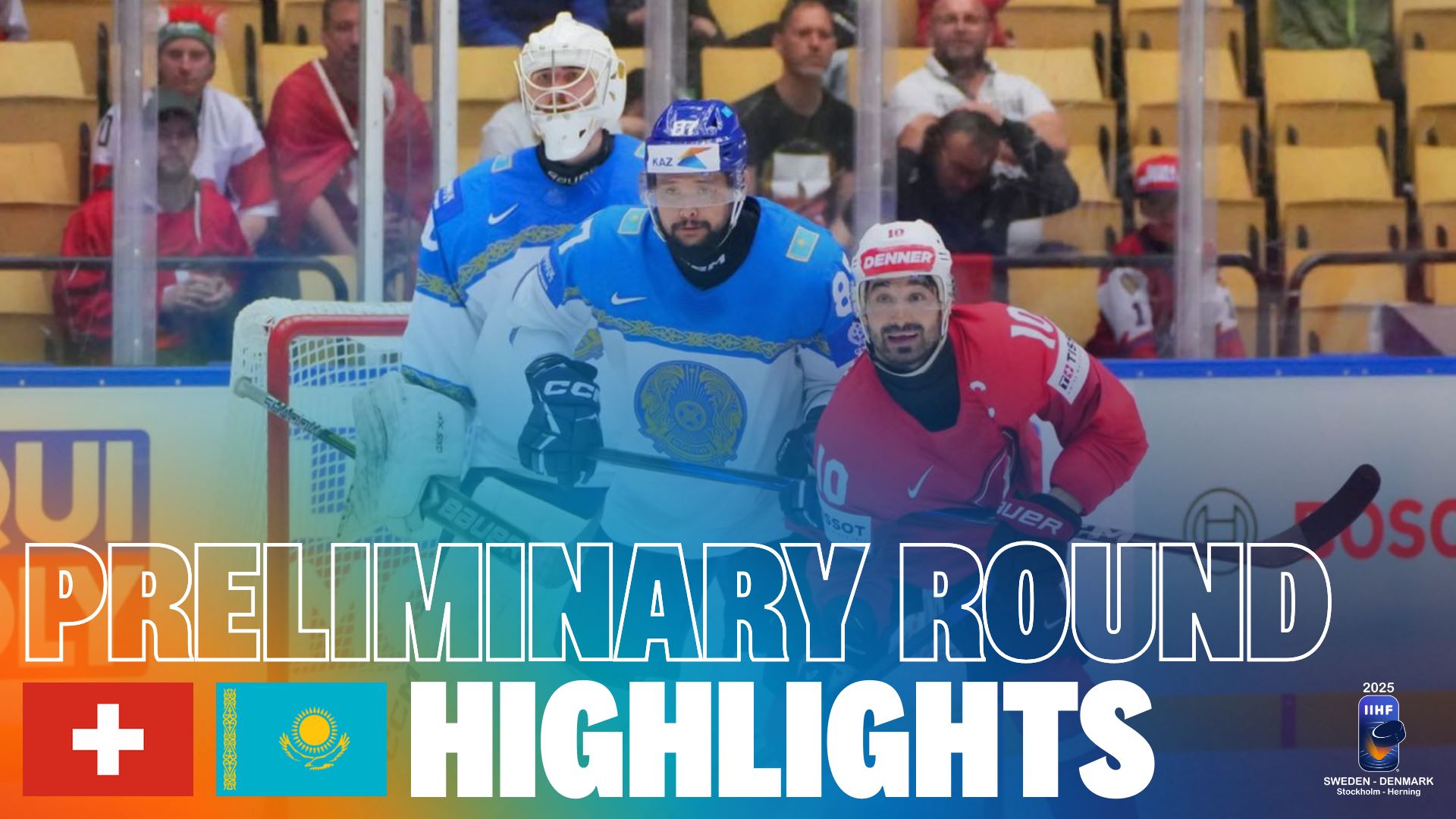
“It was not easy,” said Swiss forward Denis Malgin, who finished with two assists. “Actually, in the beginning, they played really well. I think they made our life hard. But at the end, we won. We scored nice goals, and it’s good to win.”
Kazakhstan led until late in the middle frame, and Switzerland did not get its first lead until 48:15. Andrighetto potted the all-important goal – his seventh in this year’s competition – on the third Swiss power play of the night. Not for the first time, his partnership with Denis Malgin unpicked a defence: a cross-ice feed saw Andrighetto climb out of the corner to stuff the puck past Maxim Pavlenko at the near post. Malgin moves to a tournament-leading nine assists.
The goal changed the picture at both ends of Group B. Switzerland climbed to first place, meaning Czechia has to finish with a win over the USA to clinch top spot ahead of the quarter-finals. Its opponent, which needed at least a point to stay up, dropped back to eighth, facing relegation due to its head-to-head loss against Hungary. The Hungarians survive in the top division for the first time in history; its previous multi-year run at this level came in the 1930s before relegation existed.
Kazakh defender Dmitriy Breus reflected on some fine margins at the end of a rough campaign for his team.
“It’s always so hard to lose these kinds of games when you battle all the game and let in an easy [power play goal] with four seconds left in the second period,” he said. “We shouldn’t have let in that goal. It is what it is. I guess we’re not meant to play in this division right now. Hopefully maybe that changes in the future.
“It doesn’t matter that we led for so long. We lost. After allowing one goal, we always break down.”
Kazakhstan was without leading defender Dmitriy Orekhov, who finally succumbed to the injury he picked up in the pre-tournament camp. And it had to face a Swiss team that had blasted Hungary 10-0 while resting key players and today added Nino Niederreiter to its formidable offence.
But the Kazakhs made an enterprising start. Structured on defence, and willing to shoot at any opportunity, the underdog showed its teeth in the early stages. There weren’t many scoring chances, but the mere fact that it took the Swiss almost 10 minutes to test Maxim Pavlenko told its own story.
Then, in the 16th minute, vague hopes coalesced into something tangible: Adil Beketayev’s long-range effort came back off Stephane Charlin’s pads, and Arkadiy Shestakov tucked away the rebound. It was the first time Switzerland had allowed the opening goal at this year's tournament. The great escape was on.
Immediately after that, Pavlenko pulled off the first of many huge saves, reaching back and slamming down his stick as Niederreiter looked to steer home the rebound from a wild Tim Berni shot.
“I think we were a little bit flat,” admitted Christoph Bertschy. “They absolutely needed a point, so we knew they were going to come hard, and we didn’t meet that energy level. But I think from the second period on, we dictated and took over the game. So at the end, it’s still a victory we earned.”
For a time, the Kazakh dream refused to die. The second period brought almost complete Swiss dominance and inspired a goaltending masterclass from Pavlenko. Right away, Breus went to the box and the power play saw Malgin and Timo Meier go close to tying the scores. There were more big saves to deny Fiala and Simon Knak, then Damien Riat clipped the crossbar.
Kazakhstan was almost invisible at the other end, but still carved out one chance to extend its lead. Kirill Savitsky tested Charlin, and Kirill Panyukov almost potted the rebound three minutes before the intermission.
It was starting to look like the Kazakhs would hold its lead to the second intermission, but late in the frame another Swiss power play finally made the breakthrough. With just four seconds left on the clock, Malgin drilled the puck to the back door where Fiala’s skate redirected it off post and goalie into the net. It wasn’t the prettiest, and Kazakhstan questioned whether it was kicked in, but it turned the game around.
“I thought somebody's gonna be back door, probably, so I just shot it there” Malgin said.
Even at 1-1, a point was enough to keep Kazakhstan among the elite. Early in the third, a power play saw Roman Starchenko fizz in a shot that clipped the outside of the post. But it wasn’t long before the Swiss resumed its siege of Pavlenko.
Andrighetto grabbed his power play goal to make it 2-1 in the 48th minute, and Kazakhstan had to find a way to tie the game and stay alive. Maxim Mukhametov immediately forced Charlin into a save, but it proved to be a rare flicker of aggression as Switzerland closed out the closing stages. Pavlenko had another huge save to prevent Siegenthaler from applying the coup-de-grace but he was powerless to prevent Ambuhl from making it 3-1. Then Riat produced a highlight-reel effort, dragging the puck between his own legs and flicking a backhand shot home to end Kazakhstan’s hopes.
Both late goalscorers were popular with their team-mates. “It seems like the longer he plays, the better he gets!” said Bertschy of Ambuhl’s fourth in the tournament. “I’m so happy for him. Great to see. It helps us tremendously.”
And Niederreiter was all smiles when asked about Riat’s improvisation. “I asked him how he even thought about it and he said he didn’t think, he just did it!”
A Swiss win in regulation condemned the Kazakhs to the drop, ending a run of five seasons in the top division. But Oleg Bolyakin’s team put up a huge fight in a game few expected to be competitive.

“It was not easy,” said Swiss forward Denis Malgin, who finished with two assists. “Actually, in the beginning, they played really well. I think they made our life hard. But at the end, we won. We scored nice goals, and it’s good to win.”
Kazakhstan led until late in the middle frame, and Switzerland did not get its first lead until 48:15. Andrighetto potted the all-important goal – his seventh in this year’s competition – on the third Swiss power play of the night. Not for the first time, his partnership with Denis Malgin unpicked a defence: a cross-ice feed saw Andrighetto climb out of the corner to stuff the puck past Maxim Pavlenko at the near post. Malgin moves to a tournament-leading nine assists.
The goal changed the picture at both ends of Group B. Switzerland climbed to first place, meaning Czechia has to finish with a win over the USA to clinch top spot ahead of the quarter-finals. Its opponent, which needed at least a point to stay up, dropped back to eighth, facing relegation due to its head-to-head loss against Hungary. The Hungarians survive in the top division for the first time in history; its previous multi-year run at this level came in the 1930s before relegation existed.
Kazakh defender Dmitriy Breus reflected on some fine margins at the end of a rough campaign for his team.
“It’s always so hard to lose these kinds of games when you battle all the game and let in an easy [power play goal] with four seconds left in the second period,” he said. “We shouldn’t have let in that goal. It is what it is. I guess we’re not meant to play in this division right now. Hopefully maybe that changes in the future.
“It doesn’t matter that we led for so long. We lost. After allowing one goal, we always break down.”
Kazakhstan was without leading defender Dmitriy Orekhov, who finally succumbed to the injury he picked up in the pre-tournament camp. And it had to face a Swiss team that had blasted Hungary 10-0 while resting key players and today added Nino Niederreiter to its formidable offence.
But the Kazakhs made an enterprising start. Structured on defence, and willing to shoot at any opportunity, the underdog showed its teeth in the early stages. There weren’t many scoring chances, but the mere fact that it took the Swiss almost 10 minutes to test Maxim Pavlenko told its own story.
Then, in the 16th minute, vague hopes coalesced into something tangible: Adil Beketayev’s long-range effort came back off Stephane Charlin’s pads, and Arkadiy Shestakov tucked away the rebound. It was the first time Switzerland had allowed the opening goal at this year's tournament. The great escape was on.
Immediately after that, Pavlenko pulled off the first of many huge saves, reaching back and slamming down his stick as Niederreiter looked to steer home the rebound from a wild Tim Berni shot.
“I think we were a little bit flat,” admitted Christoph Bertschy. “They absolutely needed a point, so we knew they were going to come hard, and we didn’t meet that energy level. But I think from the second period on, we dictated and took over the game. So at the end, it’s still a victory we earned.”
For a time, the Kazakh dream refused to die. The second period brought almost complete Swiss dominance and inspired a goaltending masterclass from Pavlenko. Right away, Breus went to the box and the power play saw Malgin and Timo Meier go close to tying the scores. There were more big saves to deny Fiala and Simon Knak, then Damien Riat clipped the crossbar.
Kazakhstan was almost invisible at the other end, but still carved out one chance to extend its lead. Kirill Savitsky tested Charlin, and Kirill Panyukov almost potted the rebound three minutes before the intermission.
It was starting to look like the Kazakhs would hold its lead to the second intermission, but late in the frame another Swiss power play finally made the breakthrough. With just four seconds left on the clock, Malgin drilled the puck to the back door where Fiala’s skate redirected it off post and goalie into the net. It wasn’t the prettiest, and Kazakhstan questioned whether it was kicked in, but it turned the game around.
“I thought somebody's gonna be back door, probably, so I just shot it there” Malgin said.
Even at 1-1, a point was enough to keep Kazakhstan among the elite. Early in the third, a power play saw Roman Starchenko fizz in a shot that clipped the outside of the post. But it wasn’t long before the Swiss resumed its siege of Pavlenko.
Andrighetto grabbed his power play goal to make it 2-1 in the 48th minute, and Kazakhstan had to find a way to tie the game and stay alive. Maxim Mukhametov immediately forced Charlin into a save, but it proved to be a rare flicker of aggression as Switzerland closed out the closing stages. Pavlenko had another huge save to prevent Siegenthaler from applying the coup-de-grace but he was powerless to prevent Ambuhl from making it 3-1. Then Riat produced a highlight-reel effort, dragging the puck between his own legs and flicking a backhand shot home to end Kazakhstan’s hopes.
Both late goalscorers were popular with their team-mates. “It seems like the longer he plays, the better he gets!” said Bertschy of Ambuhl’s fourth in the tournament. “I’m so happy for him. Great to see. It helps us tremendously.”
And Niederreiter was all smiles when asked about Riat’s improvisation. “I asked him how he even thought about it and he said he didn’t think, he just did it!”
Switzerland vs Kazakhstan - 2025 IIHF WM
OF


